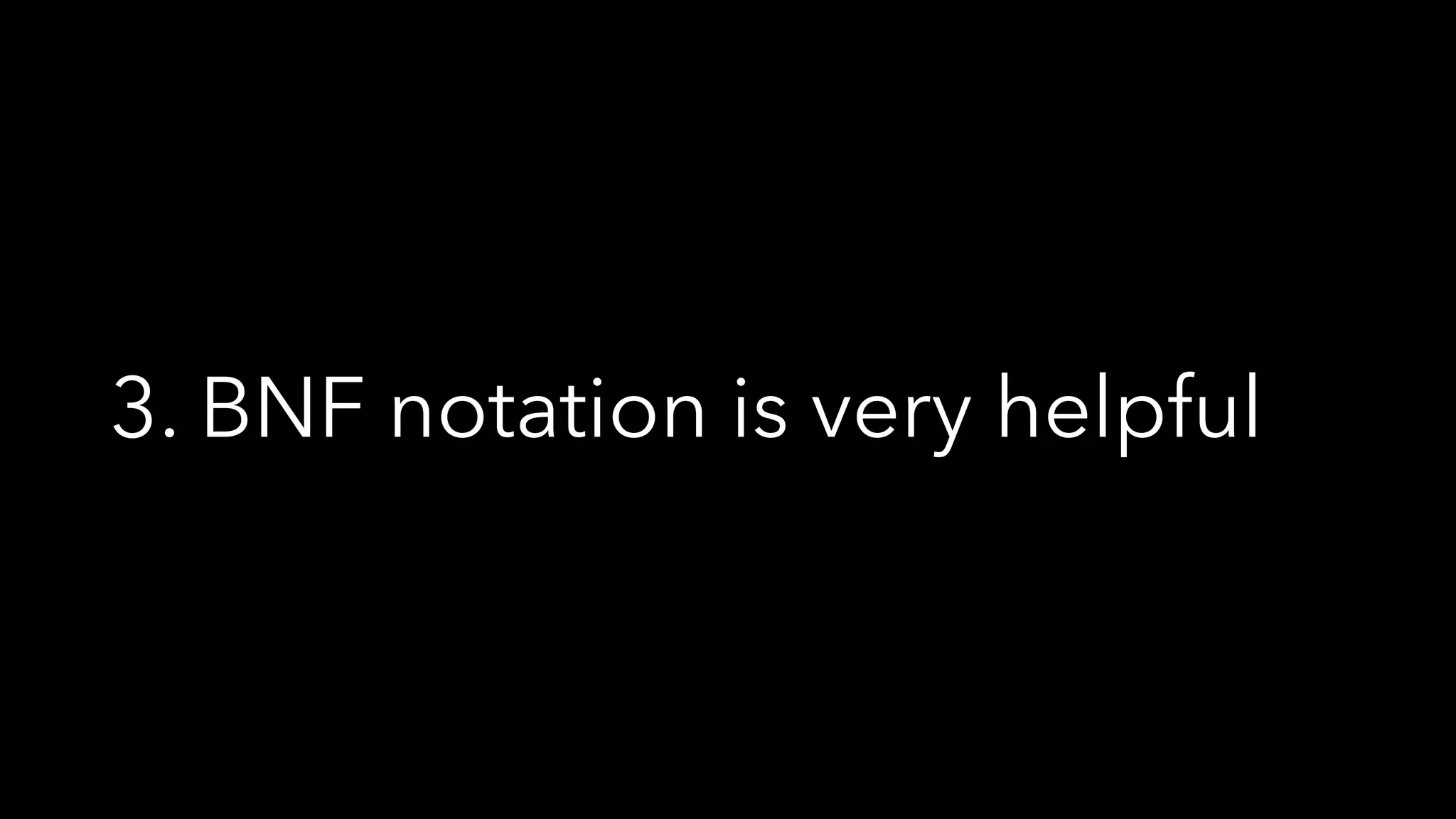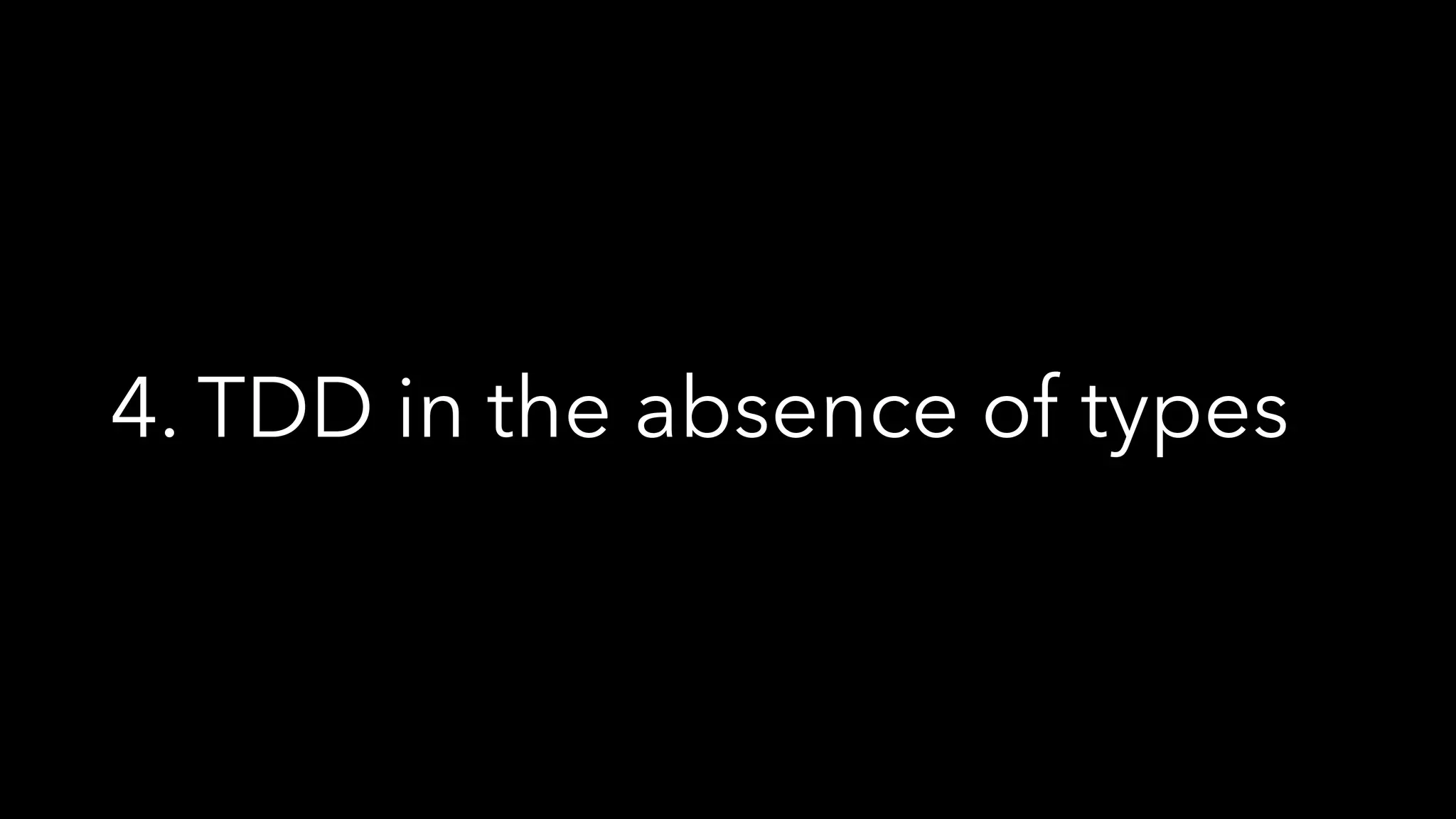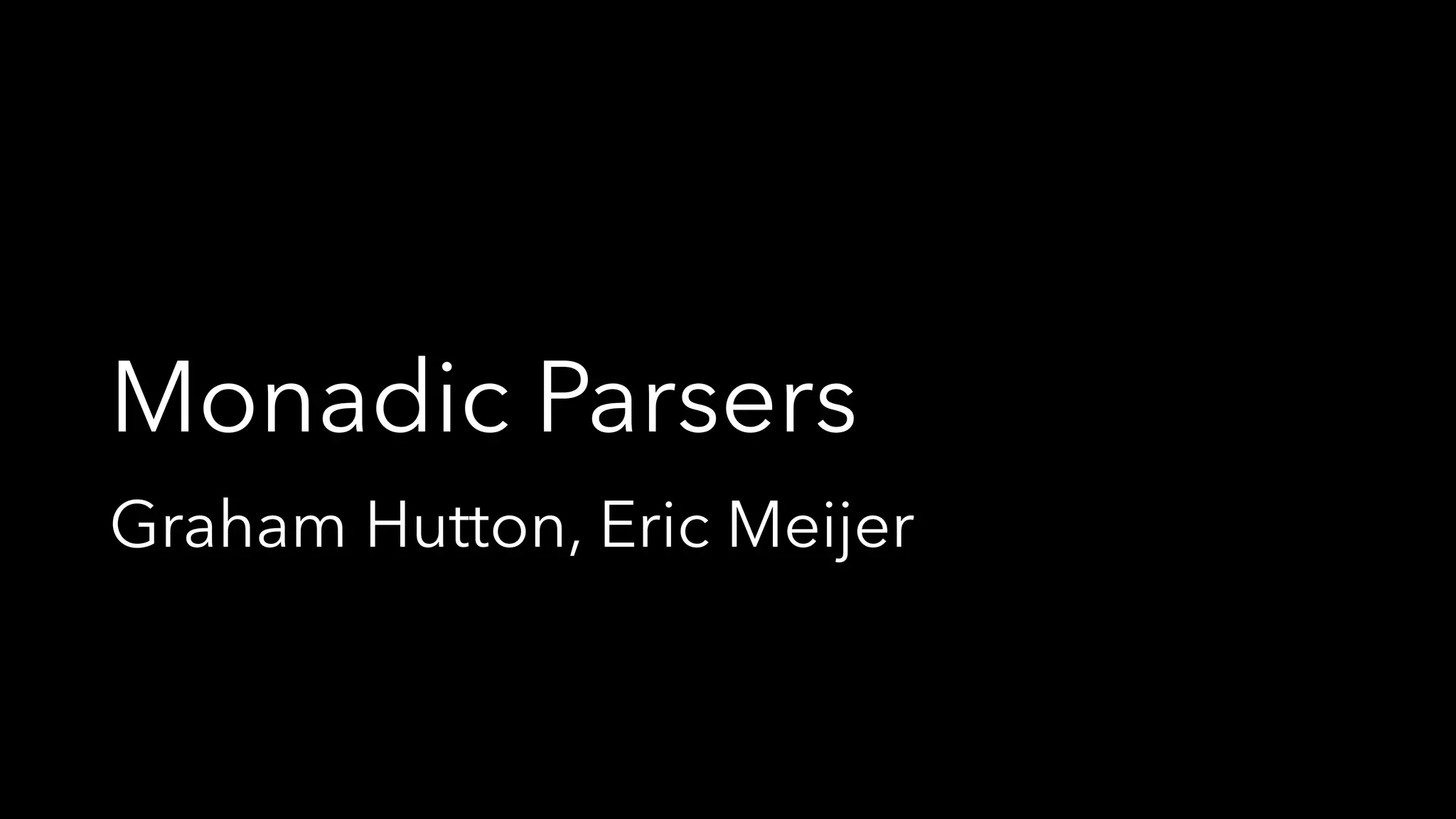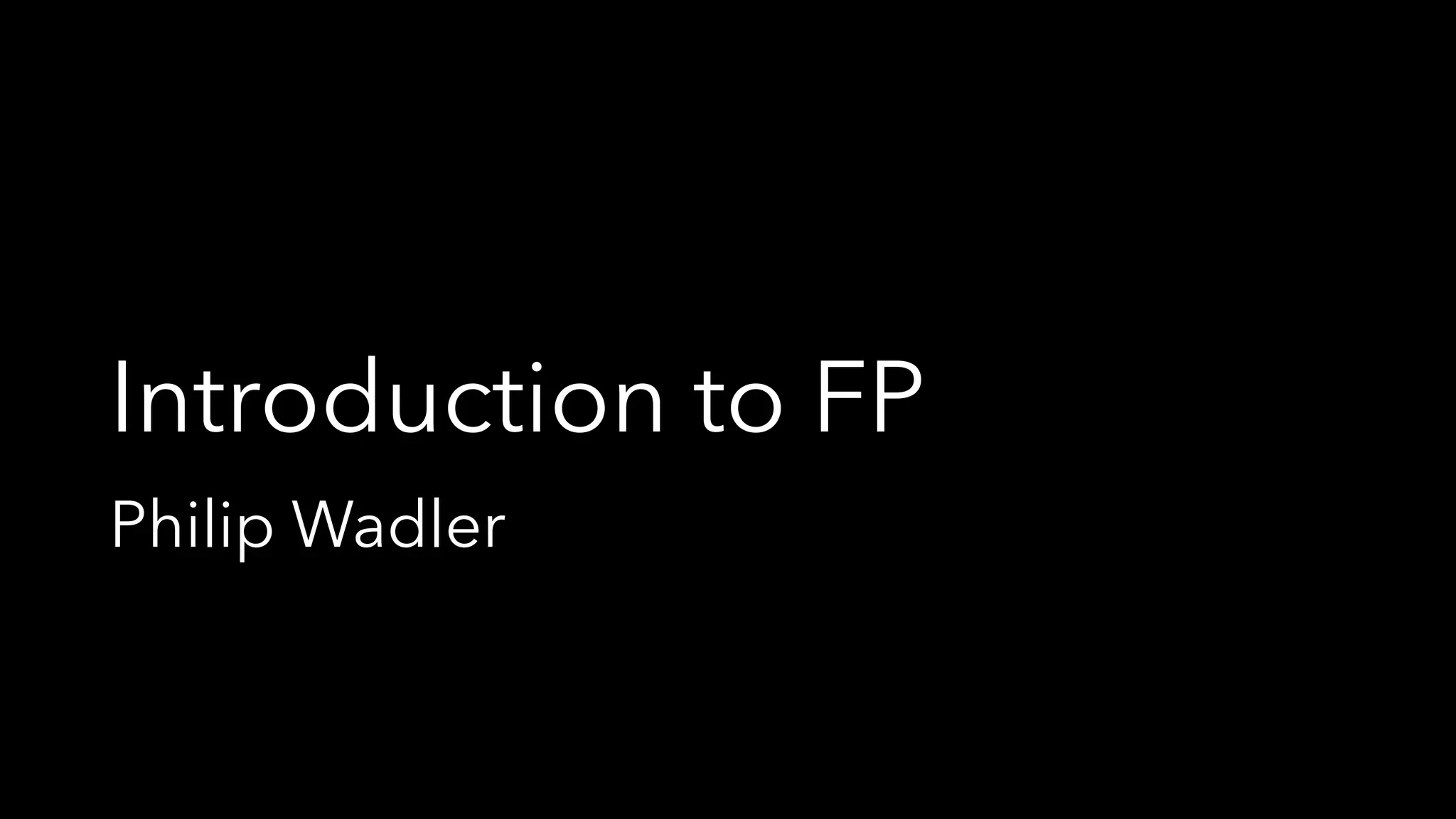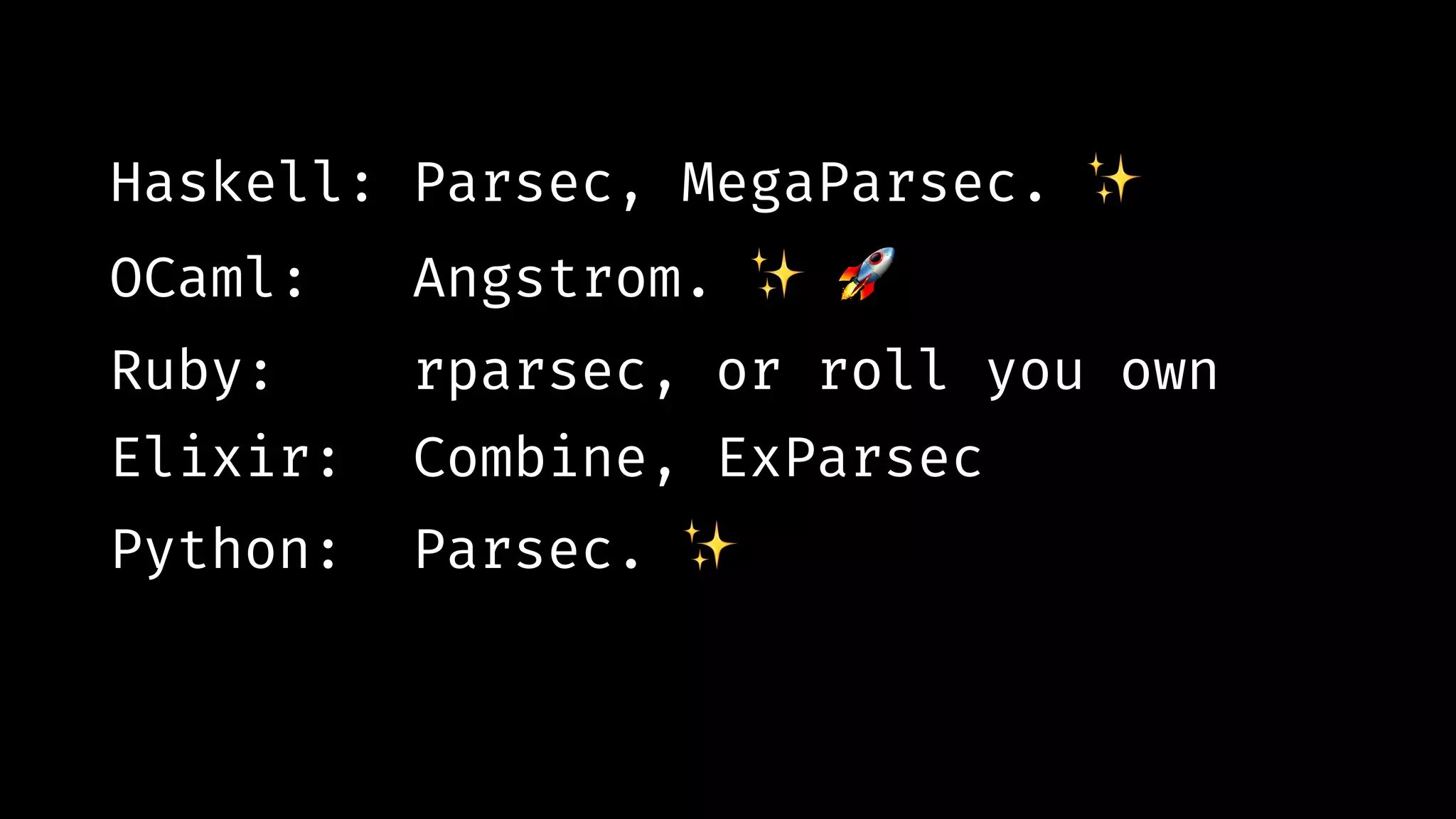The document discusses combinator parsing, highlighting the use of higher-order functions to build parsers incrementally in a functional programming context. It describes essential topics such as whitespace handling, error message improvements, and an 'offside rule' combinator for managing indentation-sensitive syntax. Examples and definitions illustrate the construction of various parsers for expressions, numbers, and keywords, alongside the ability to produce more informative outputs.
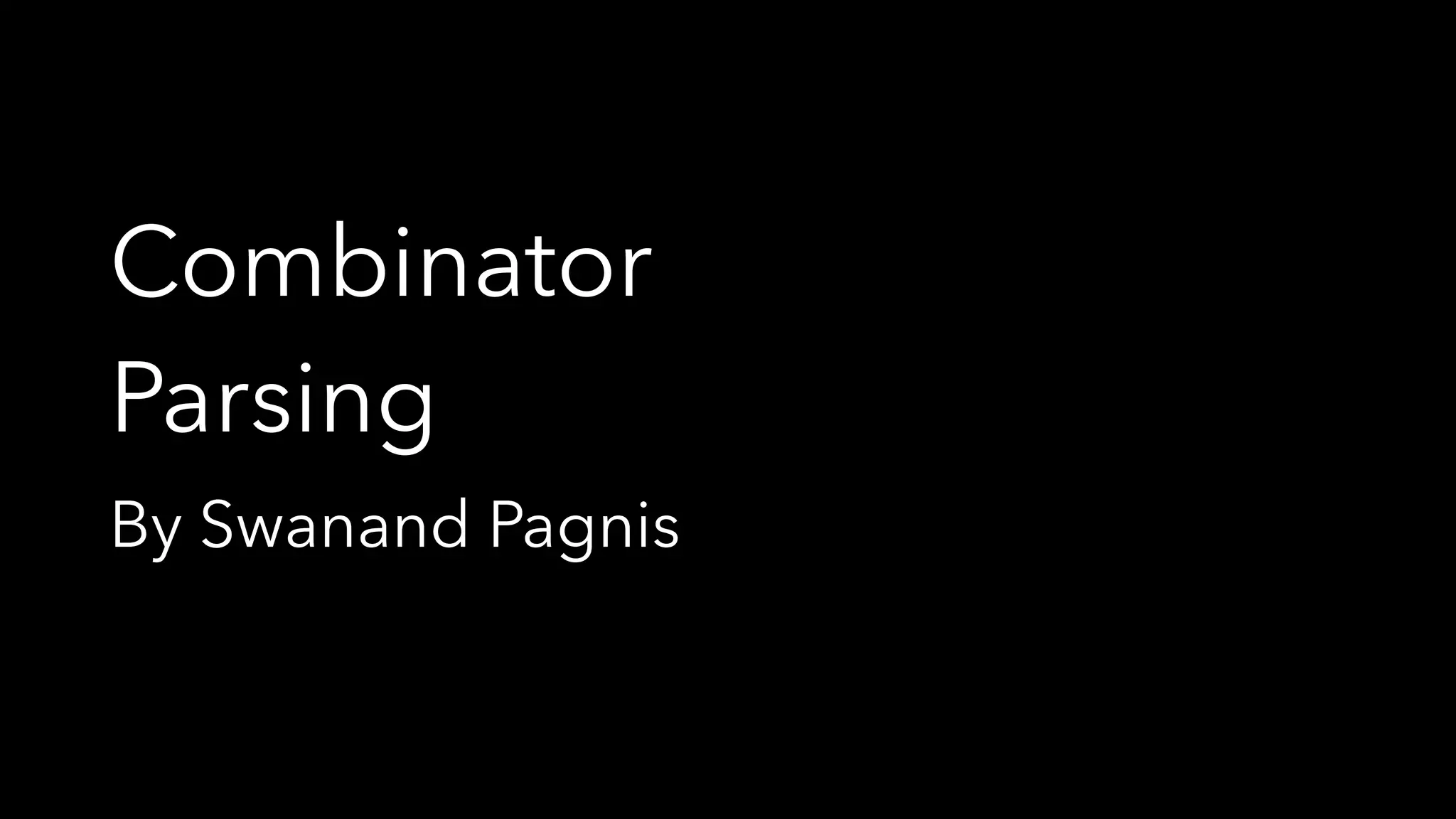
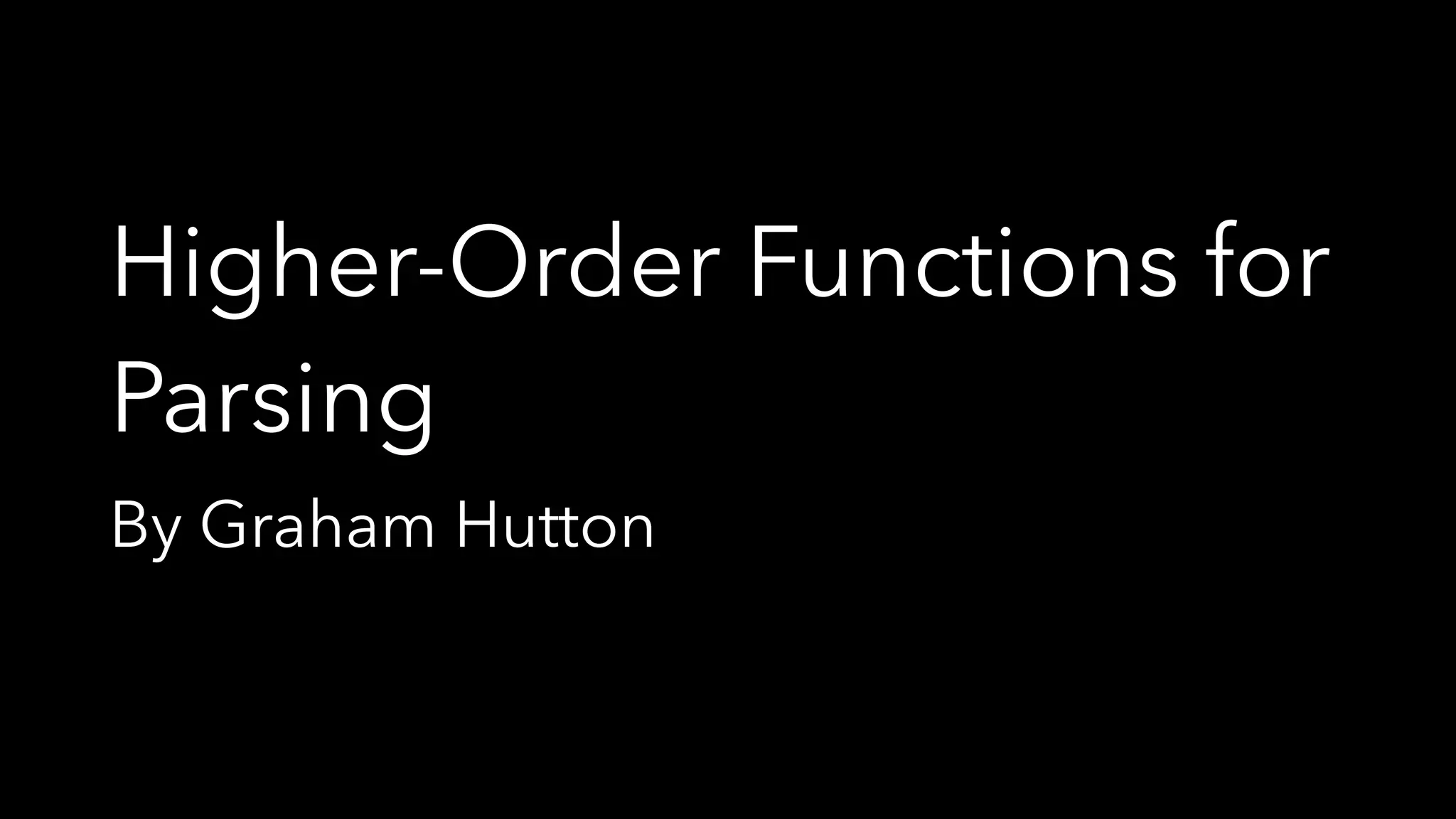
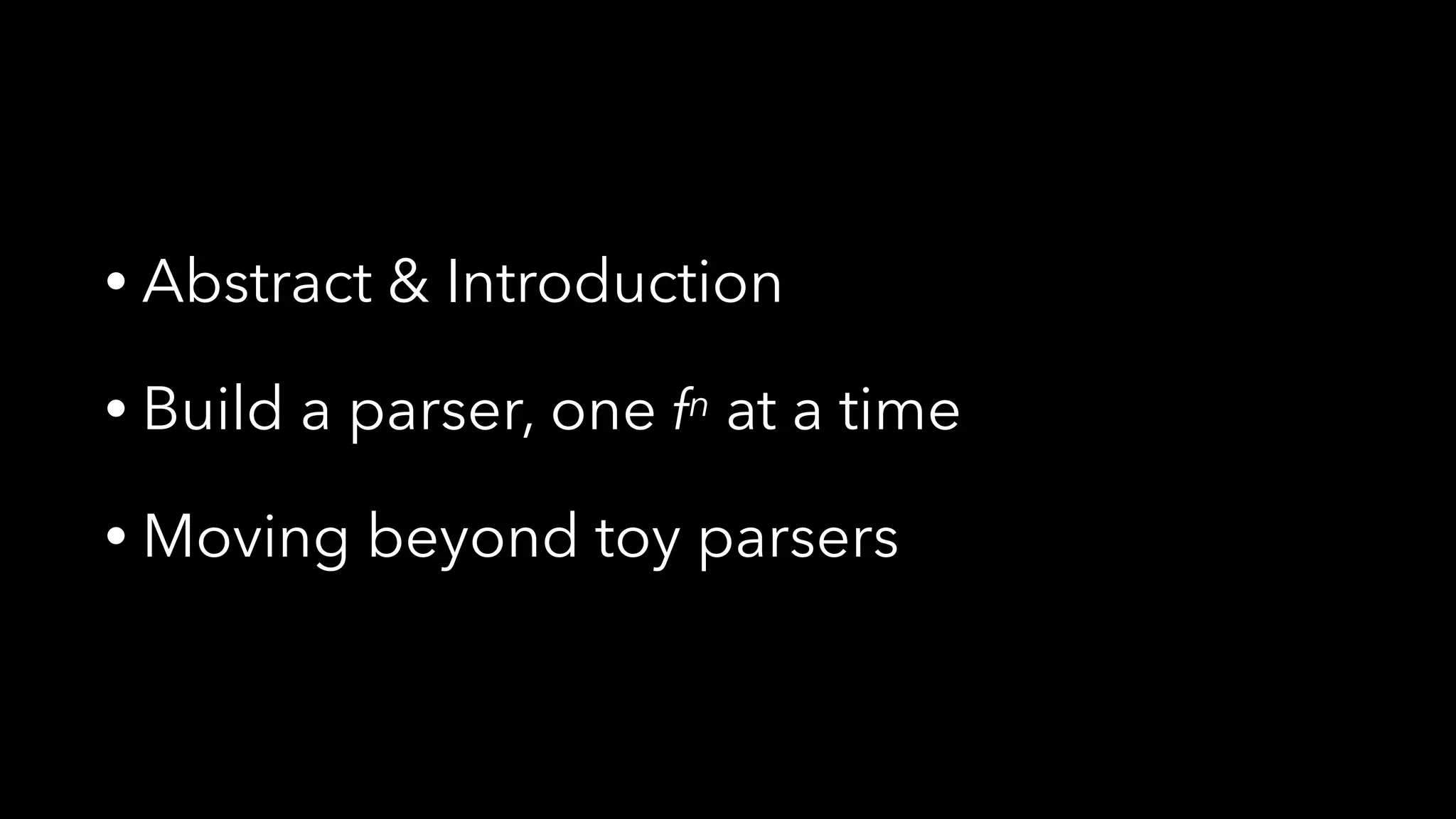

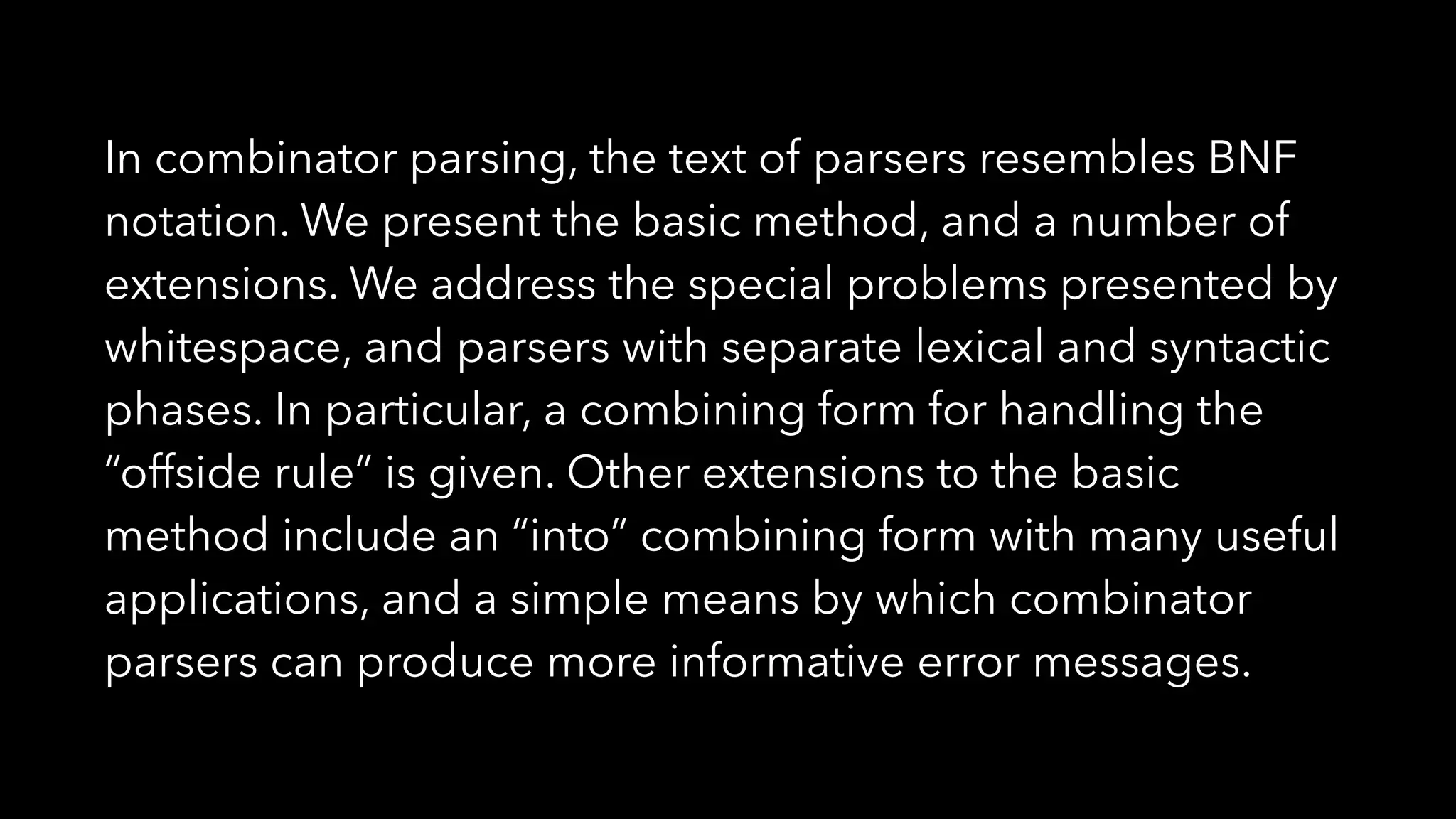
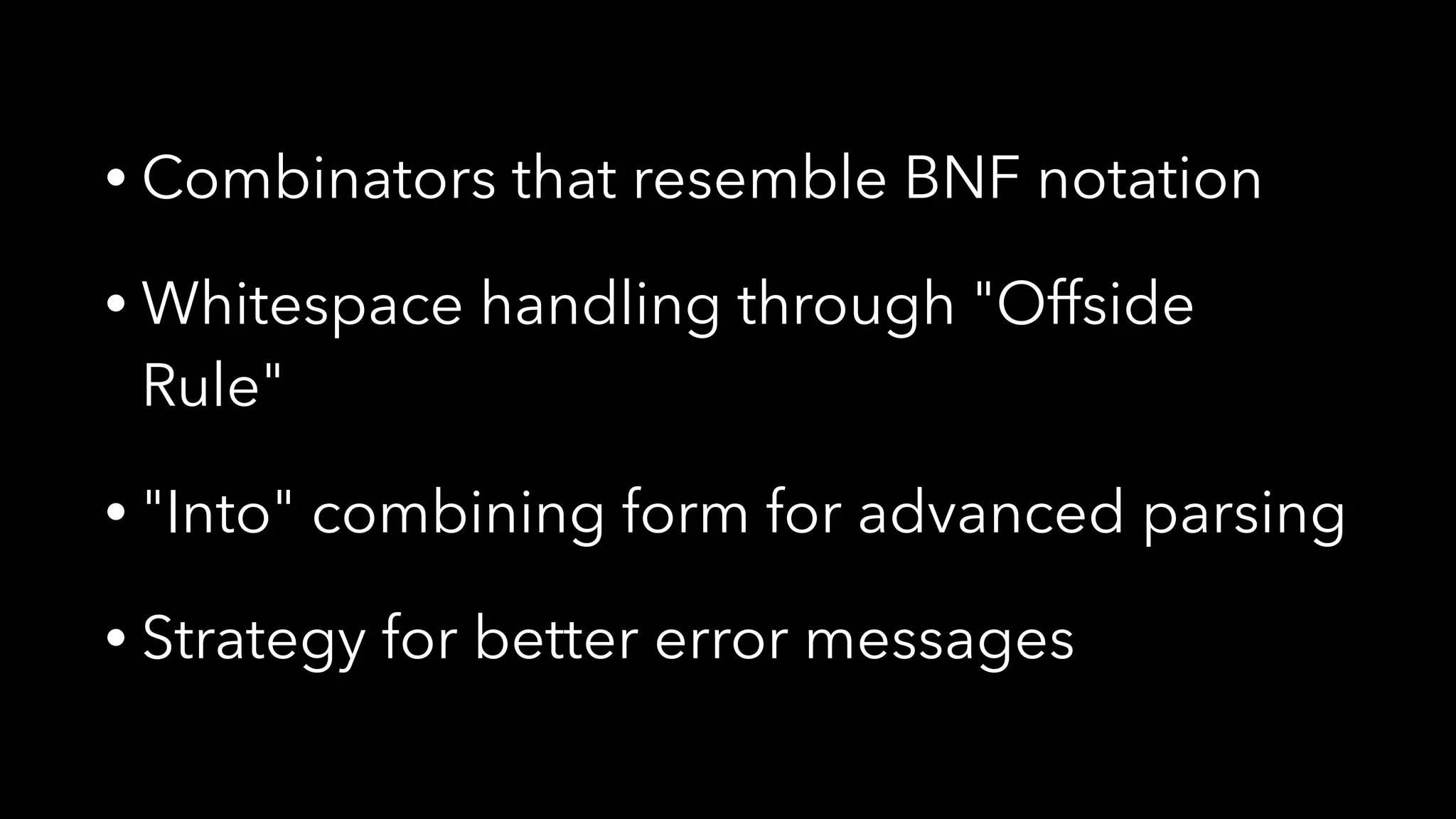

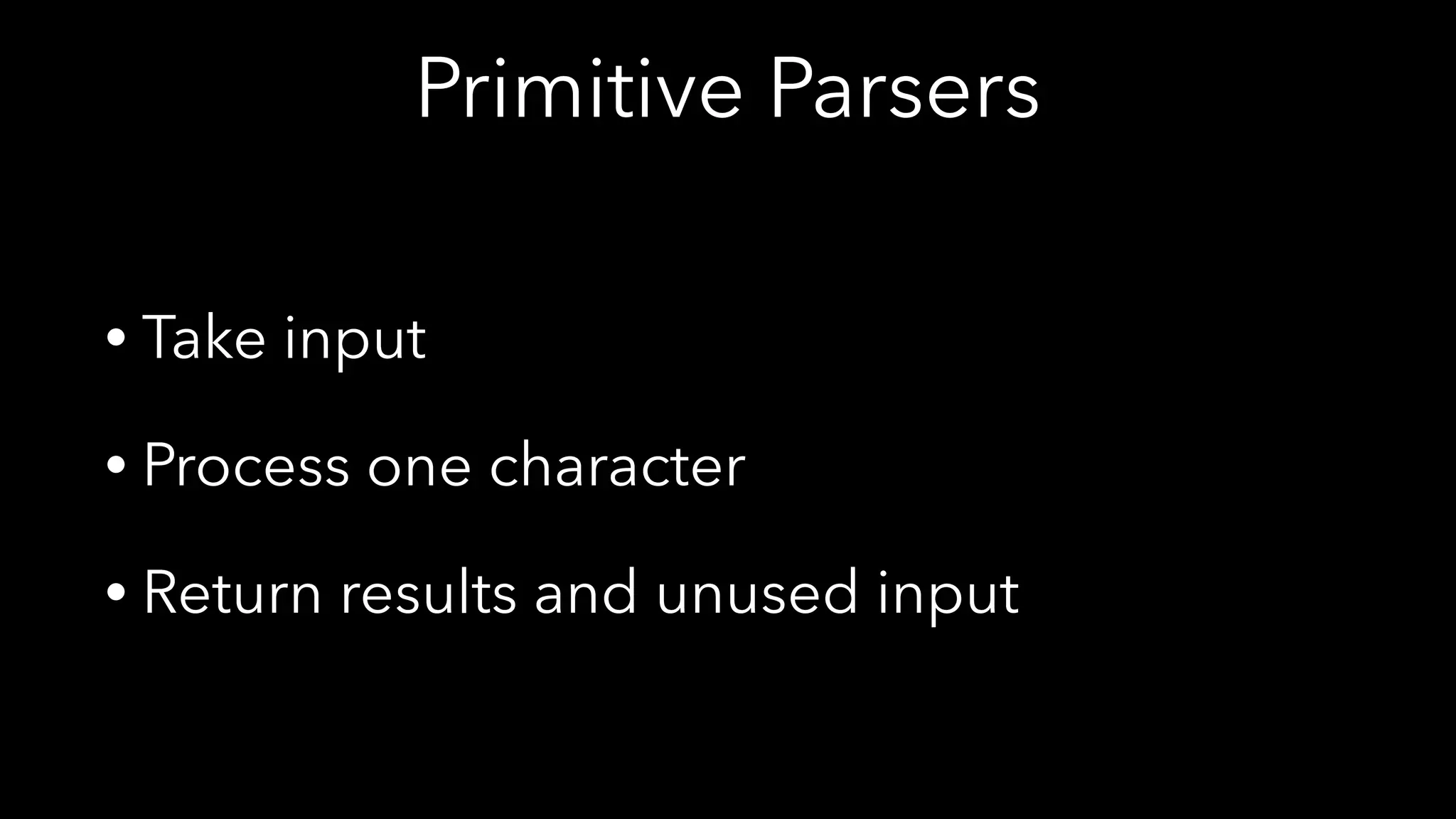
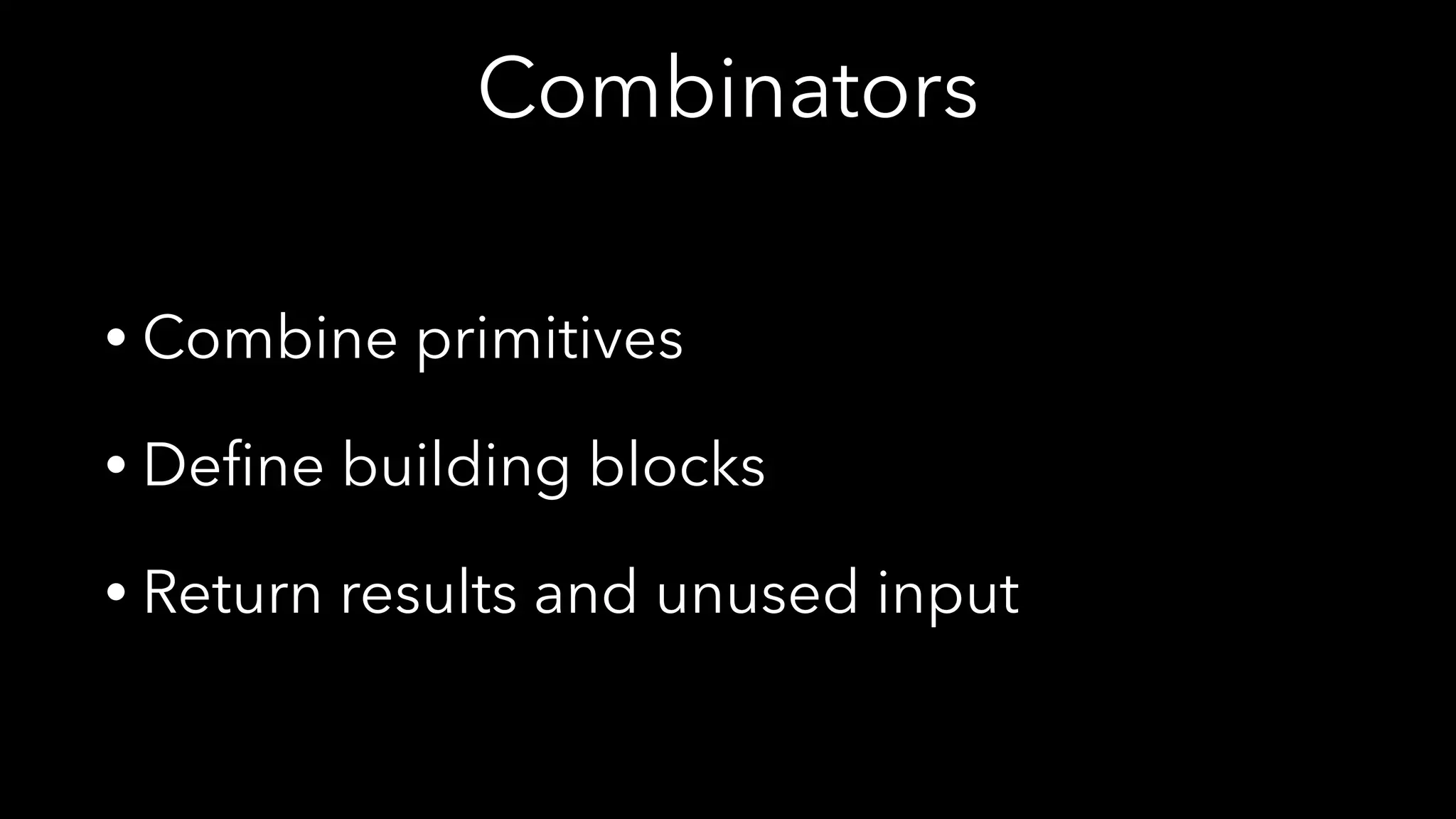
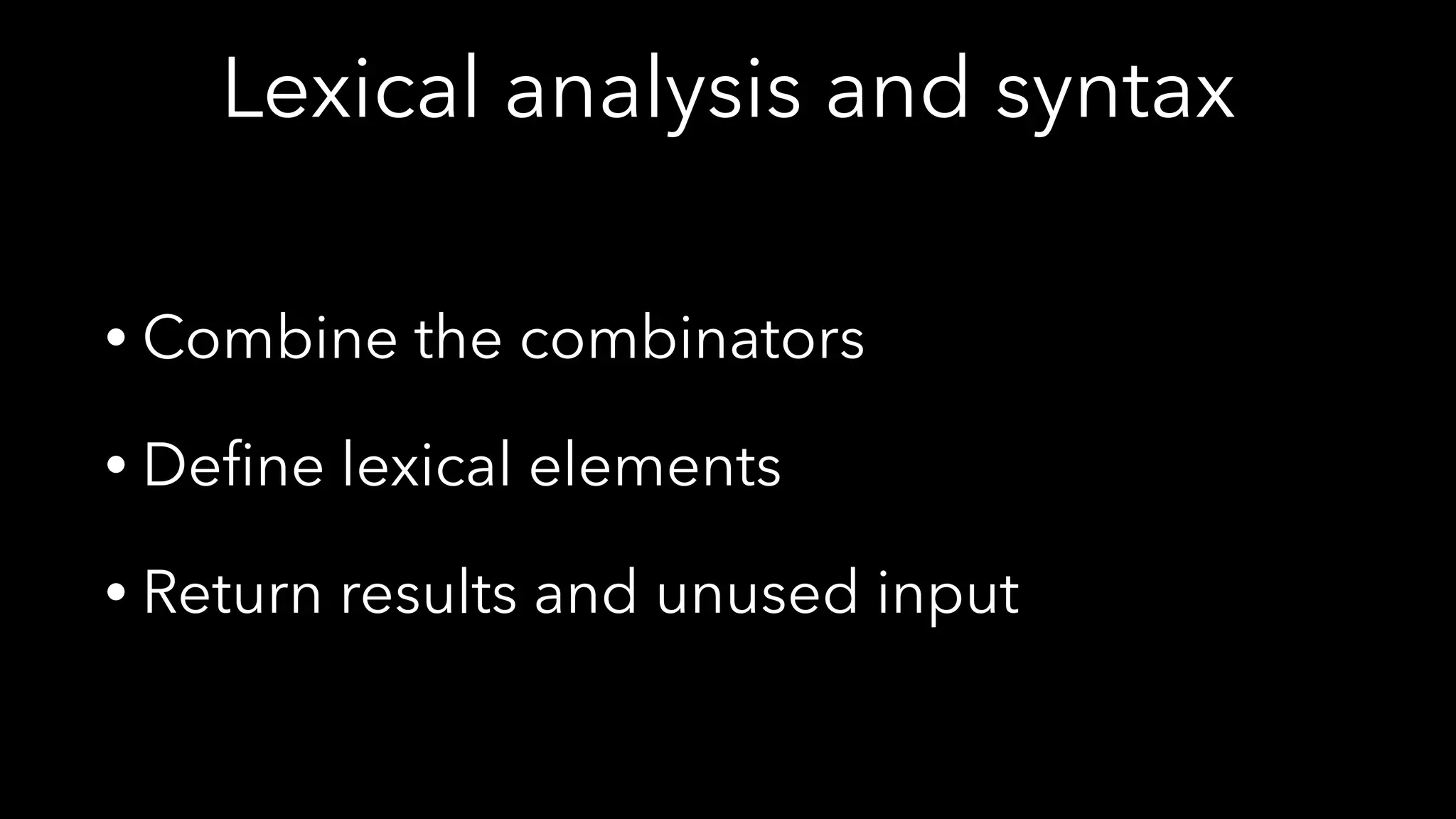
![input: "from:swiggy to:me" output: [("f", "rom:swiggy to:me")]](https://image.slidesharecdn.com/combinatorparsing-180121101339/75/Combinator-parsing-11-2048.jpg)
![input: "42 !=> ans" output: [("4", "2 !=> ans")]](https://image.slidesharecdn.com/combinatorparsing-180121101339/75/Combinator-parsing-12-2048.jpg)
![rule: 'a' followed by 'b' input: "abcdef" output: [(('a','b'),"cdef")]](https://image.slidesharecdn.com/combinatorparsing-180121101339/75/Combinator-parsing-13-2048.jpg)
![rule: 'a' followed by 'b' input: "abcdef" output: [(('a','b'),"cdef")] Combinator](https://image.slidesharecdn.com/combinatorparsing-180121101339/75/Combinator-parsing-14-2048.jpg)

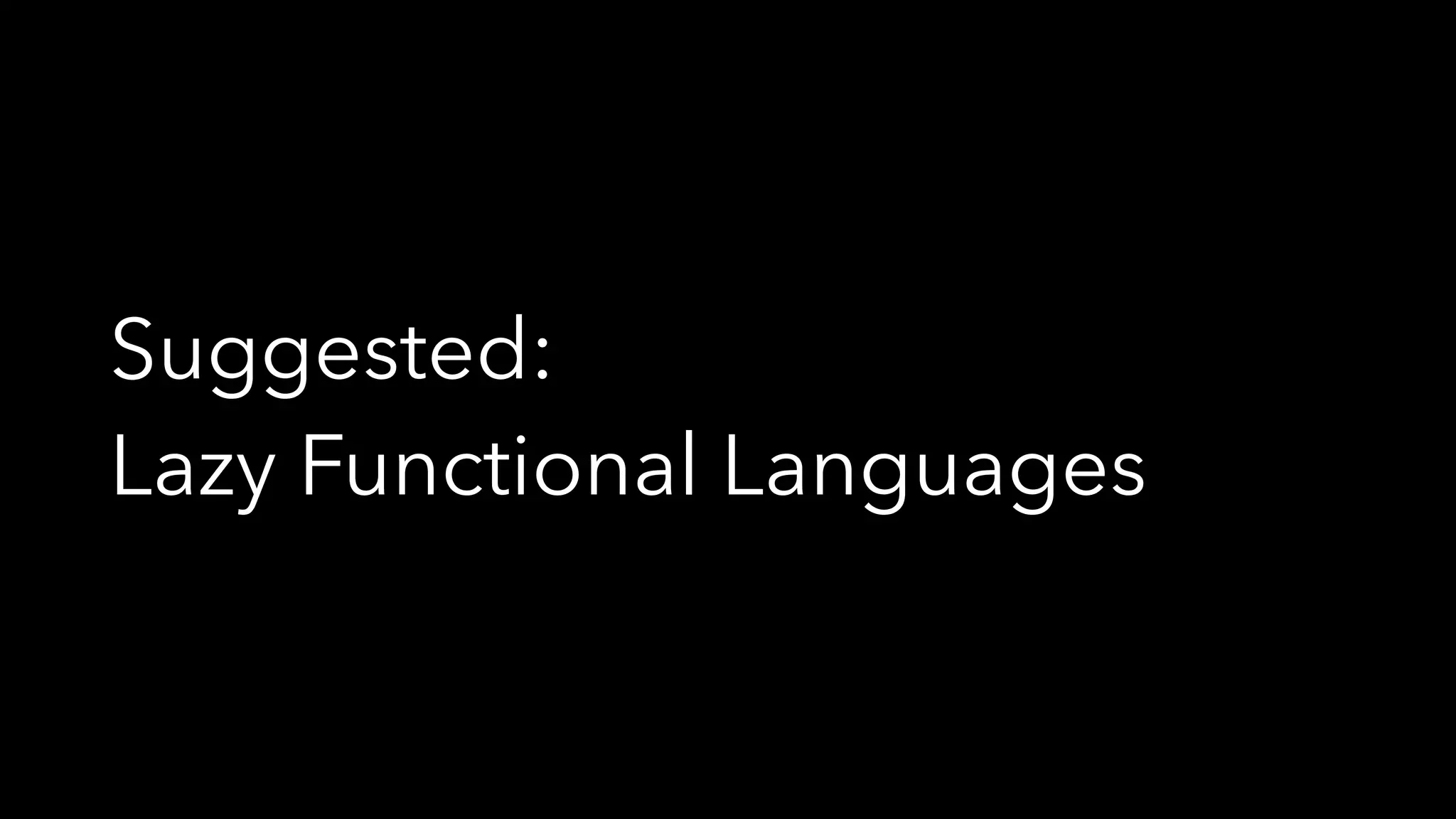




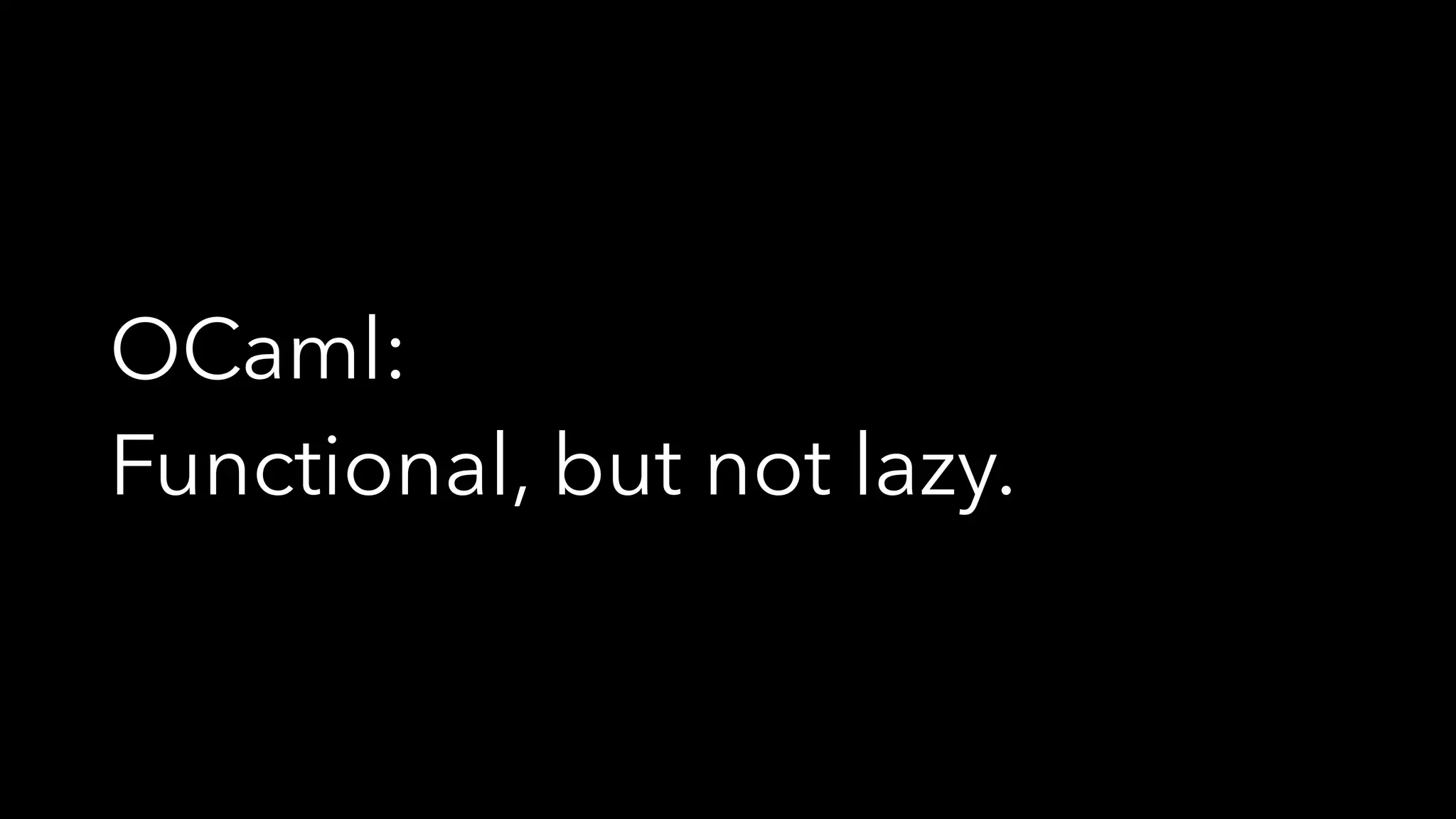

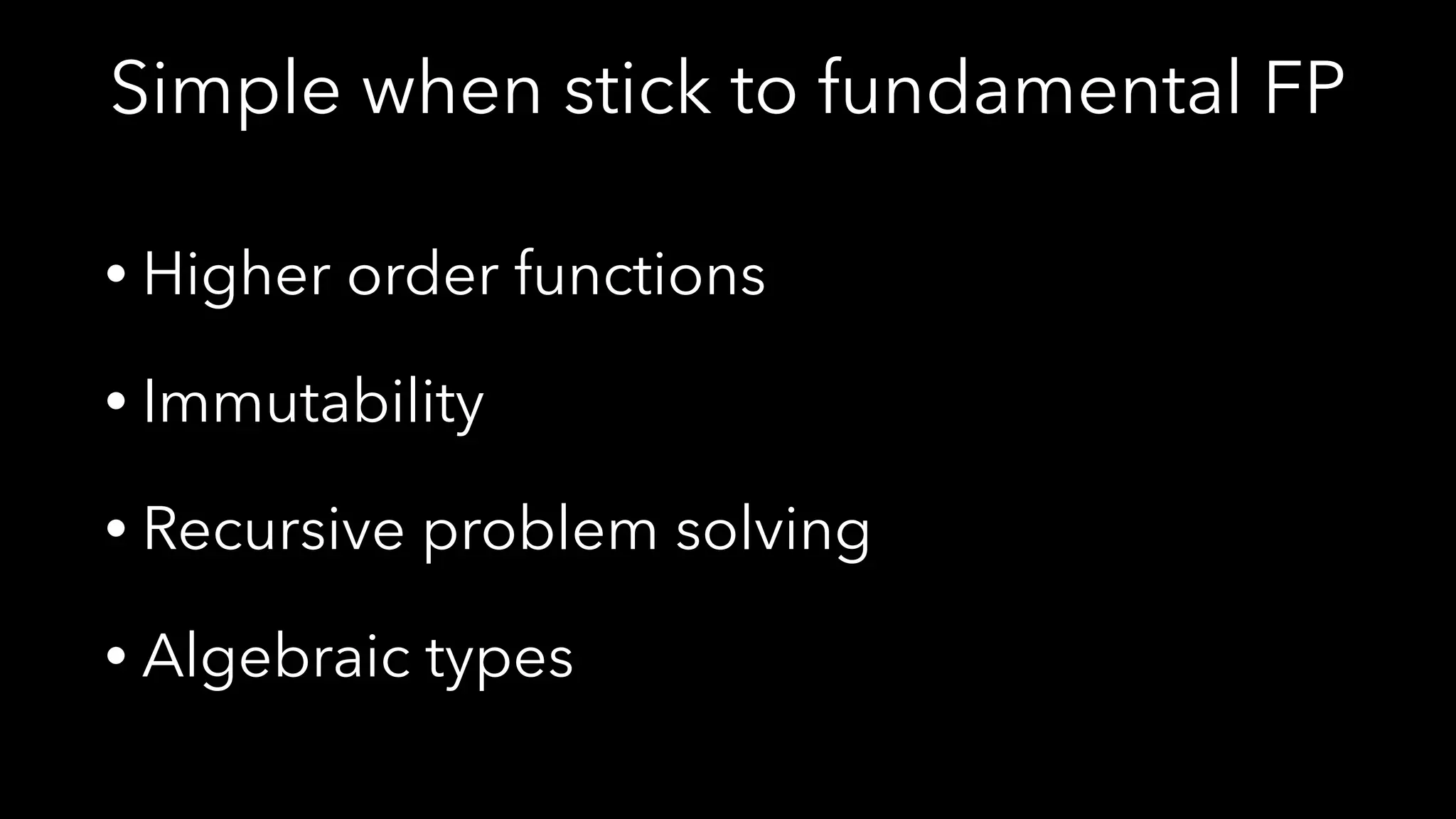
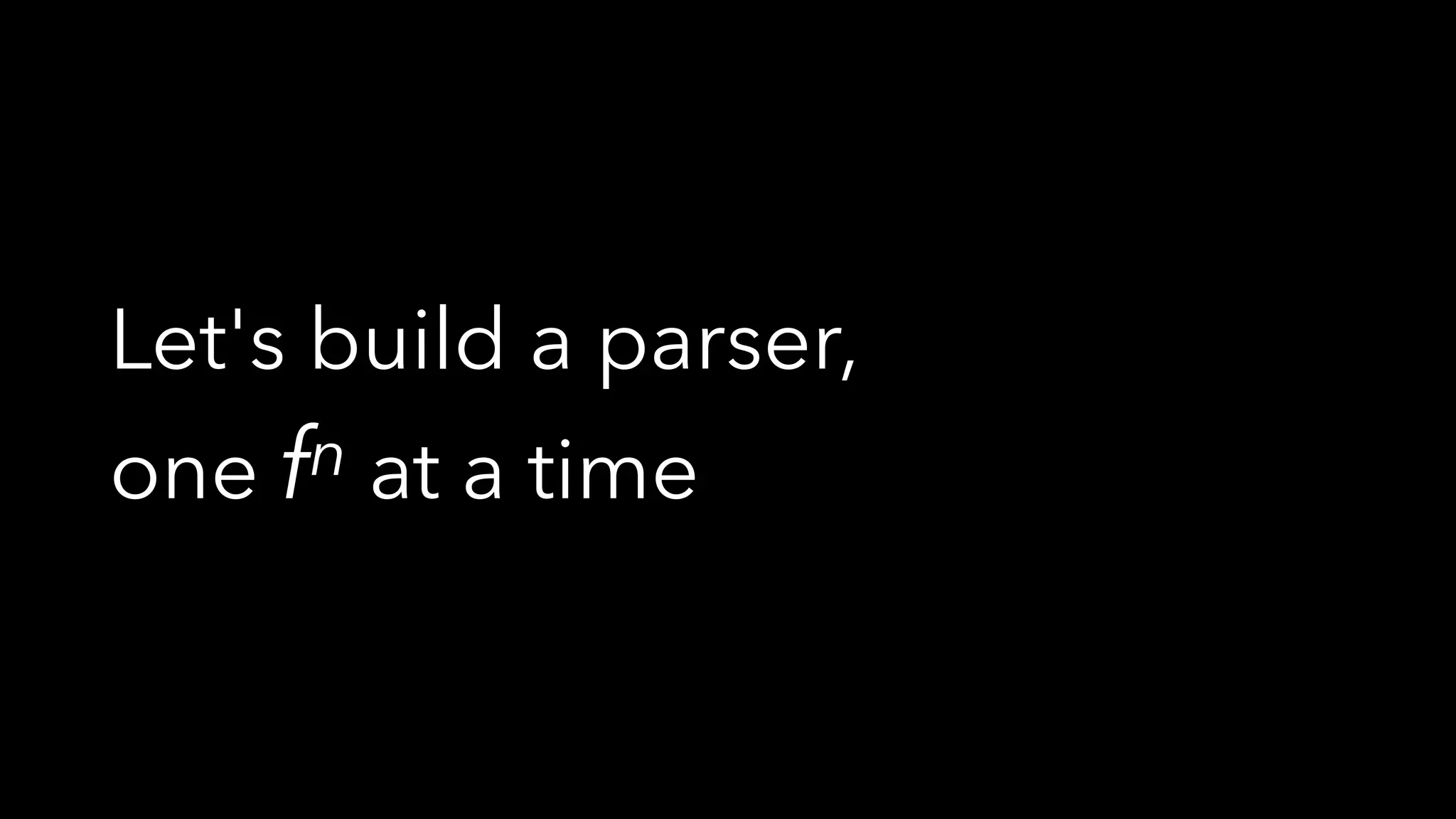
![type Parser a b = [a] !-> [(b, [a])]](https://image.slidesharecdn.com/combinatorparsing-180121101339/75/Combinator-parsing-25-2048.jpg)
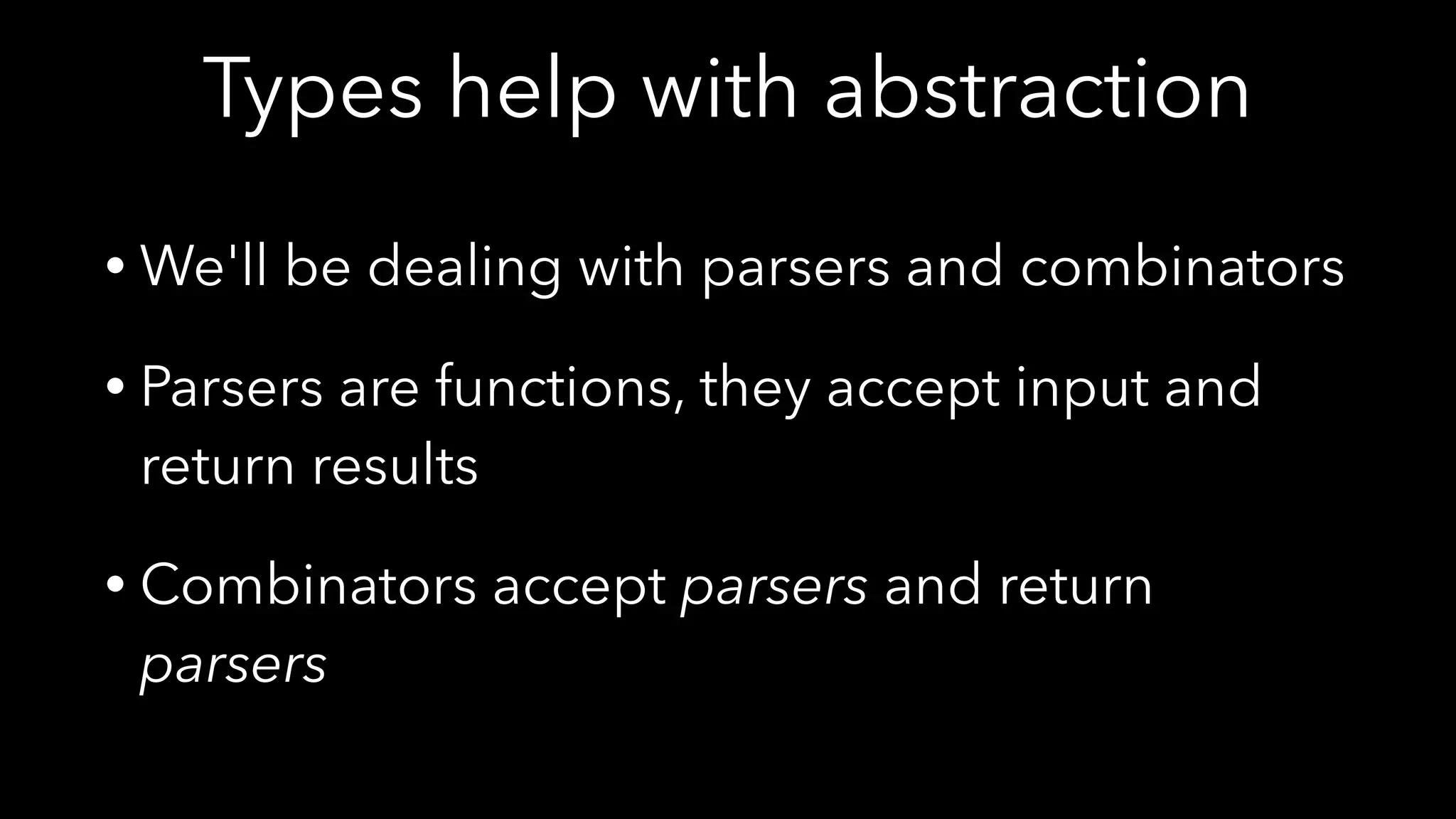
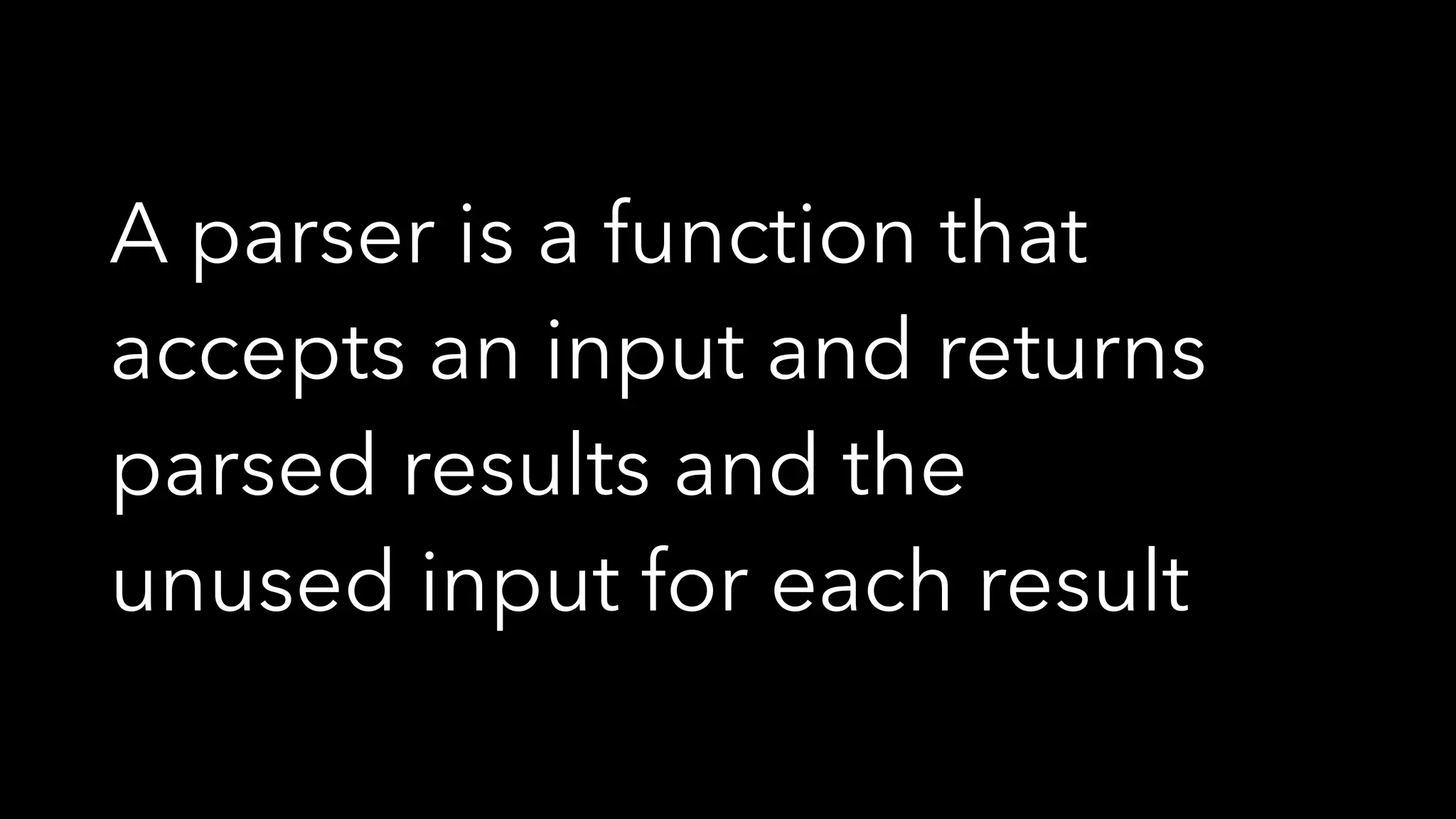
![Parser is a function type that accepts a list of type a and returns all possible results as a list of tuples of type (b, [a])](https://image.slidesharecdn.com/combinatorparsing-180121101339/75/Combinator-parsing-28-2048.jpg)
![(Parser Char Number) input: "42 it is!" !-- a is a [Char] output: [(42, " it is!")] !-- b is a Number](https://image.slidesharecdn.com/combinatorparsing-180121101339/75/Combinator-parsing-29-2048.jpg)
![type Parser a b = [a] !-> [(b, [a])]](https://image.slidesharecdn.com/combinatorparsing-180121101339/75/Combinator-parsing-30-2048.jpg)
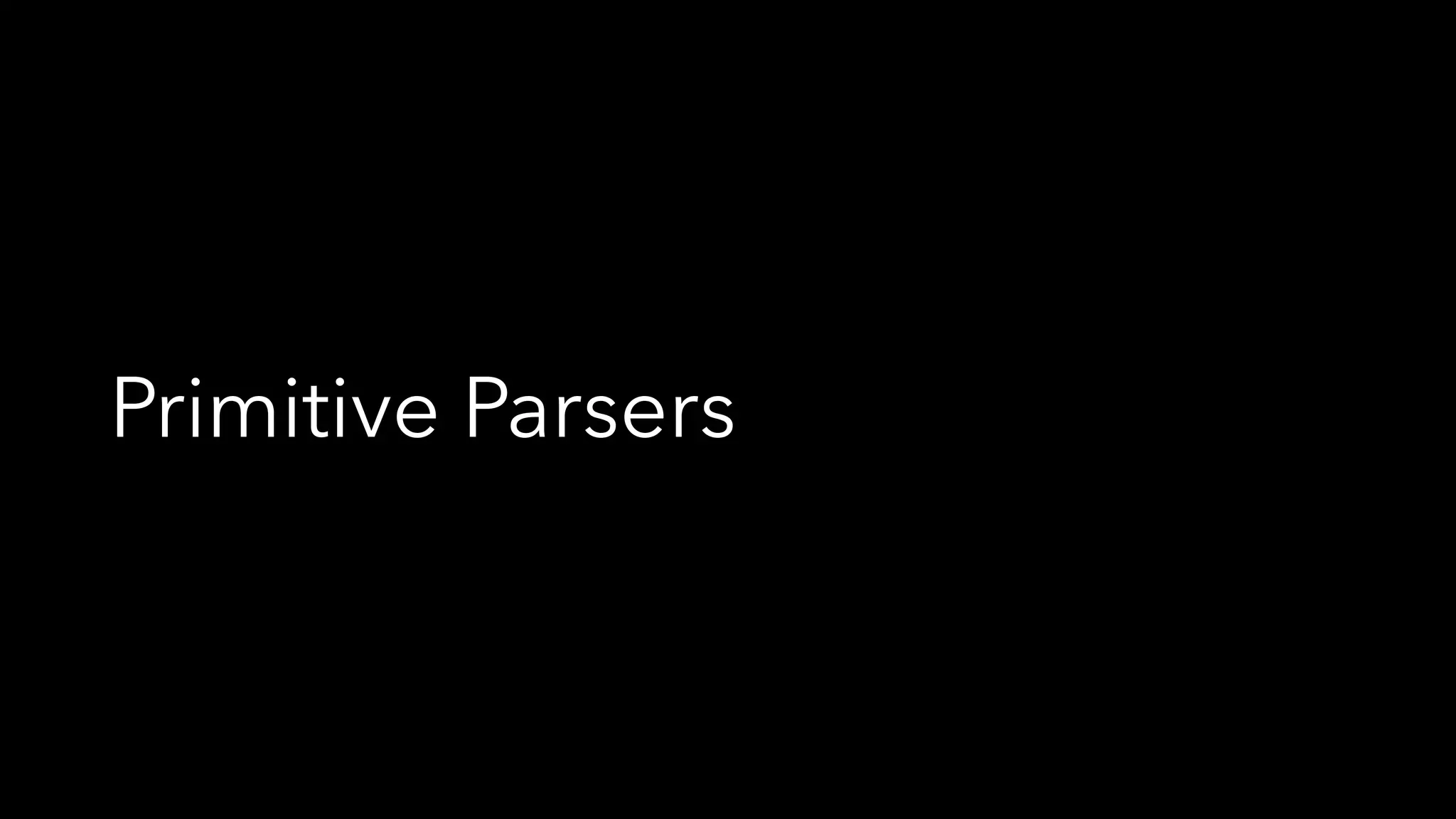
![succeed !:: b !-> Parser a b succeed v inp = [(v, inp)]](https://image.slidesharecdn.com/combinatorparsing-180121101339/75/Combinator-parsing-32-2048.jpg)
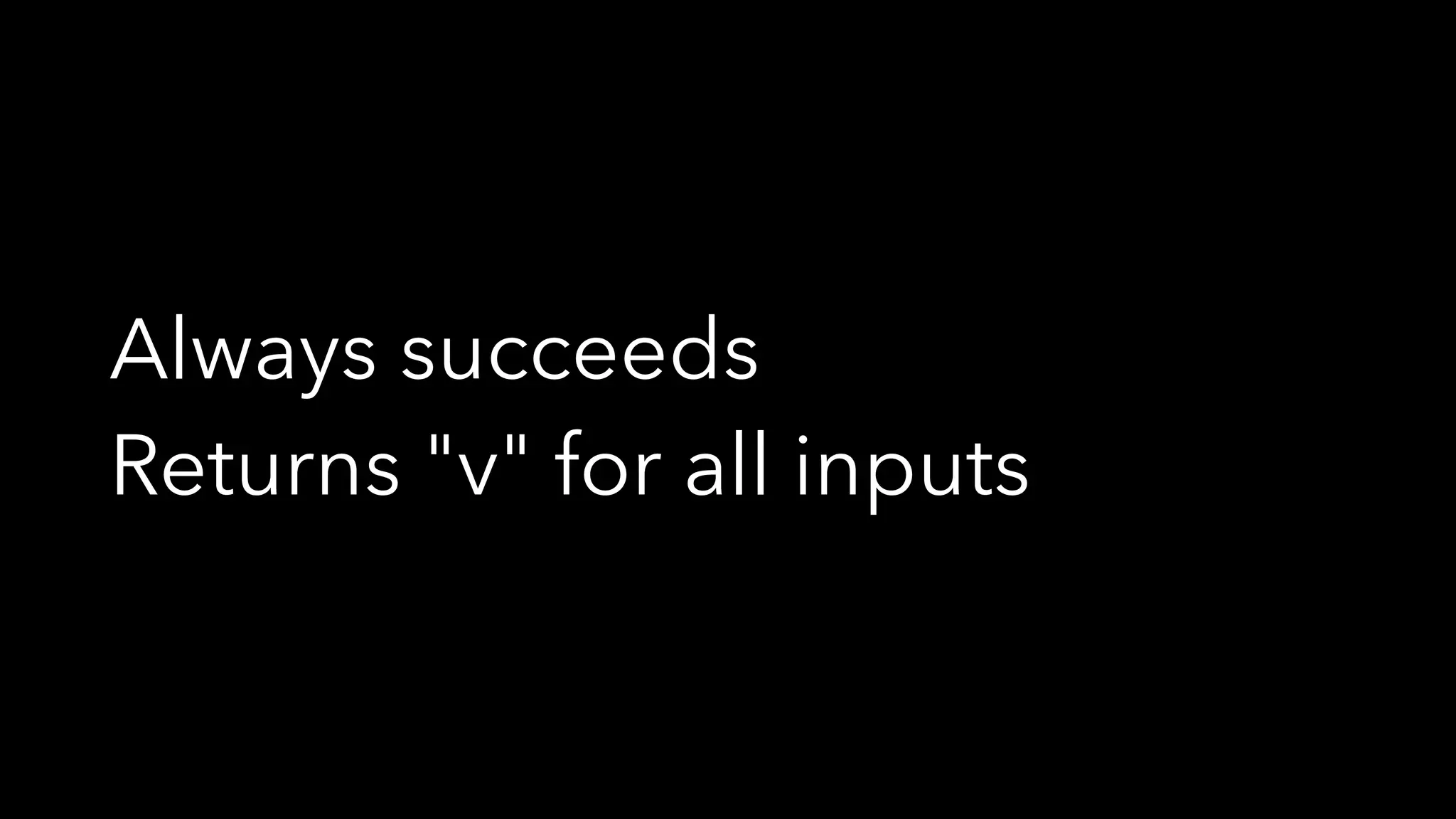
![failure !:: Parser a b failure inp = []](https://image.slidesharecdn.com/combinatorparsing-180121101339/75/Combinator-parsing-34-2048.jpg)
![Always fails Returns "[]" for all inputs](https://image.slidesharecdn.com/combinatorparsing-180121101339/75/Combinator-parsing-35-2048.jpg)
![satisfy !:: (a !-> Bool) !-> Parser a a satisfy p [] = failure [] satisfy p (x:xs) | p x = succeed x xs !-- if p(x) is true | otherwise = failure []](https://image.slidesharecdn.com/combinatorparsing-180121101339/75/Combinator-parsing-36-2048.jpg)
![satisfy !:: (a !-> Bool) !-> Parser a a satisfy p [] = failure [] satisfy p (x:xs) | p x = succeed x xs !-- if p(x) is true | otherwise = failure [] Guard Clauses, if you want to Google](https://image.slidesharecdn.com/combinatorparsing-180121101339/75/Combinator-parsing-37-2048.jpg)
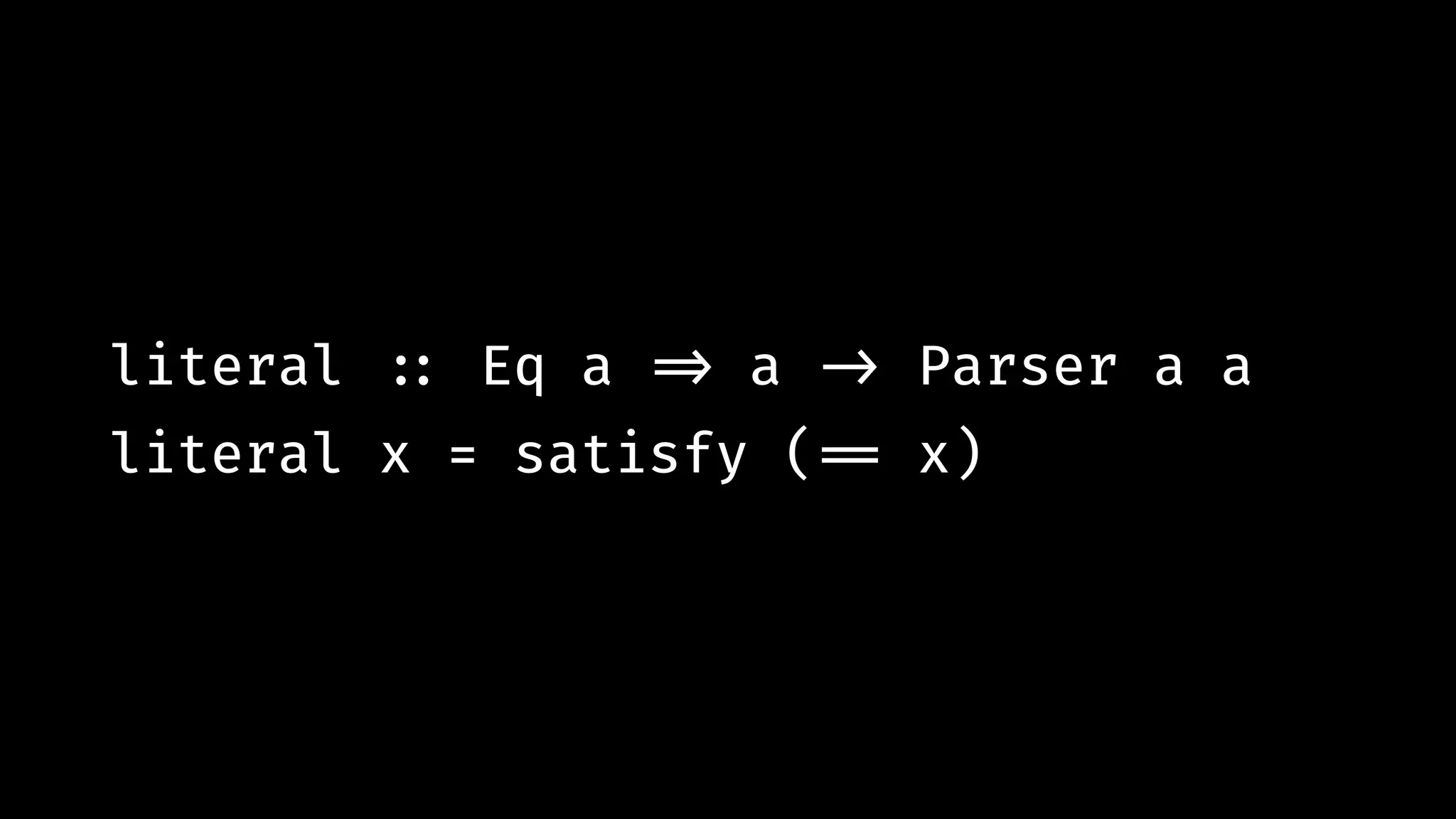
![match_3 = (literal '3') match_3 "345" !-- !=> [('3',"45")] match_3 "456" !-- !=> []](https://image.slidesharecdn.com/combinatorparsing-180121101339/75/Combinator-parsing-39-2048.jpg)


![match_3_or_4 = match_3 `alt` match_4 match_3_or_4 "345" !-- !=> [('3',"45")] match_3_or_4 "456" !-- !=> [('4',"56")]](https://image.slidesharecdn.com/combinatorparsing-180121101339/75/Combinator-parsing-42-2048.jpg)
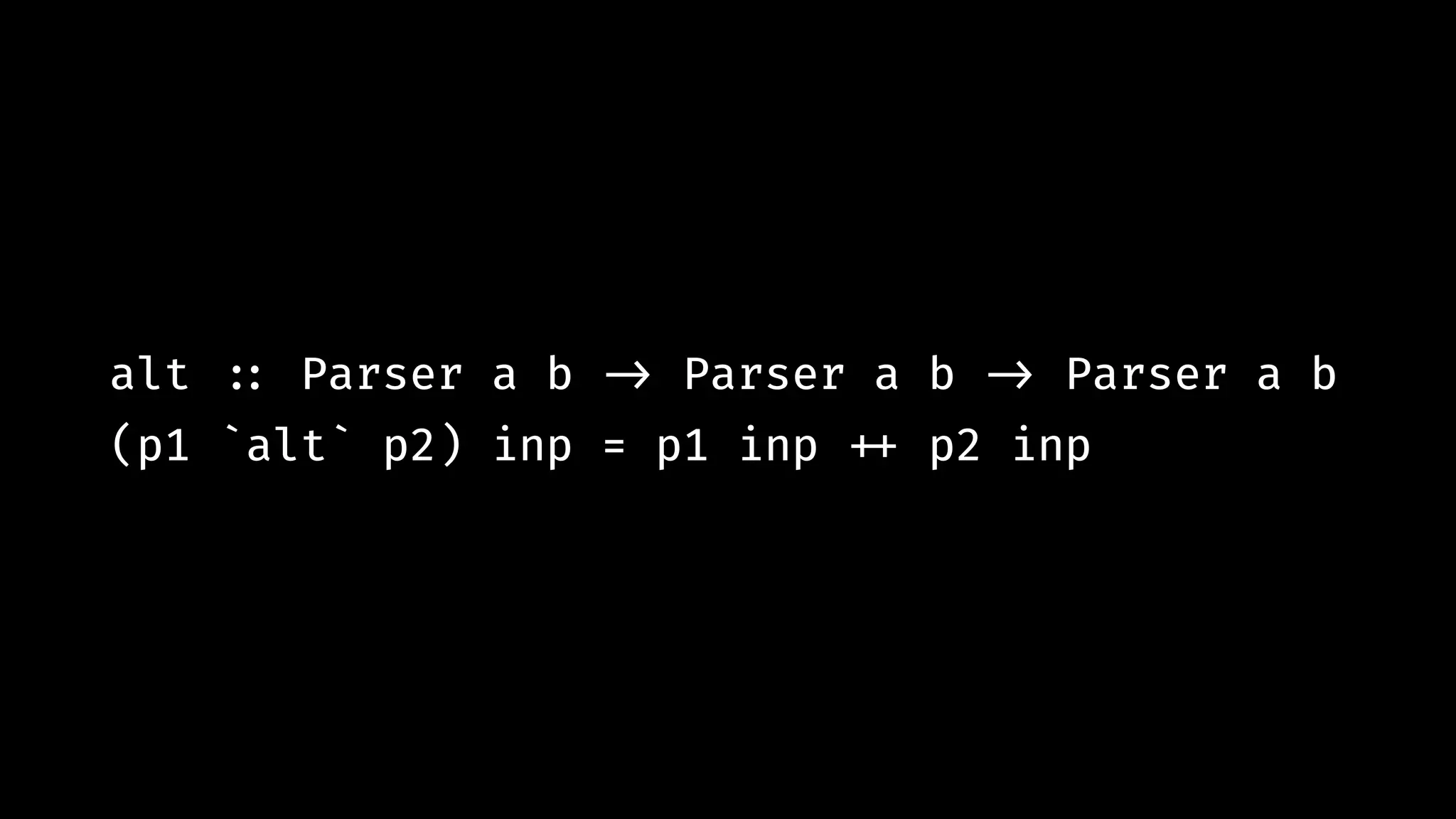
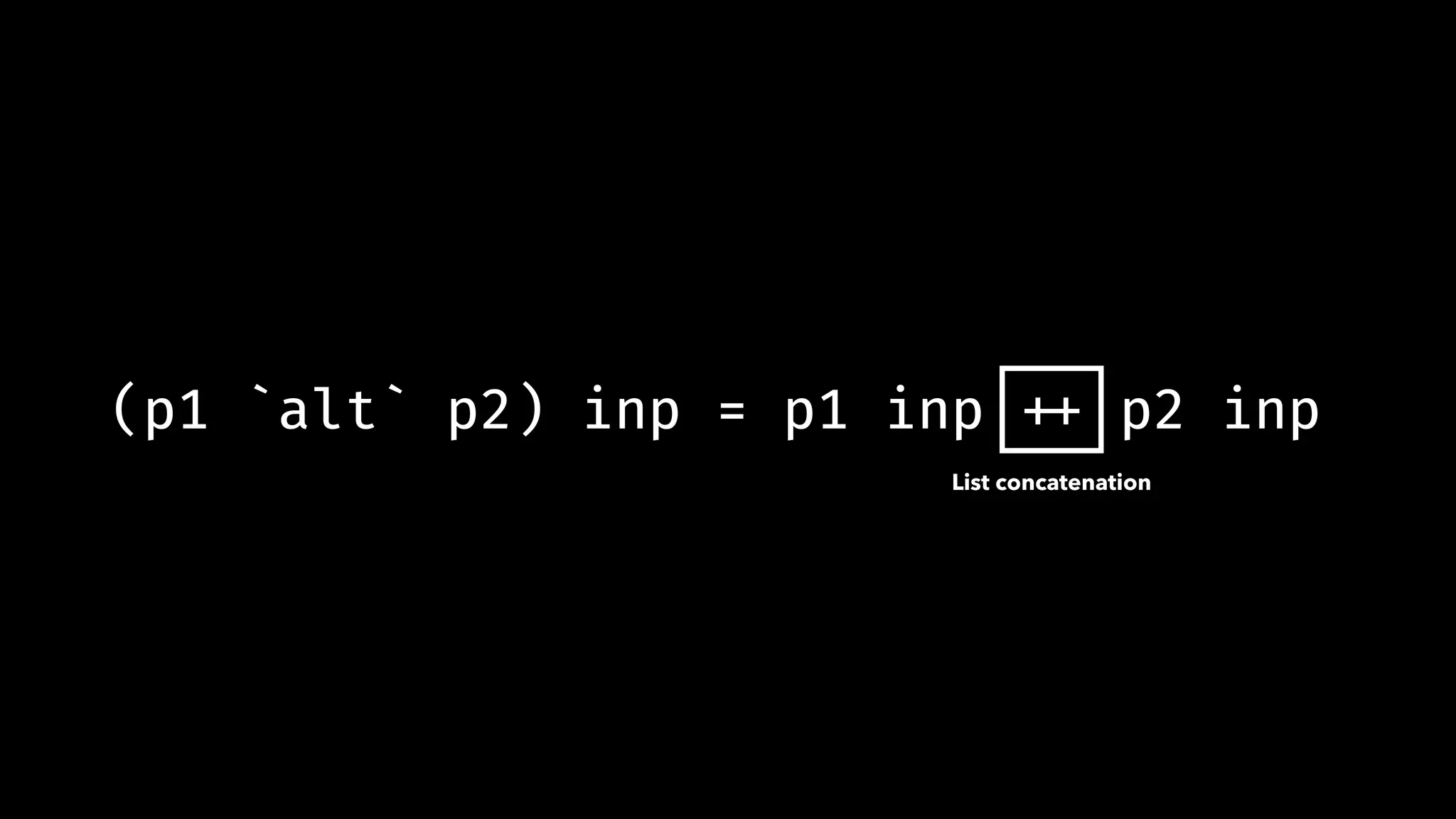
![(match_3 `and_then` match_4) "345" # !=> [(('3','4'),"5")]](https://image.slidesharecdn.com/combinatorparsing-180121101339/75/Combinator-parsing-45-2048.jpg)

![and_then !:: Parser a b !-> Parser a c !-> Parser a (b, c) (p1 `and_then` p2) inp = [ ((v1, v2), out2) | (v1, out1) !<- p1 inp, (v2, out2) !<- p2 out1 ]](https://image.slidesharecdn.com/combinatorparsing-180121101339/75/Combinator-parsing-47-2048.jpg)
![and_then !:: Parser a b !-> Parser a c !-> Parser a (b, c) (p1 `and_then` p2) inp = [ ((v1, v2), out2) | (v1, out1) !<- p1 inp, (v2, out2) !<- p2 out1 ] List comprehensions](https://image.slidesharecdn.com/combinatorparsing-180121101339/75/Combinator-parsing-48-2048.jpg)
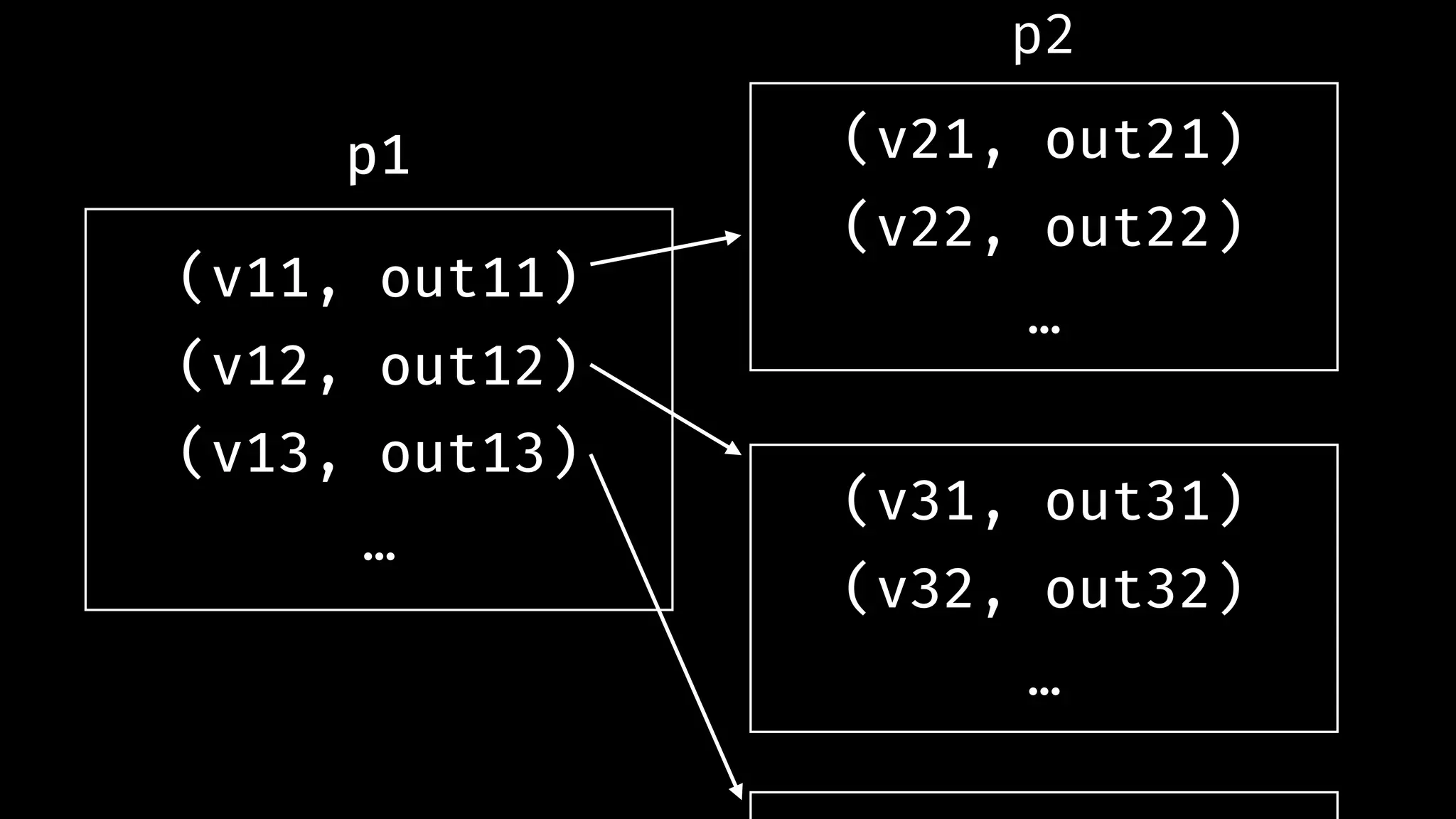
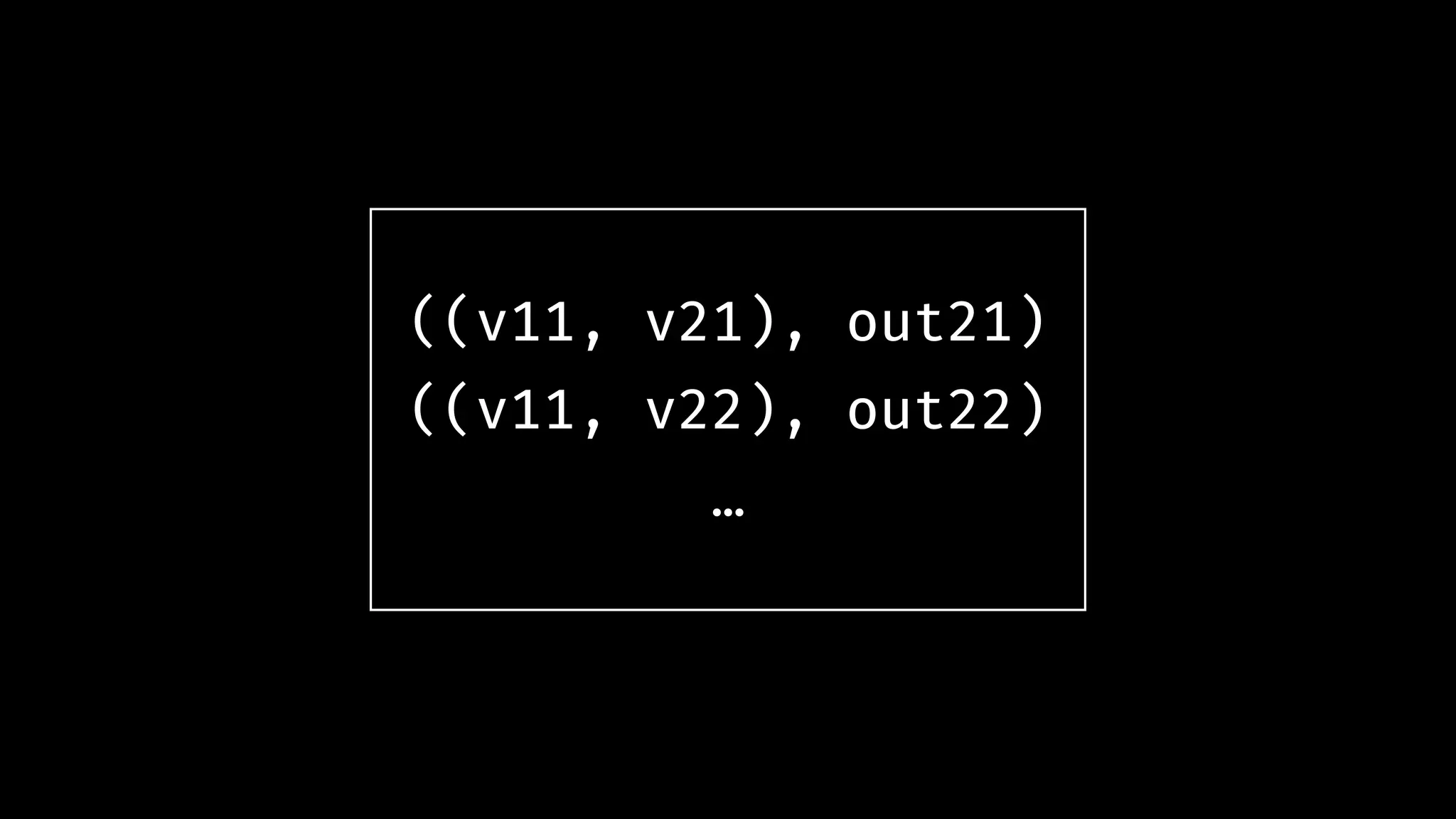
![(match_3 `and_then` match_4) "345" # !=> [(('3','4'),"5")]](https://image.slidesharecdn.com/combinatorparsing-180121101339/75/Combinator-parsing-51-2048.jpg)
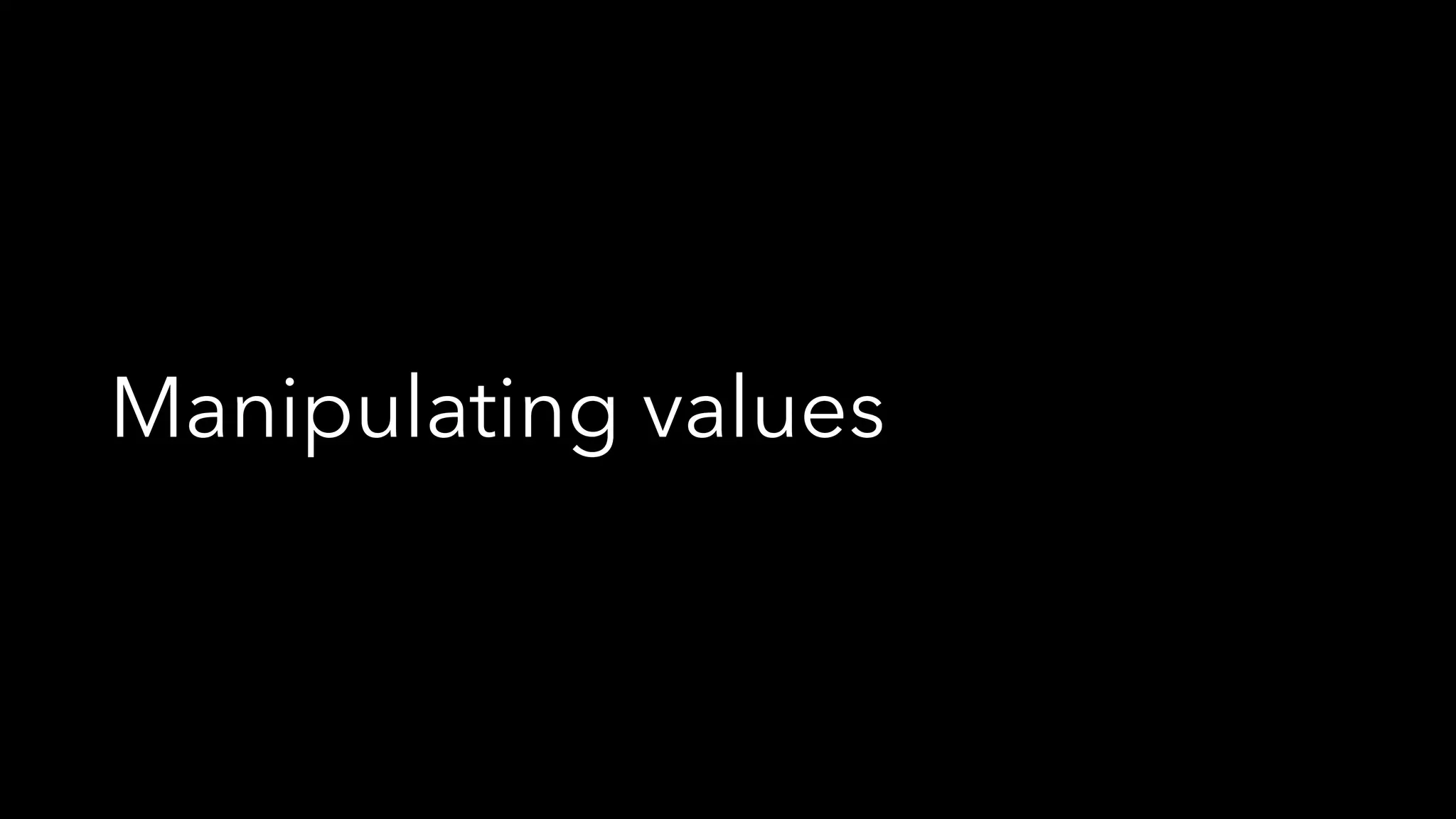
![match_3 = (literal '3') match_3 "345" !-- !=> [('3',"45")] match_3 "456" !-- !=> []](https://image.slidesharecdn.com/combinatorparsing-180121101339/75/Combinator-parsing-53-2048.jpg)
![(number "42") "42 !=> answer" # !=> [(42, " answer")]](https://image.slidesharecdn.com/combinatorparsing-180121101339/75/Combinator-parsing-54-2048.jpg)
![(keyword "for") "for i in 1!..42" # !=> [(:for, " i in 1!..42")]](https://image.slidesharecdn.com/combinatorparsing-180121101339/75/Combinator-parsing-55-2048.jpg)
![using !:: Parser a b !-> (b !-> c) !-> Parser a c (p `using` f) inp = [(f v, out) | (v, out) !<- p inp ]](https://image.slidesharecdn.com/combinatorparsing-180121101339/75/Combinator-parsing-56-2048.jpg)
![((string "3") `using` float) "3" # !=> [(3.0, "")]](https://image.slidesharecdn.com/combinatorparsing-180121101339/75/Combinator-parsing-57-2048.jpg)

![many !:: Parser a b !-> Parser a [b] many p = ((p `and_then` many p) `using` cons) `alt` (succeed [])](https://image.slidesharecdn.com/combinatorparsing-180121101339/75/Combinator-parsing-59-2048.jpg)

![(many (literal 'a')) "aab" !=> [("aa","b"),("a","ab"),("","aab")]](https://image.slidesharecdn.com/combinatorparsing-180121101339/75/Combinator-parsing-61-2048.jpg)
![(many (literal 'a')) "xyz" !=> [("","xyz")]](https://image.slidesharecdn.com/combinatorparsing-180121101339/75/Combinator-parsing-62-2048.jpg)
![some !:: Parser a b !-> Parser a [b] some p = ((p `and_then` many p) `using` cons)](https://image.slidesharecdn.com/combinatorparsing-180121101339/75/Combinator-parsing-63-2048.jpg)

![(some (literal 'a')) "aab" !=> [("aa","b"),("a","ab")]](https://image.slidesharecdn.com/combinatorparsing-180121101339/75/Combinator-parsing-65-2048.jpg)
![(some (literal 'a')) "xyz" !=> []](https://image.slidesharecdn.com/combinatorparsing-180121101339/75/Combinator-parsing-66-2048.jpg)
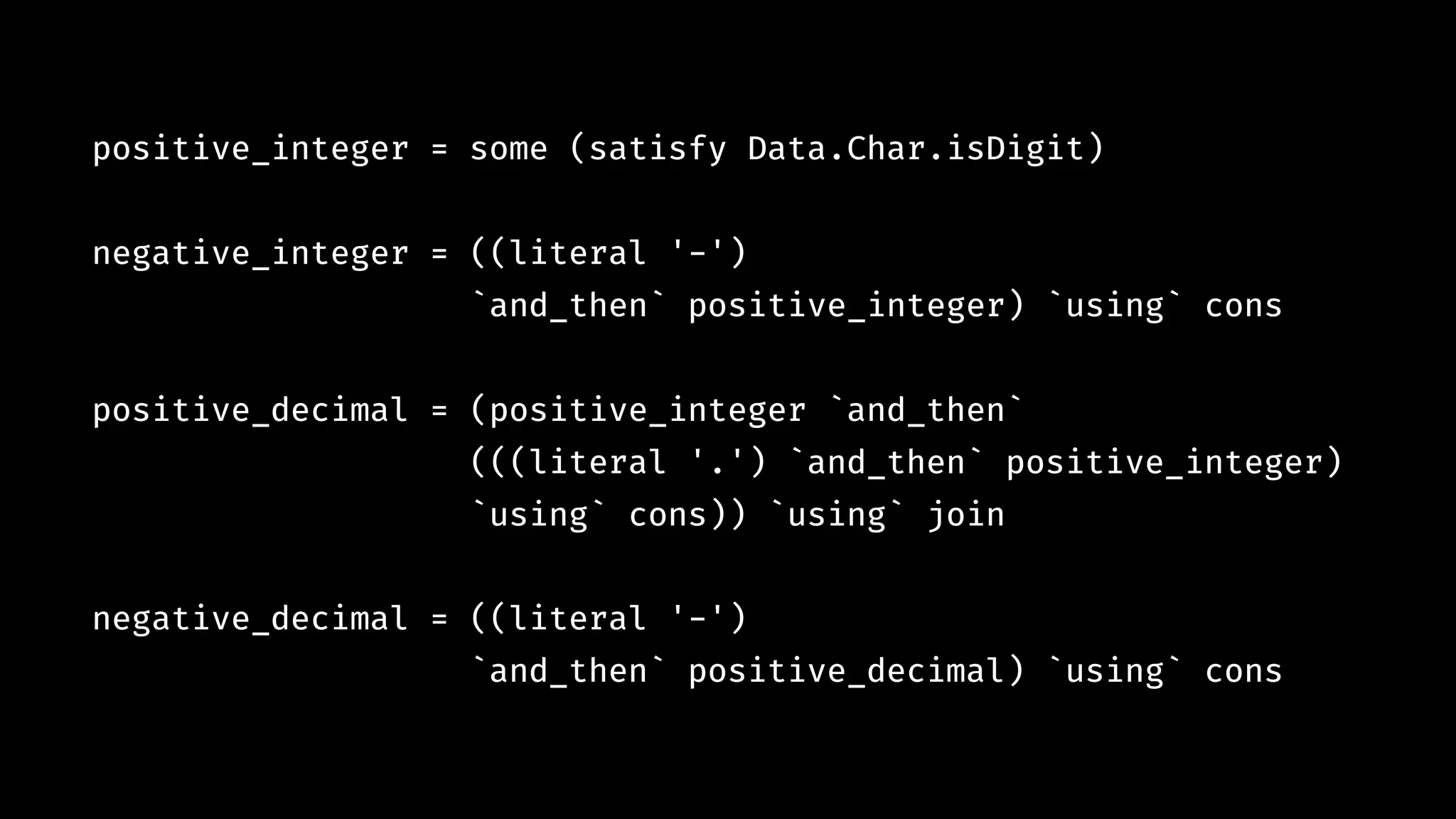
![number !:: Parser Char [Char] number = negative_decimal `alt` positive_decimal `alt` negative_integer `alt` positive_integer](https://image.slidesharecdn.com/combinatorparsing-180121101339/75/Combinator-parsing-68-2048.jpg)
![word !:: Parser Char [Char] word = some (satisfy isLetter)](https://image.slidesharecdn.com/combinatorparsing-180121101339/75/Combinator-parsing-69-2048.jpg)
![string !:: (Eq a) !=> [a] !-> Parser a [a] string [] = succeed [] string (x:xs) = (literal x `and_then` string xs) `using` cons](https://image.slidesharecdn.com/combinatorparsing-180121101339/75/Combinator-parsing-70-2048.jpg)
![(string "begin") "begin end" # !=> [("begin"," end")]](https://image.slidesharecdn.com/combinatorparsing-180121101339/75/Combinator-parsing-71-2048.jpg)
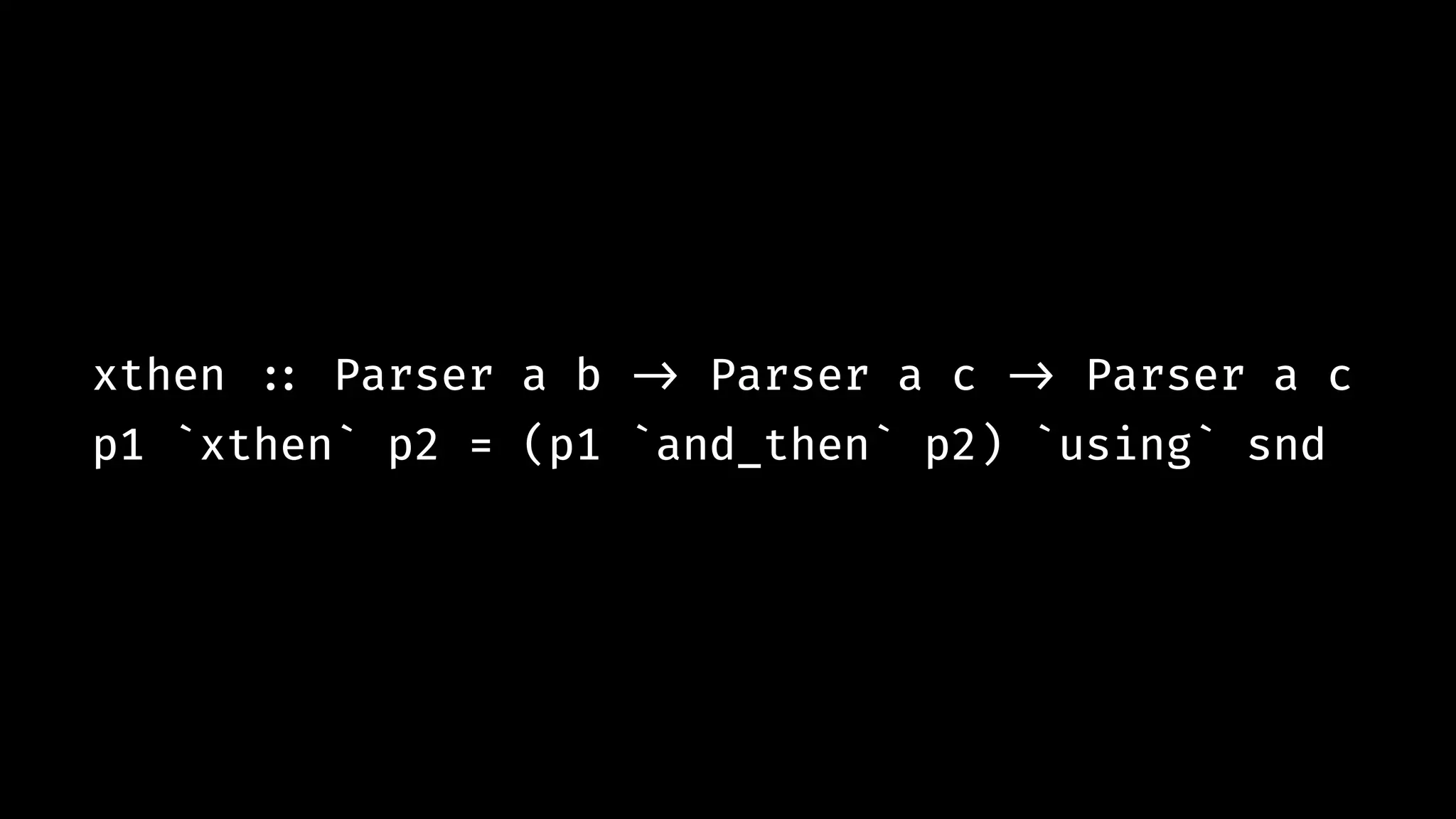
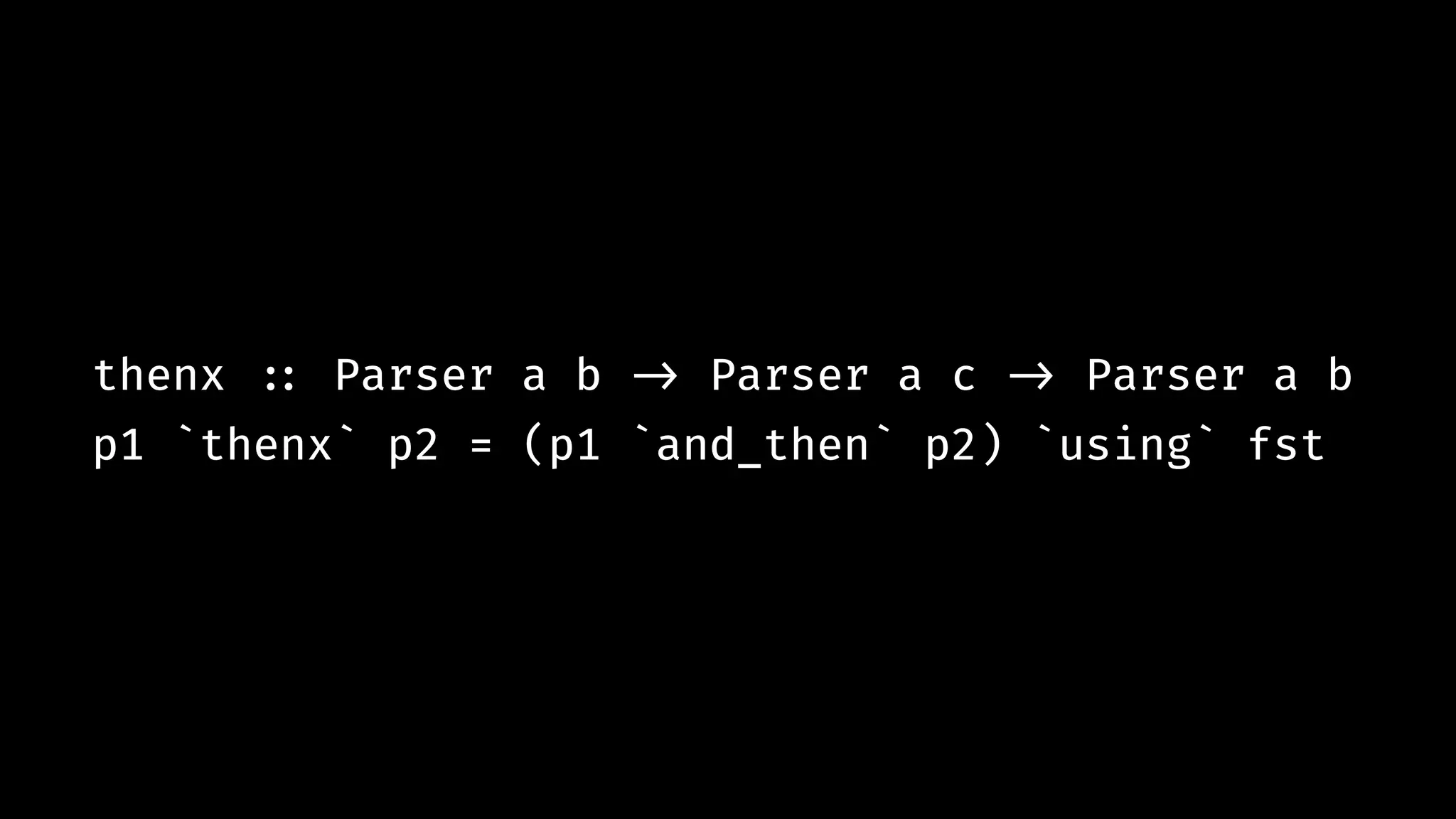
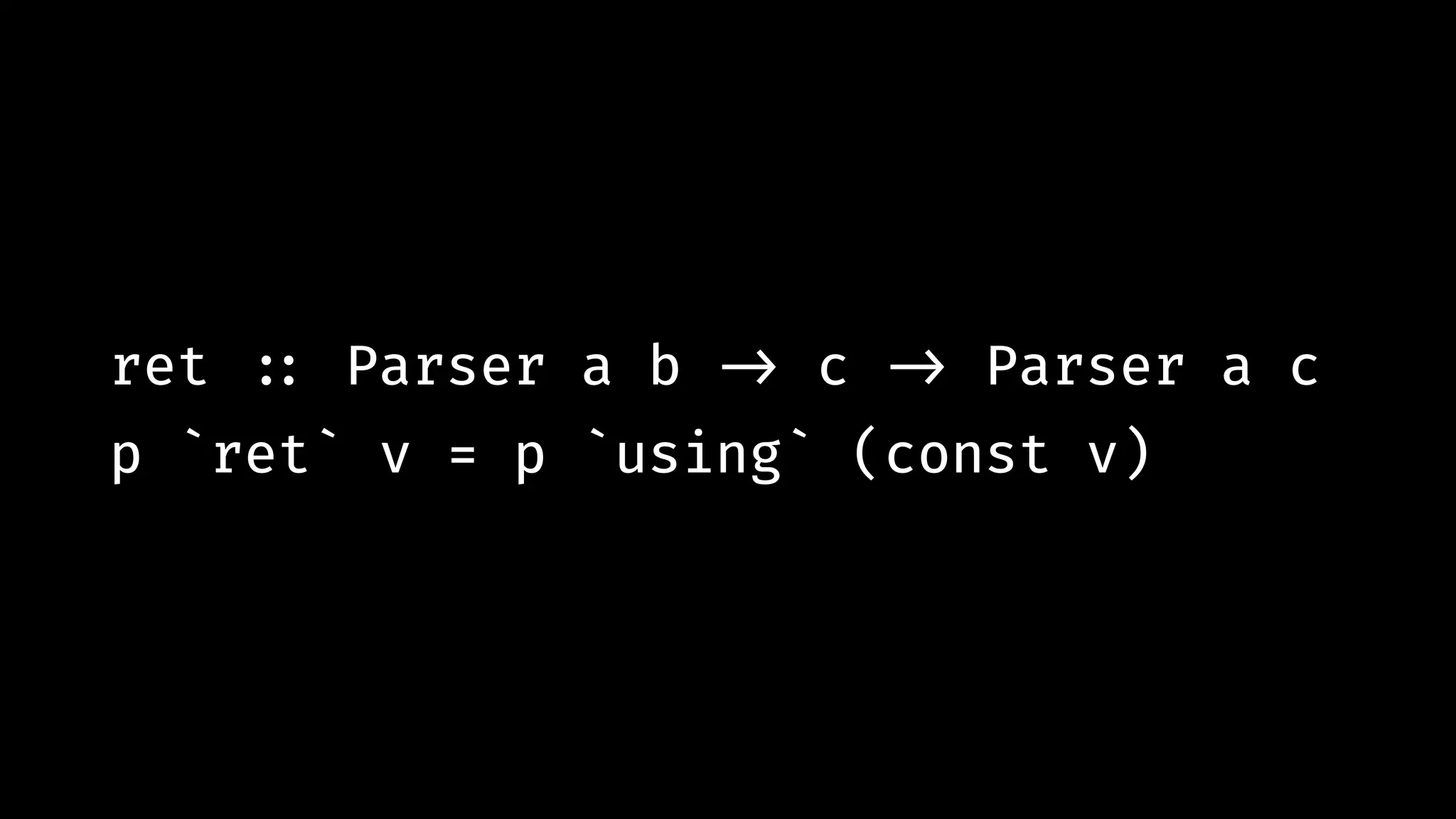
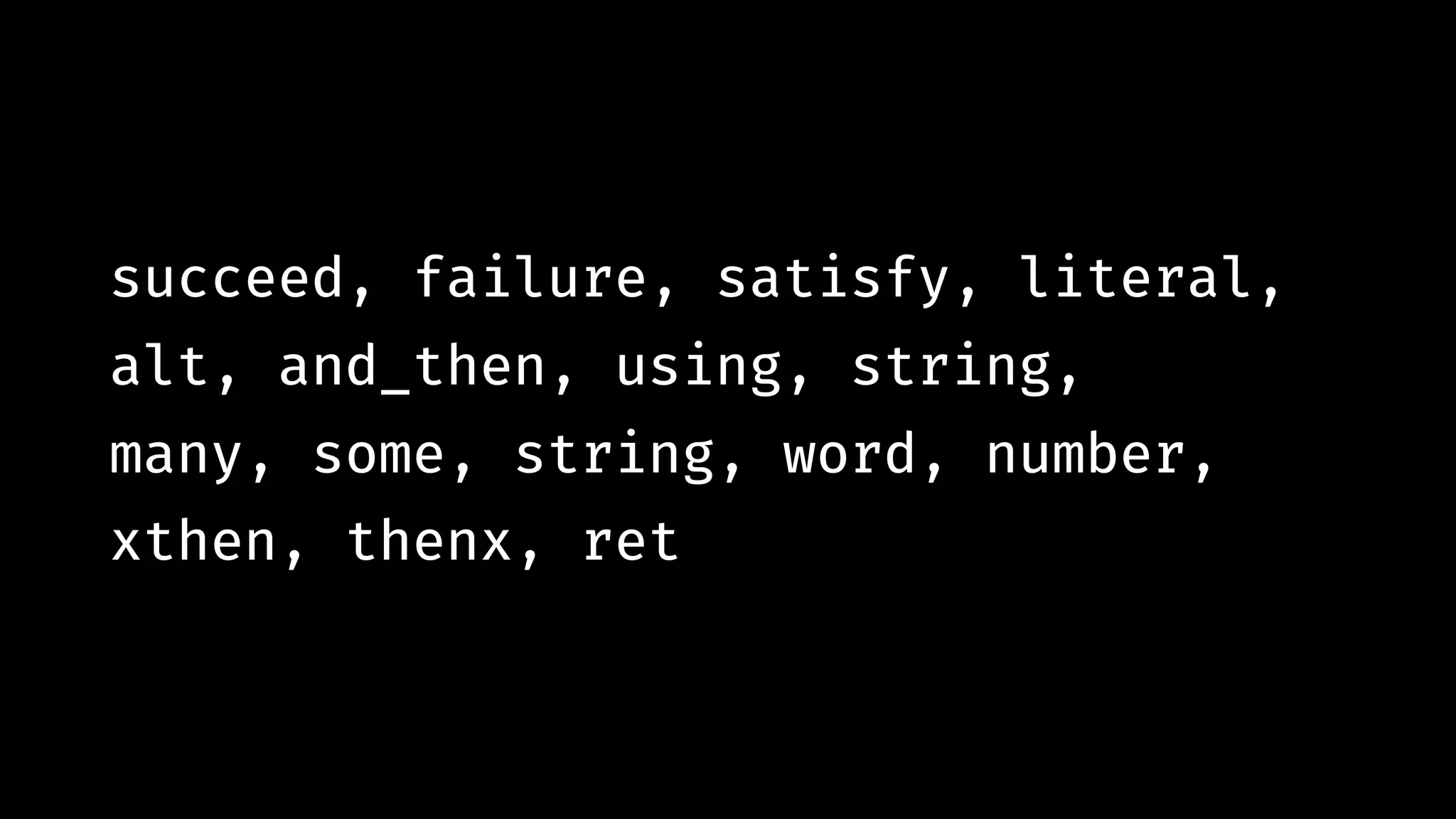
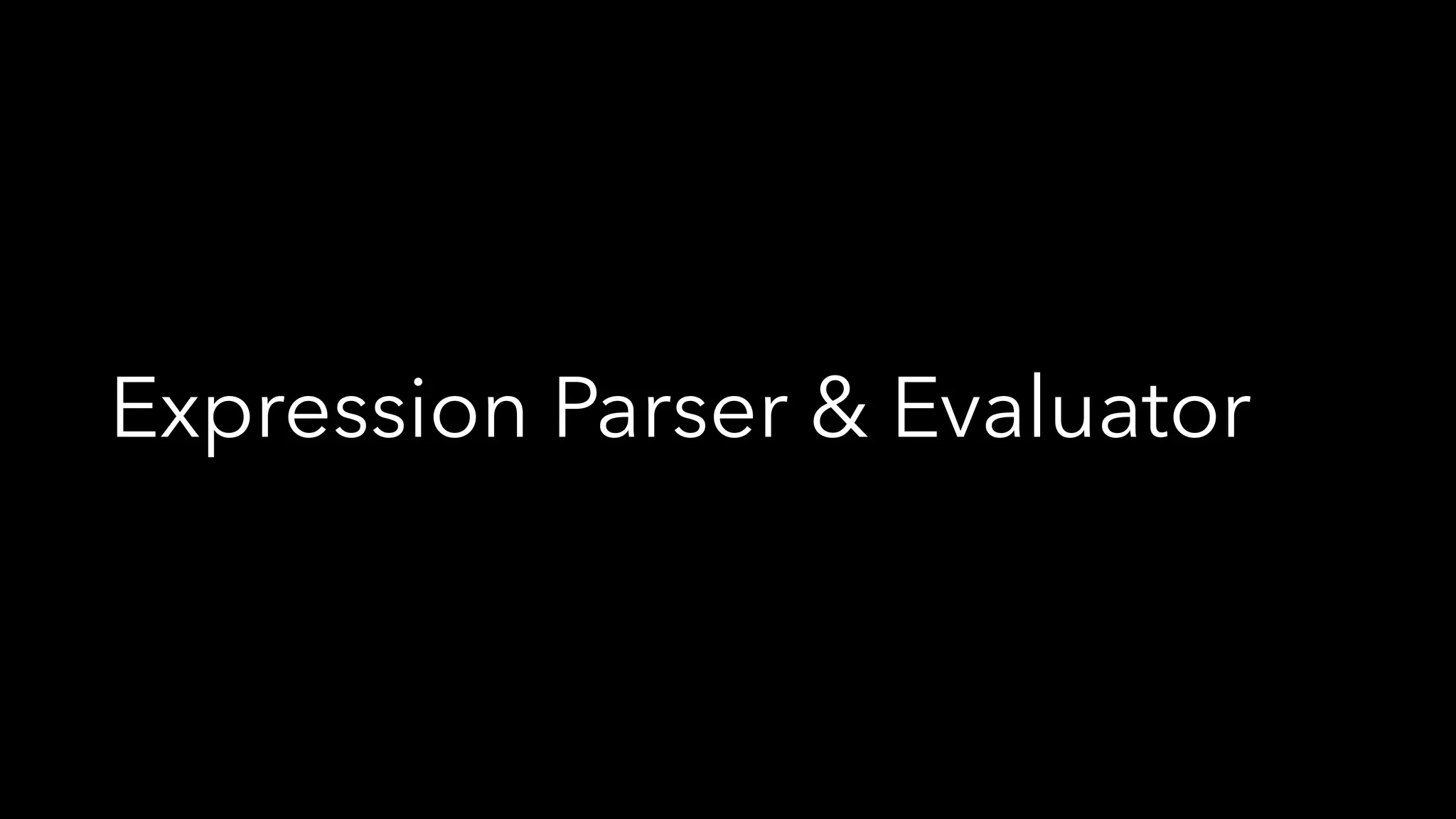
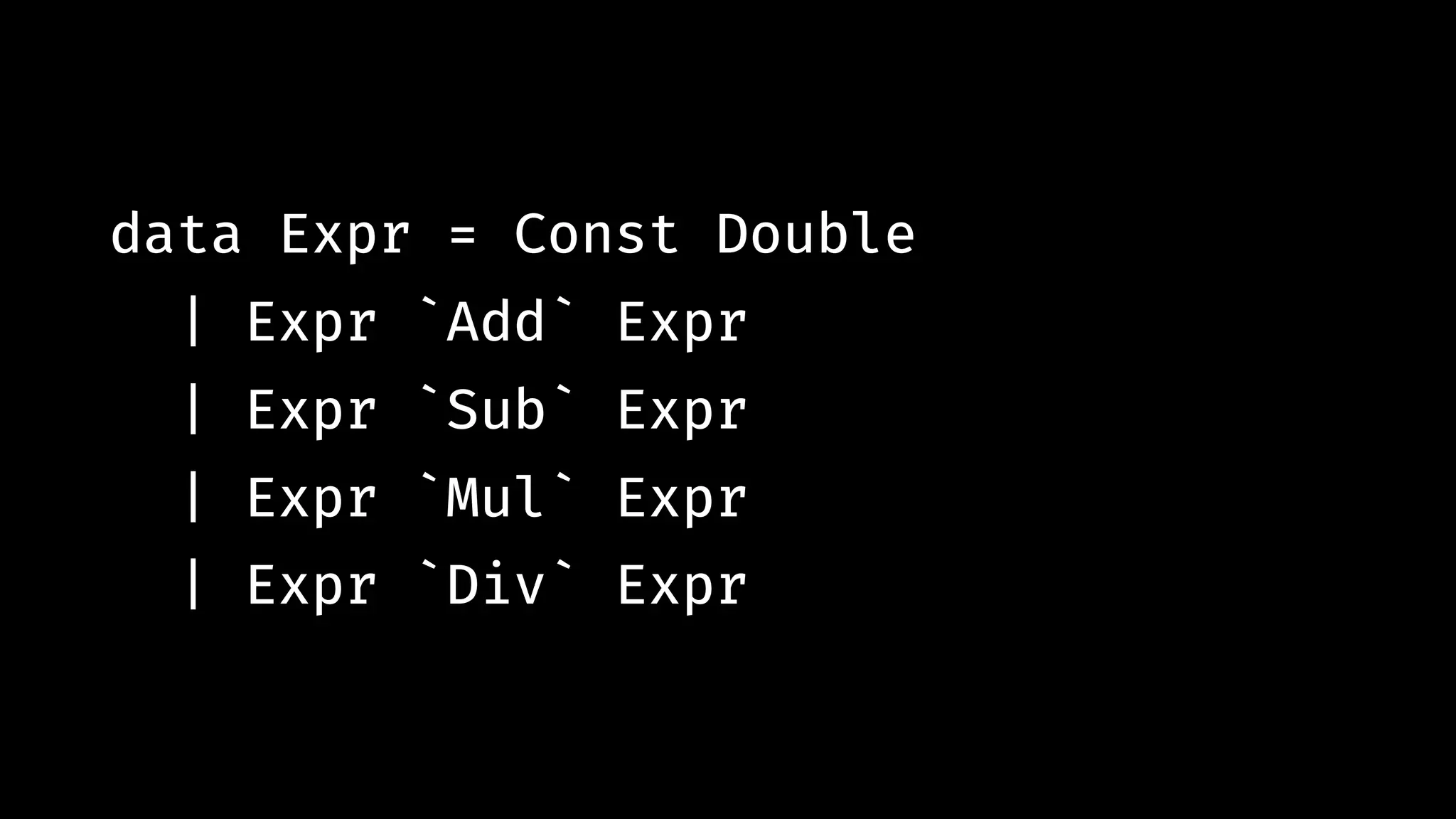
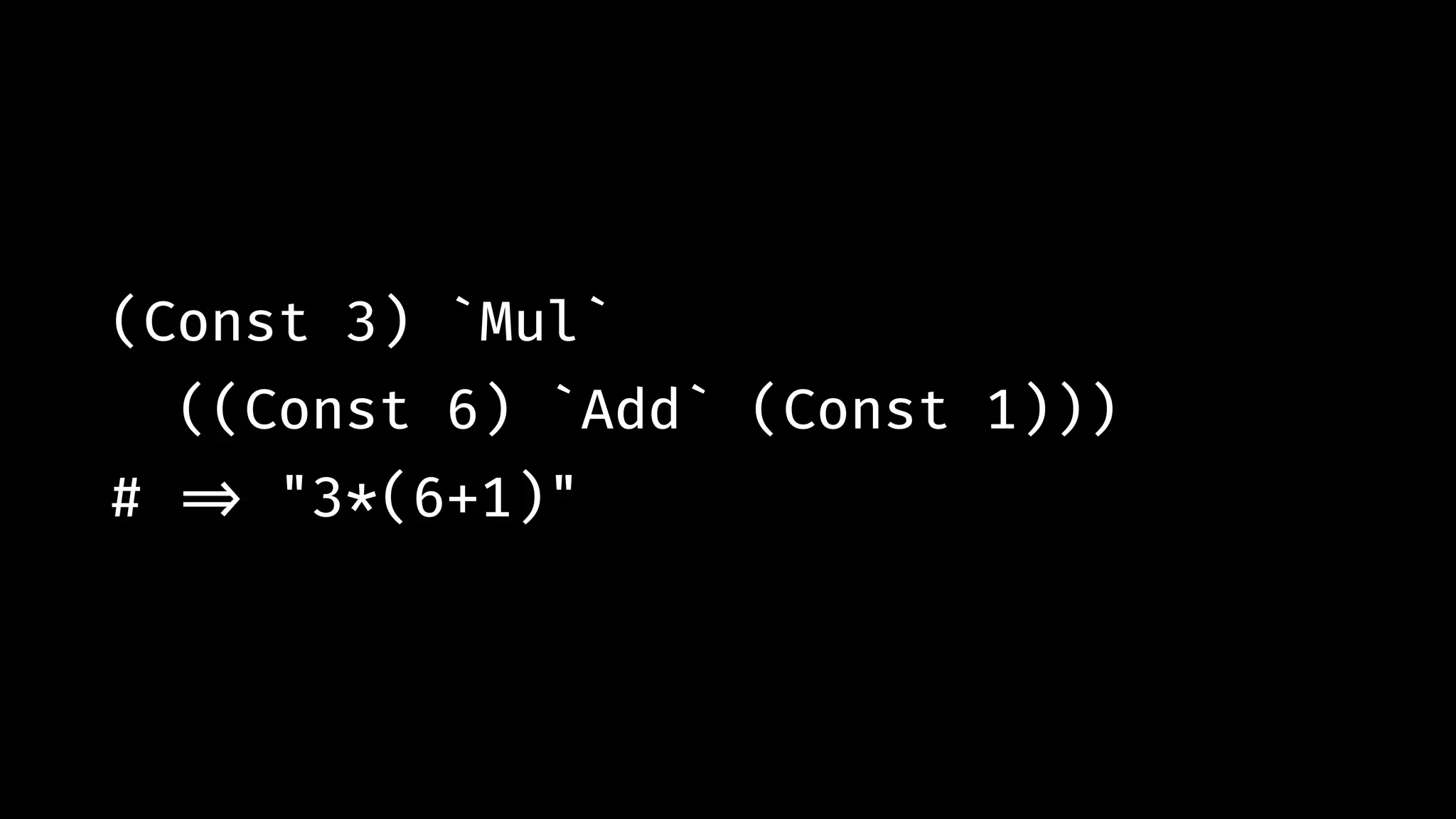
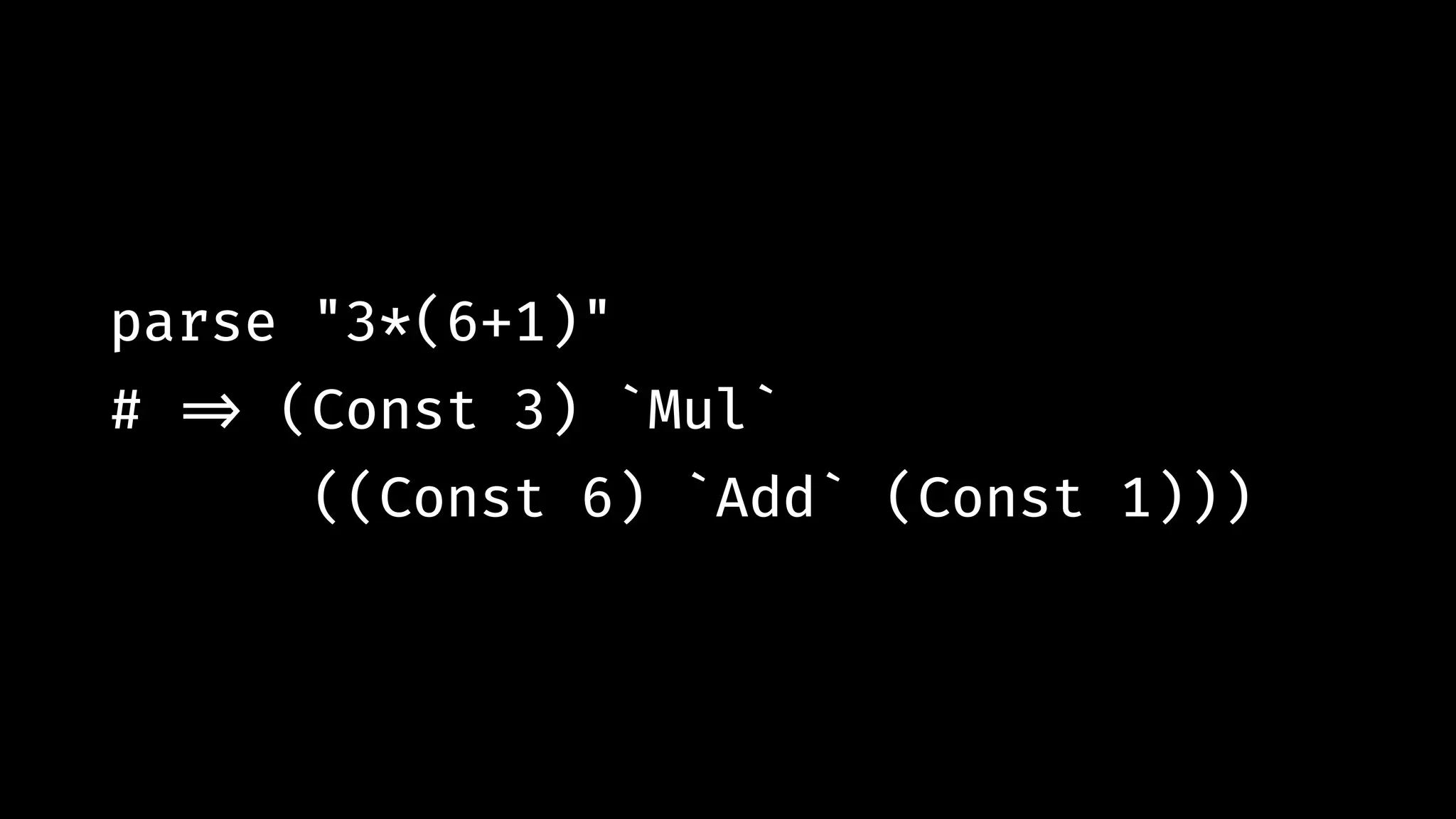
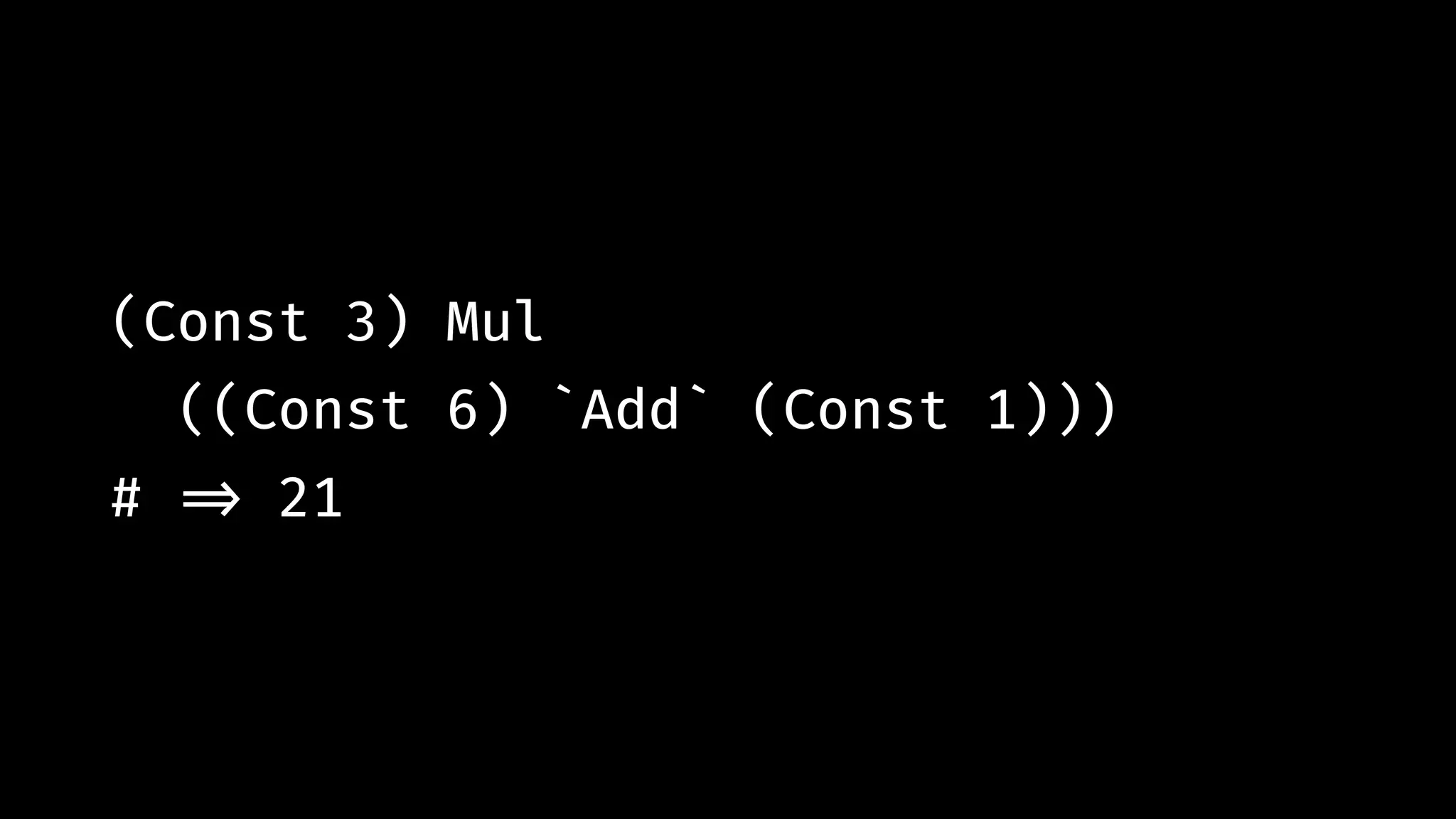
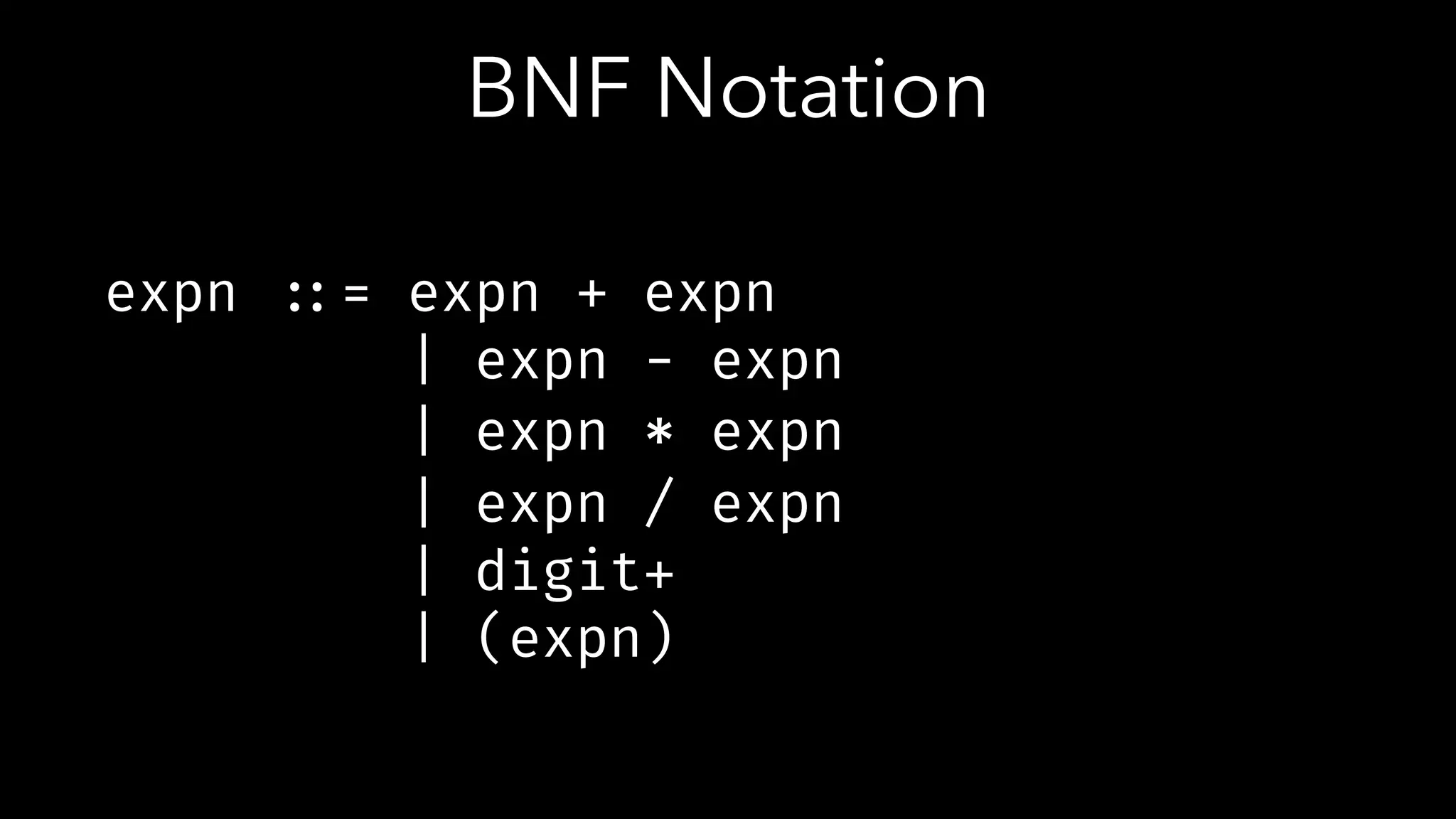
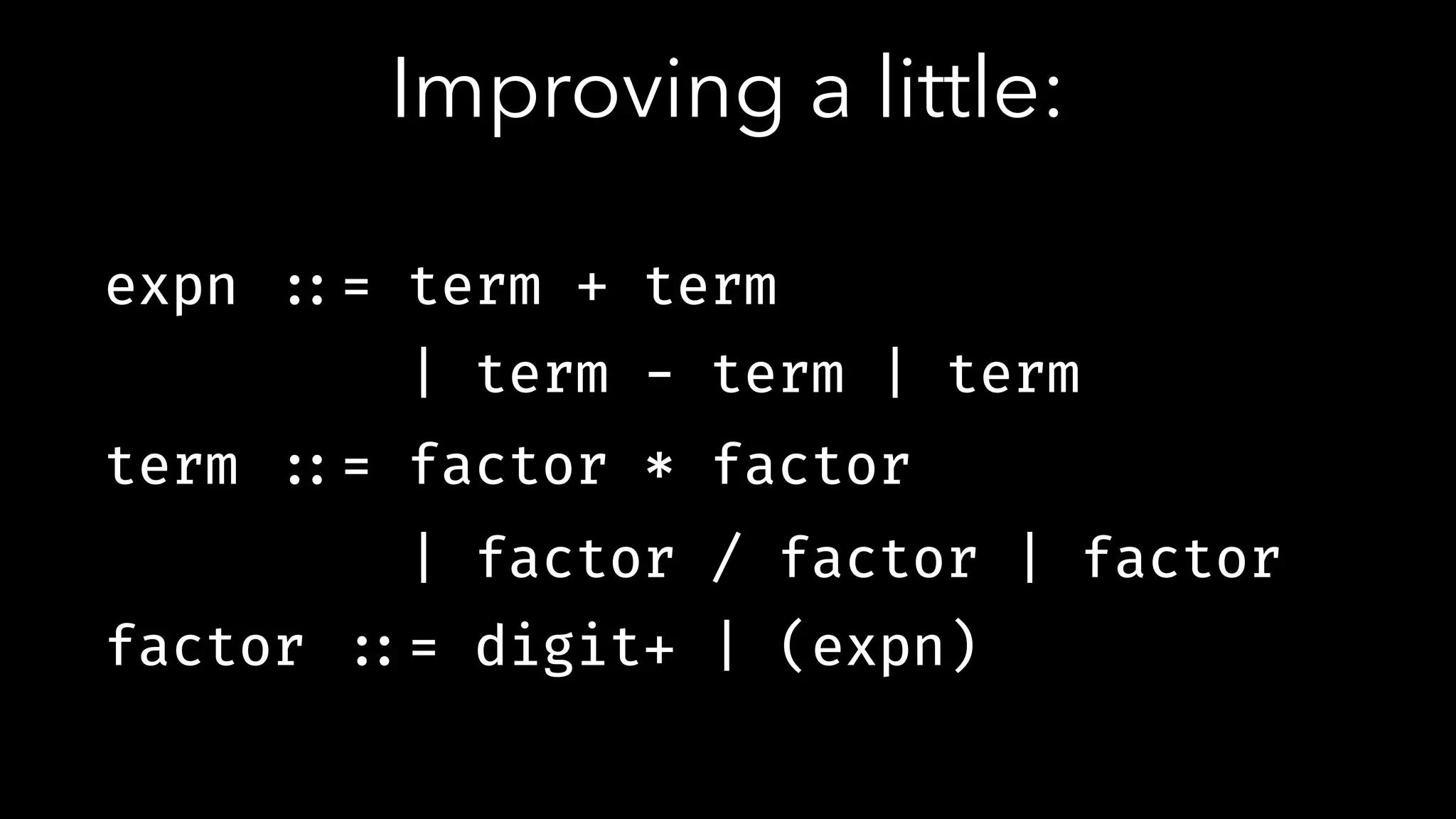
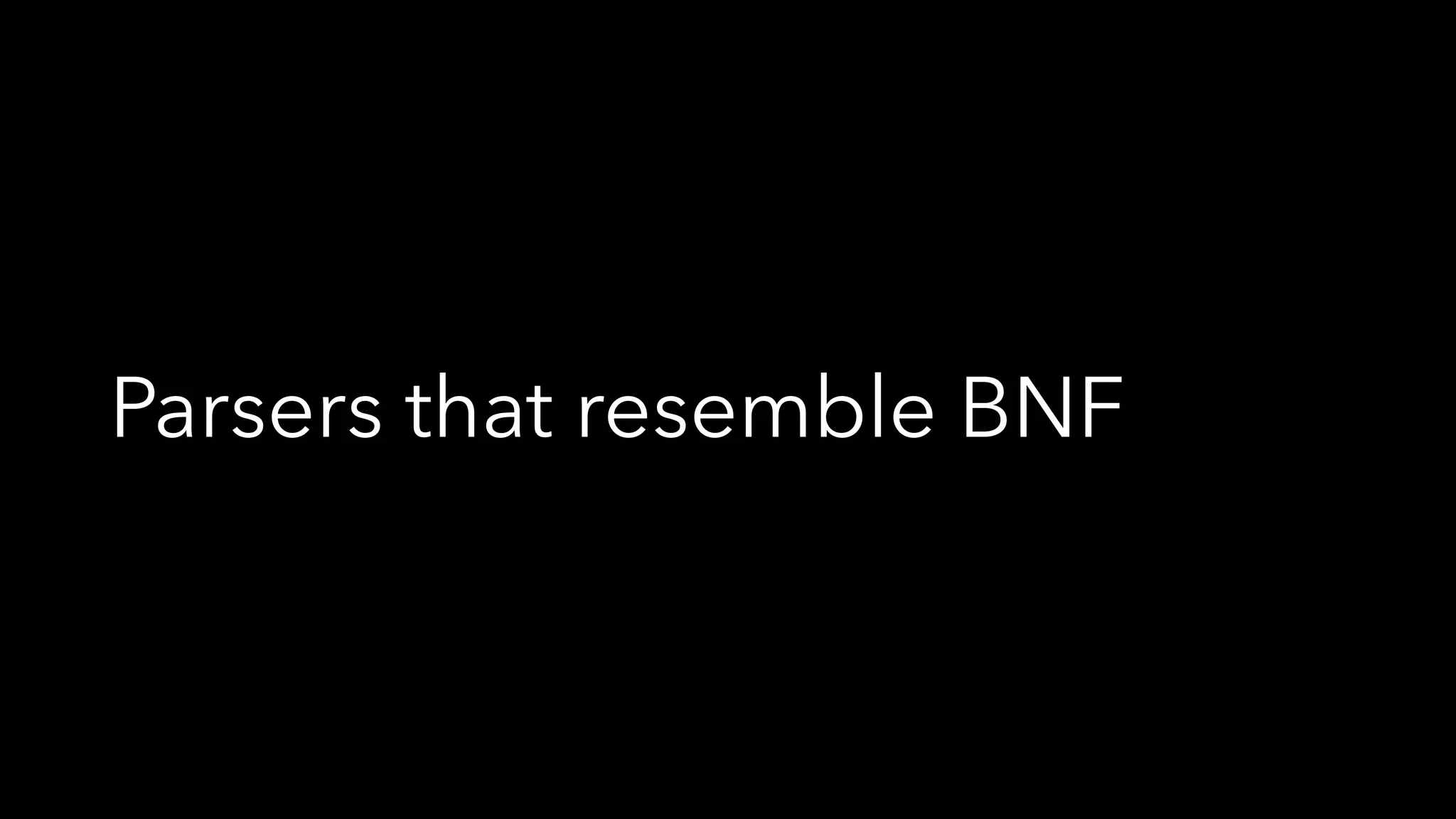
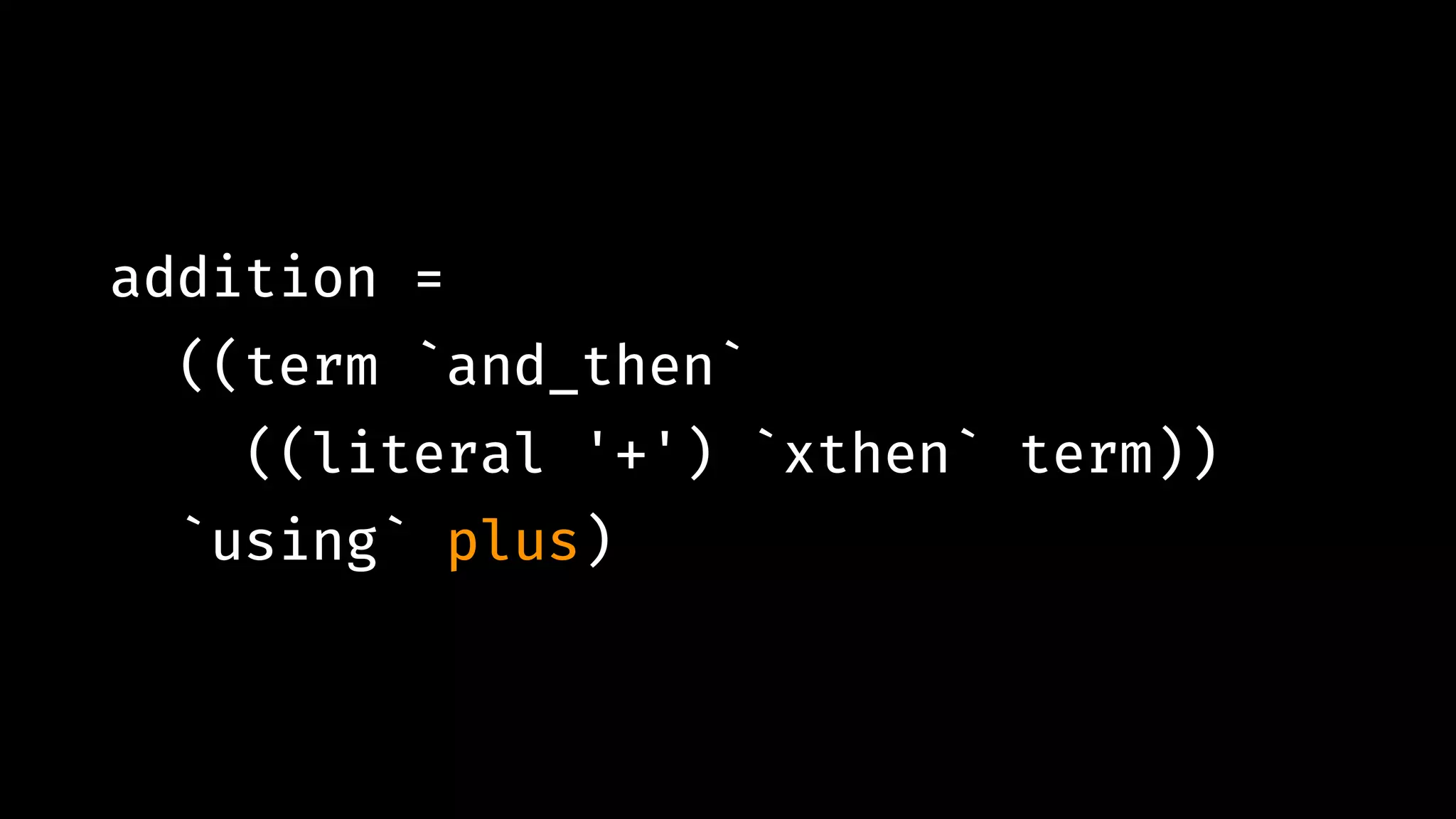
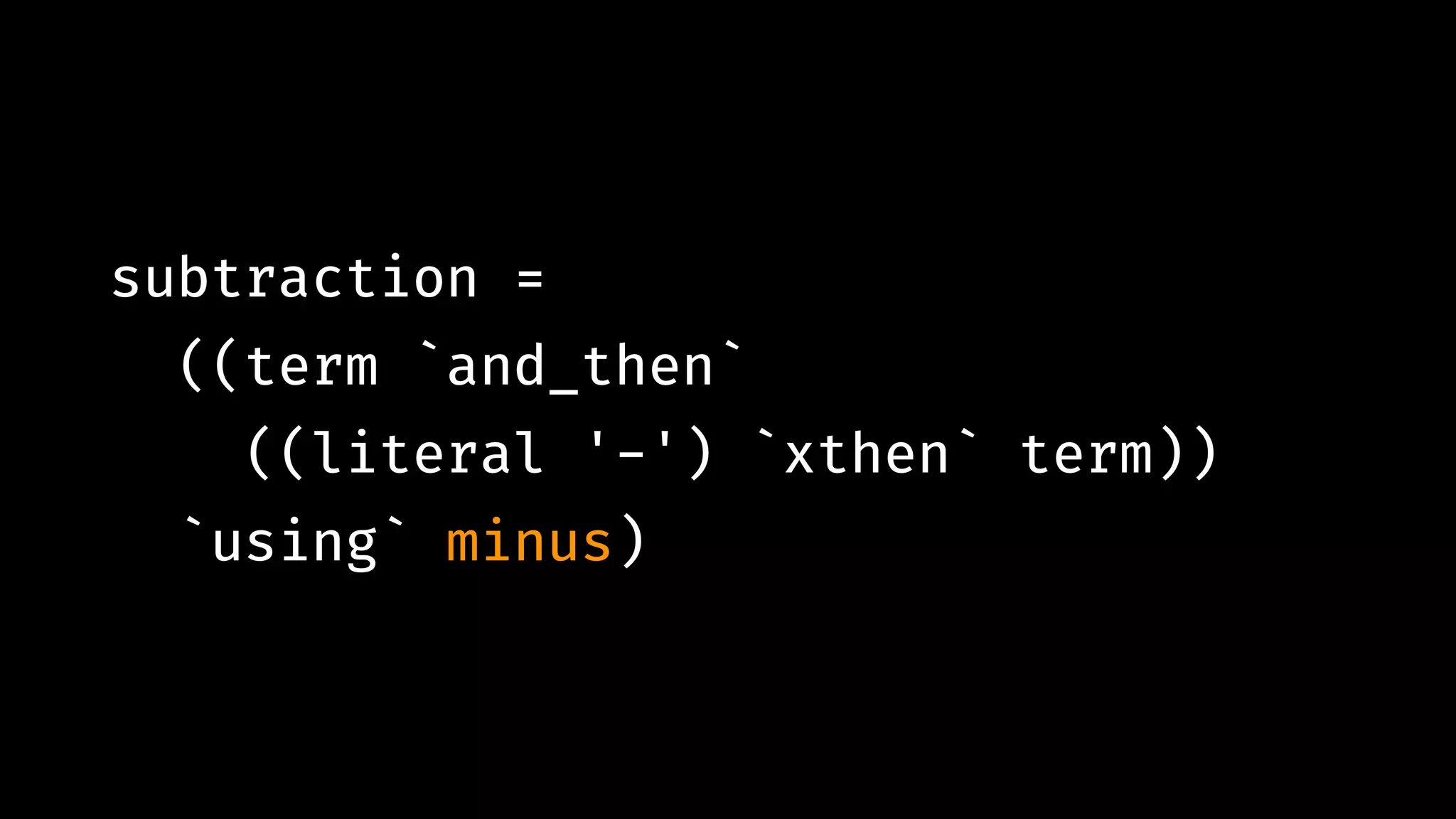
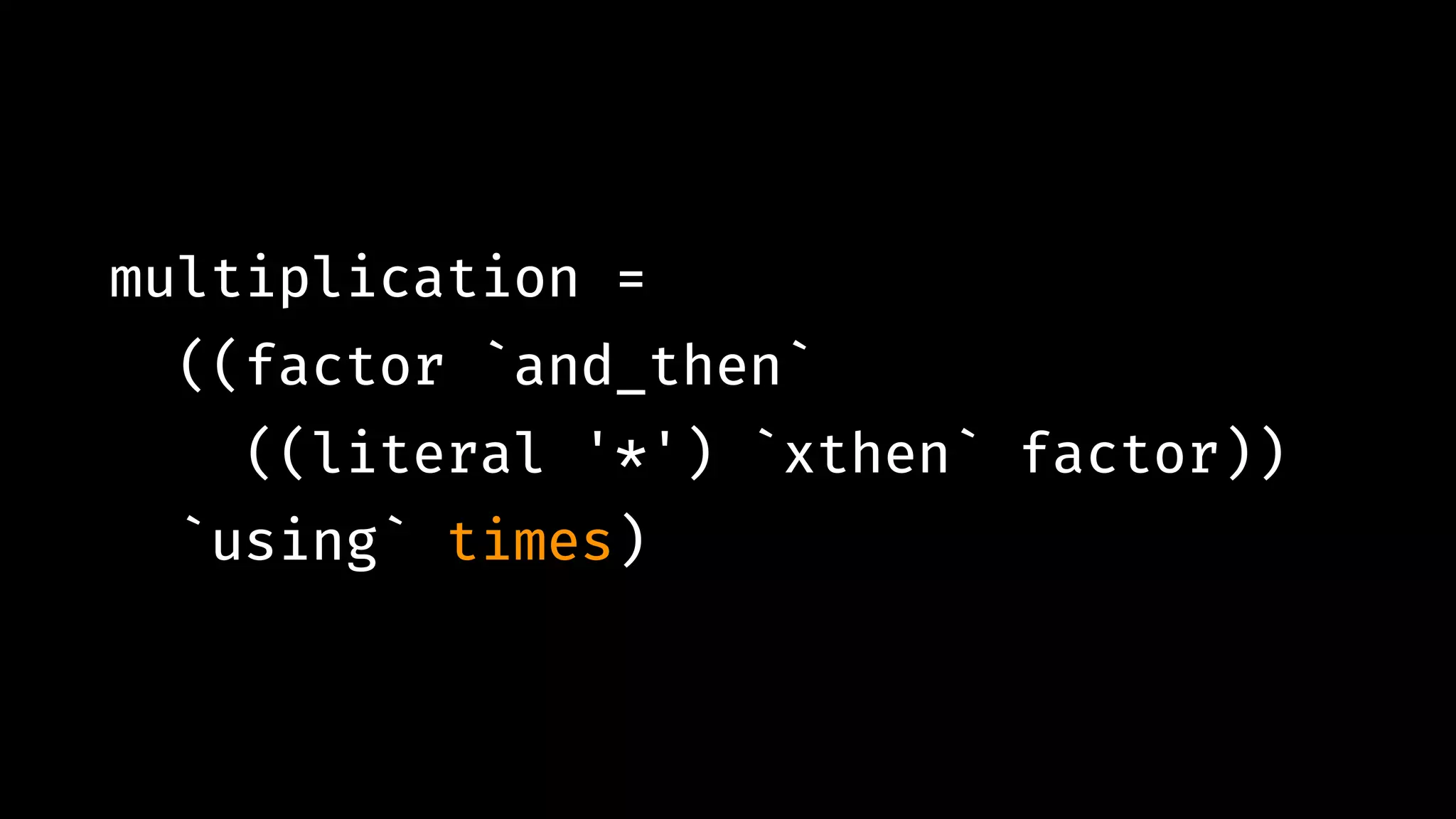
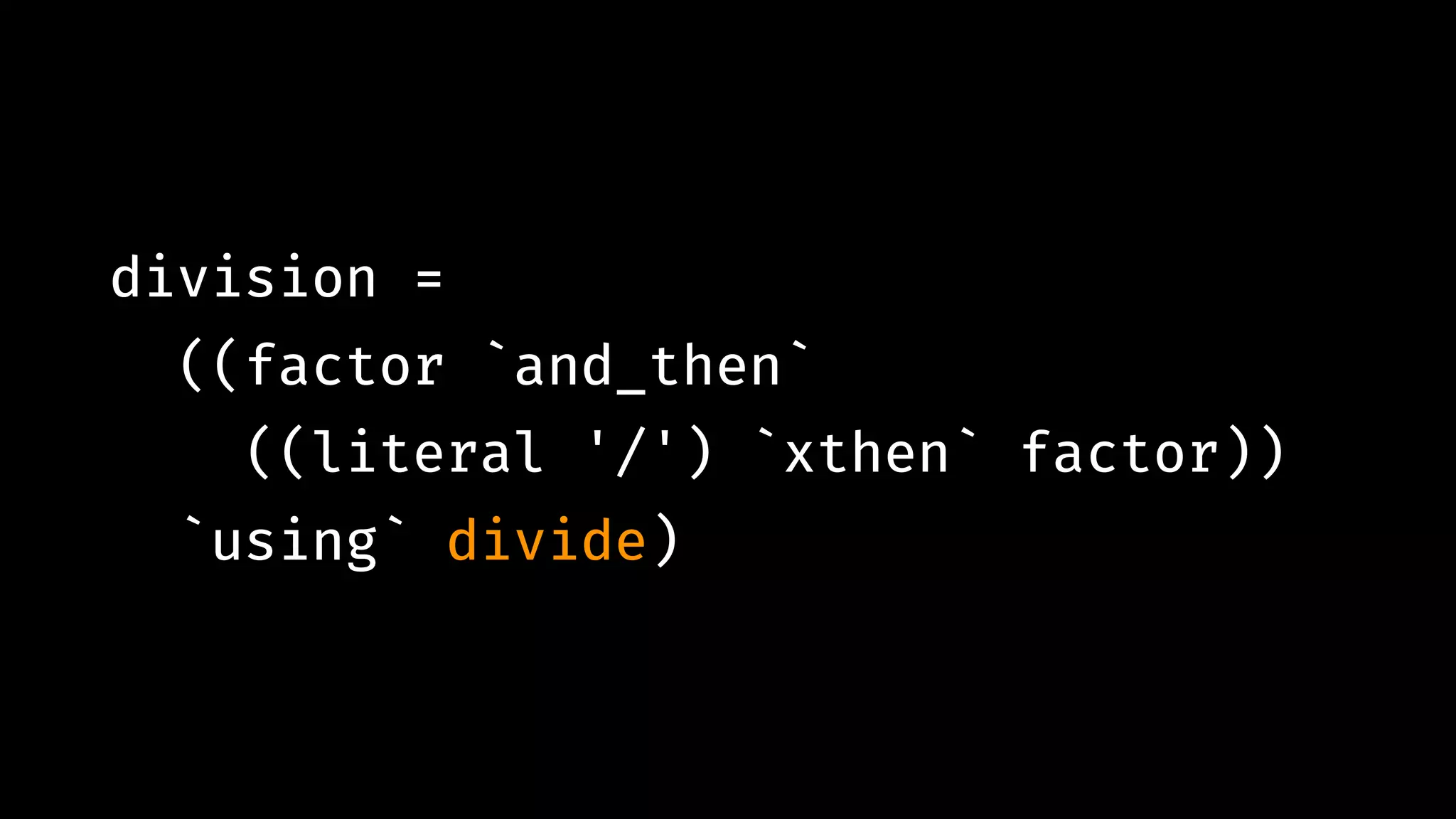
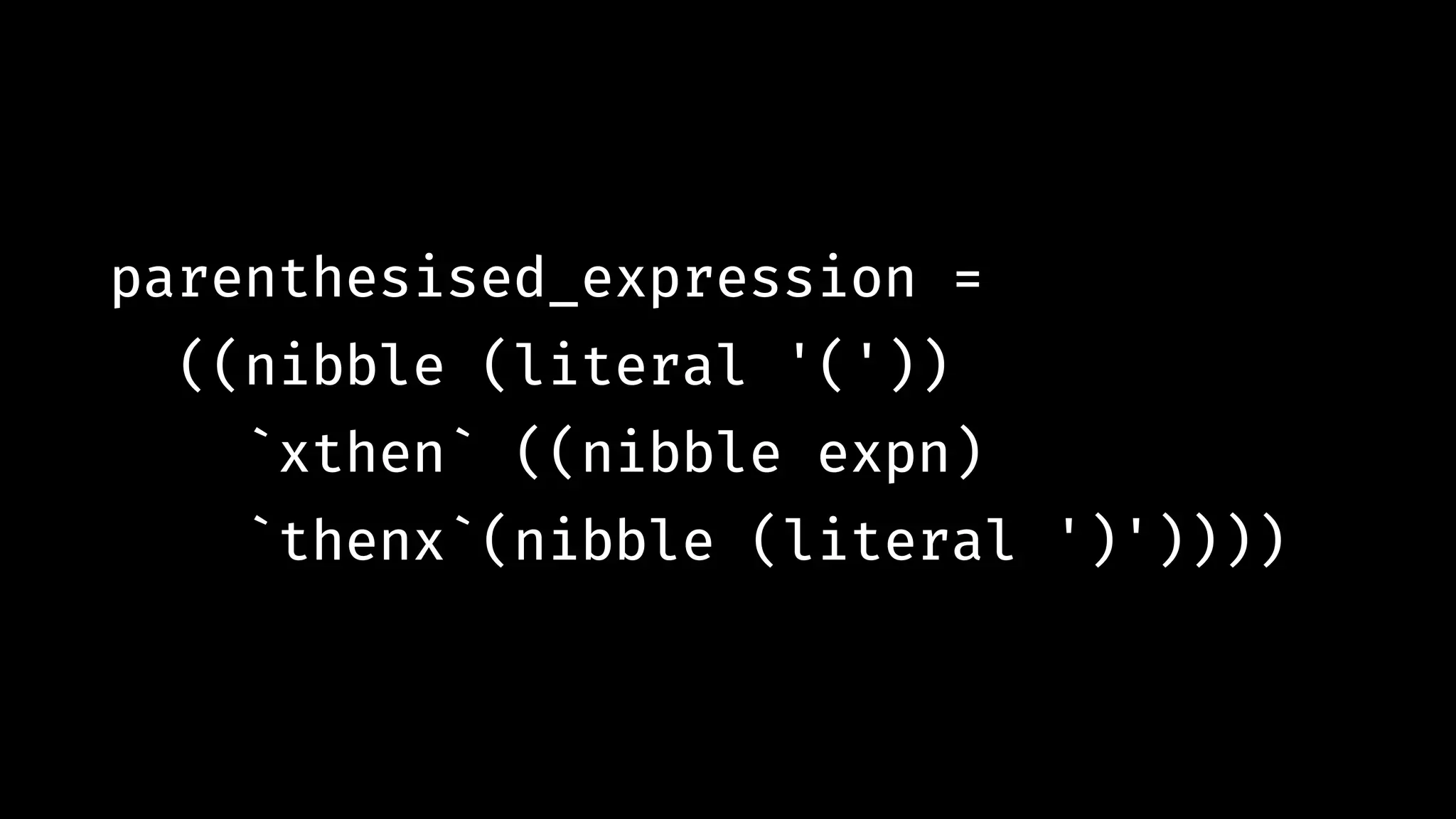
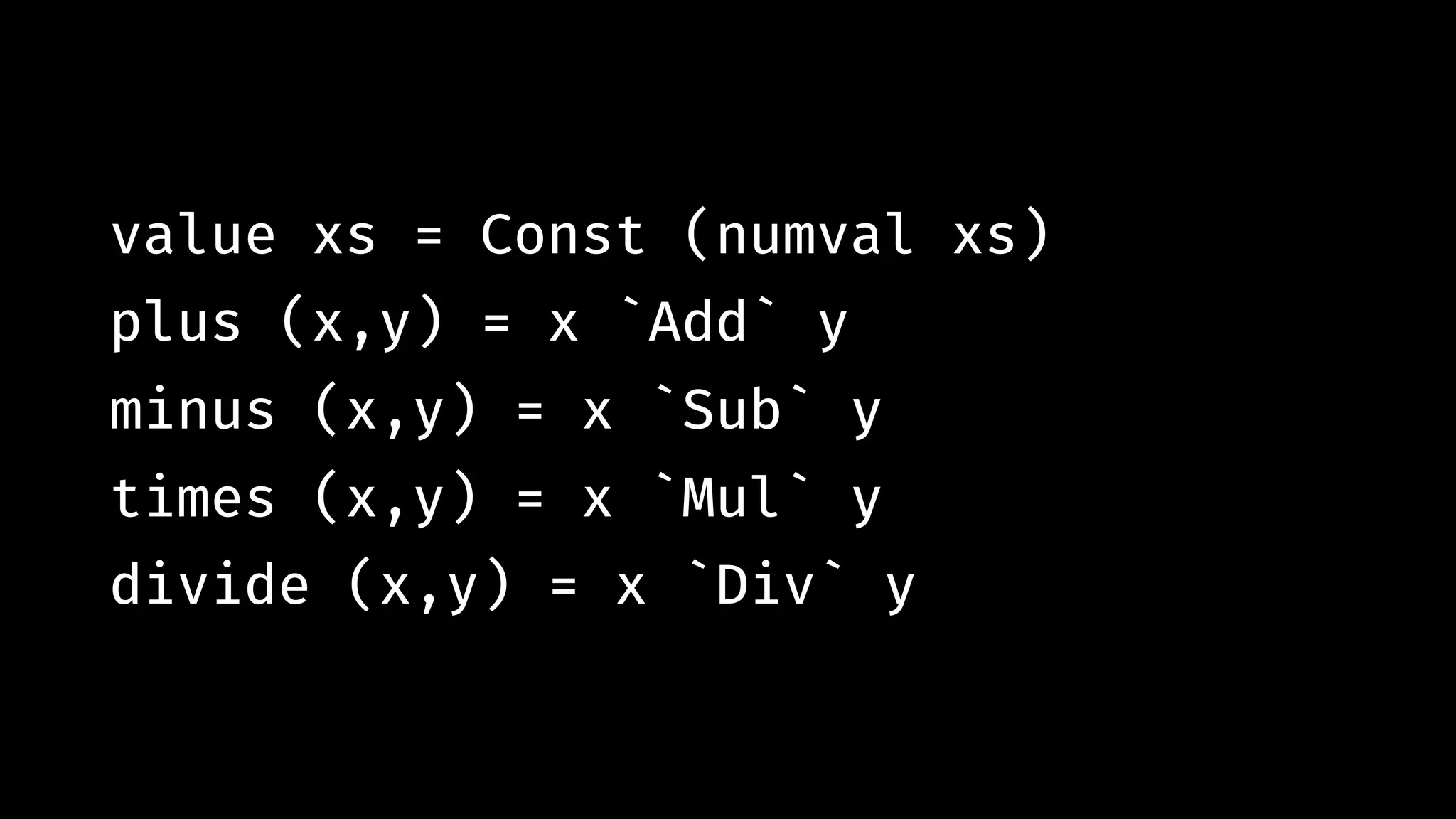
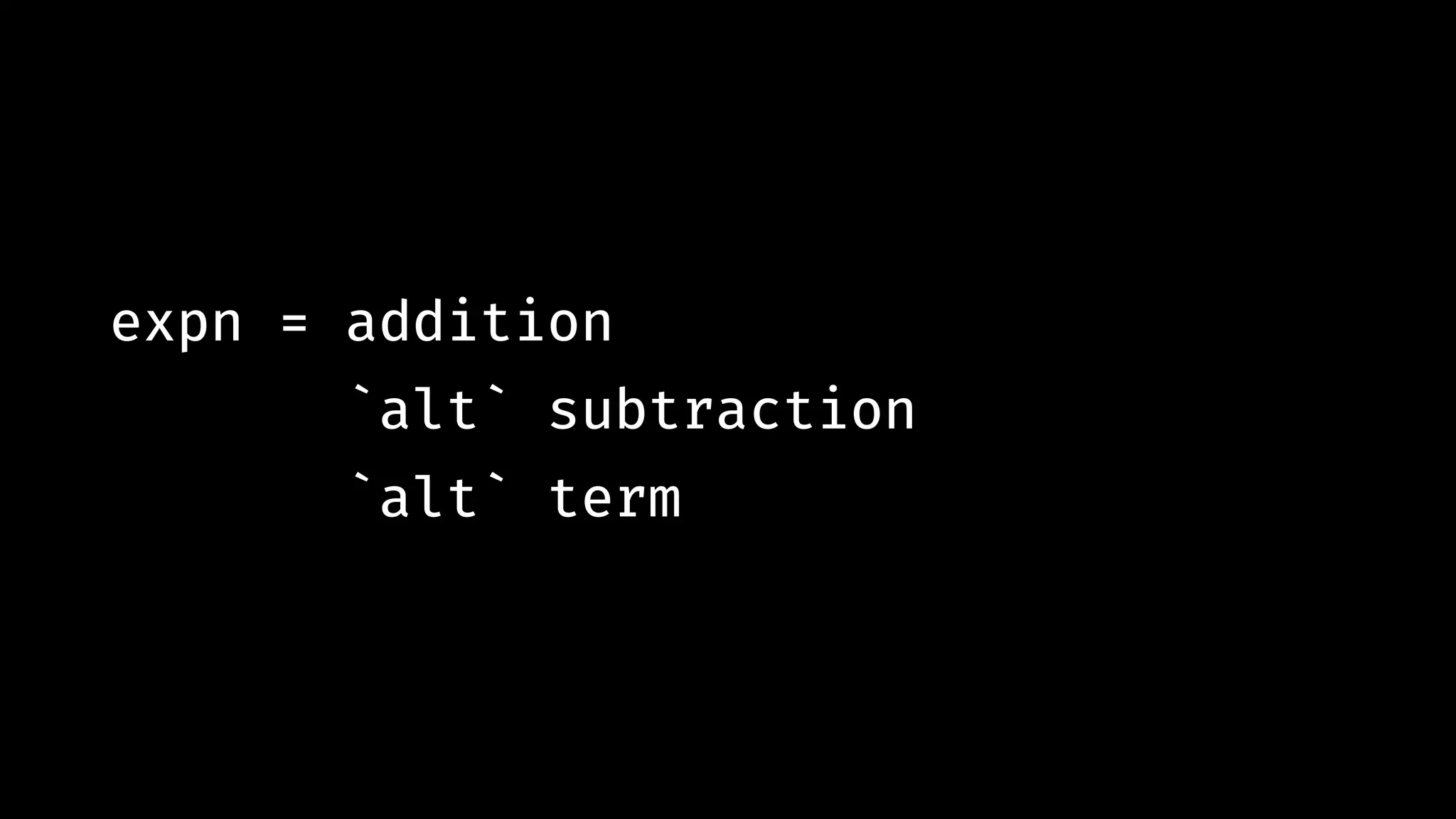
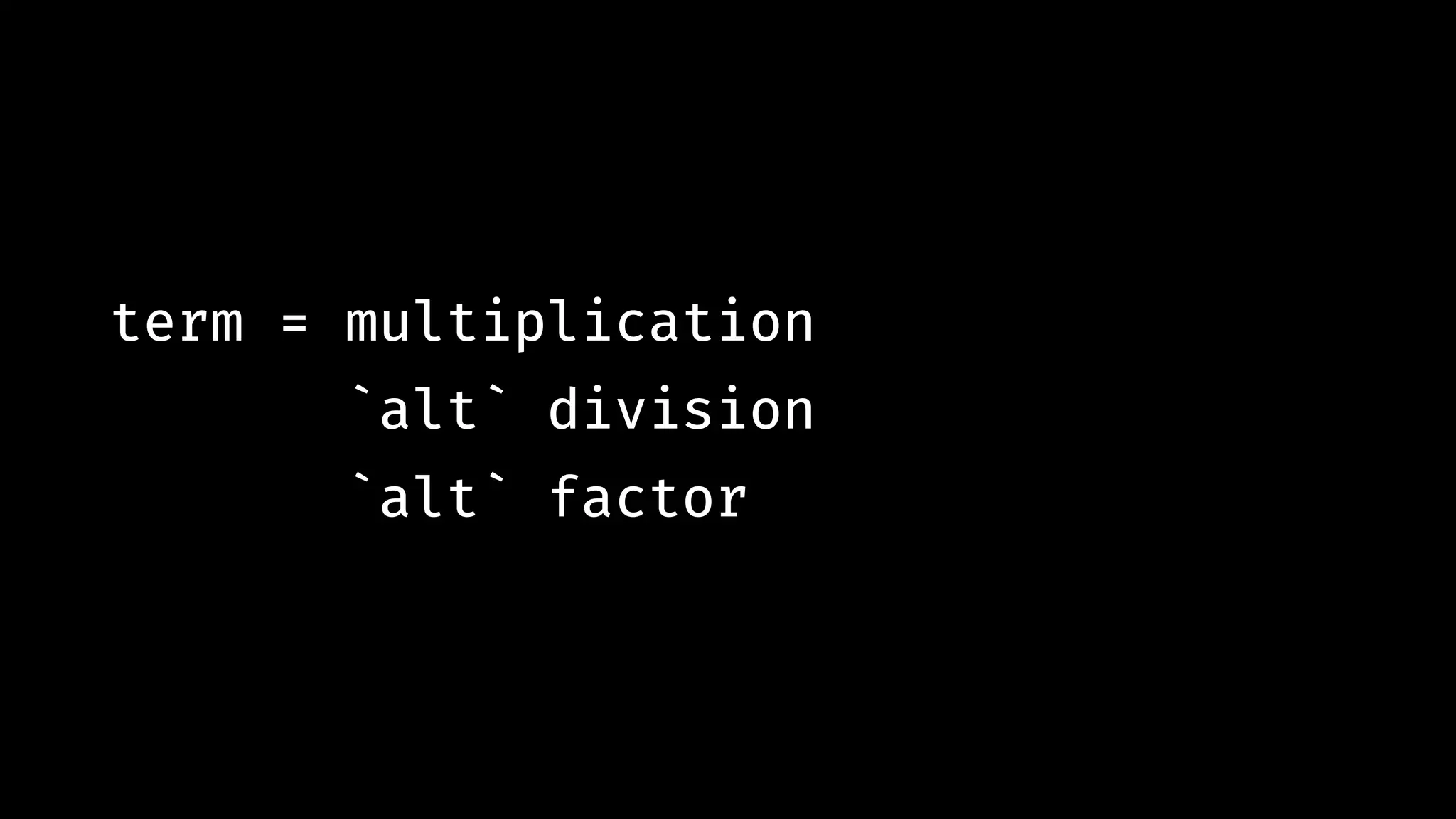
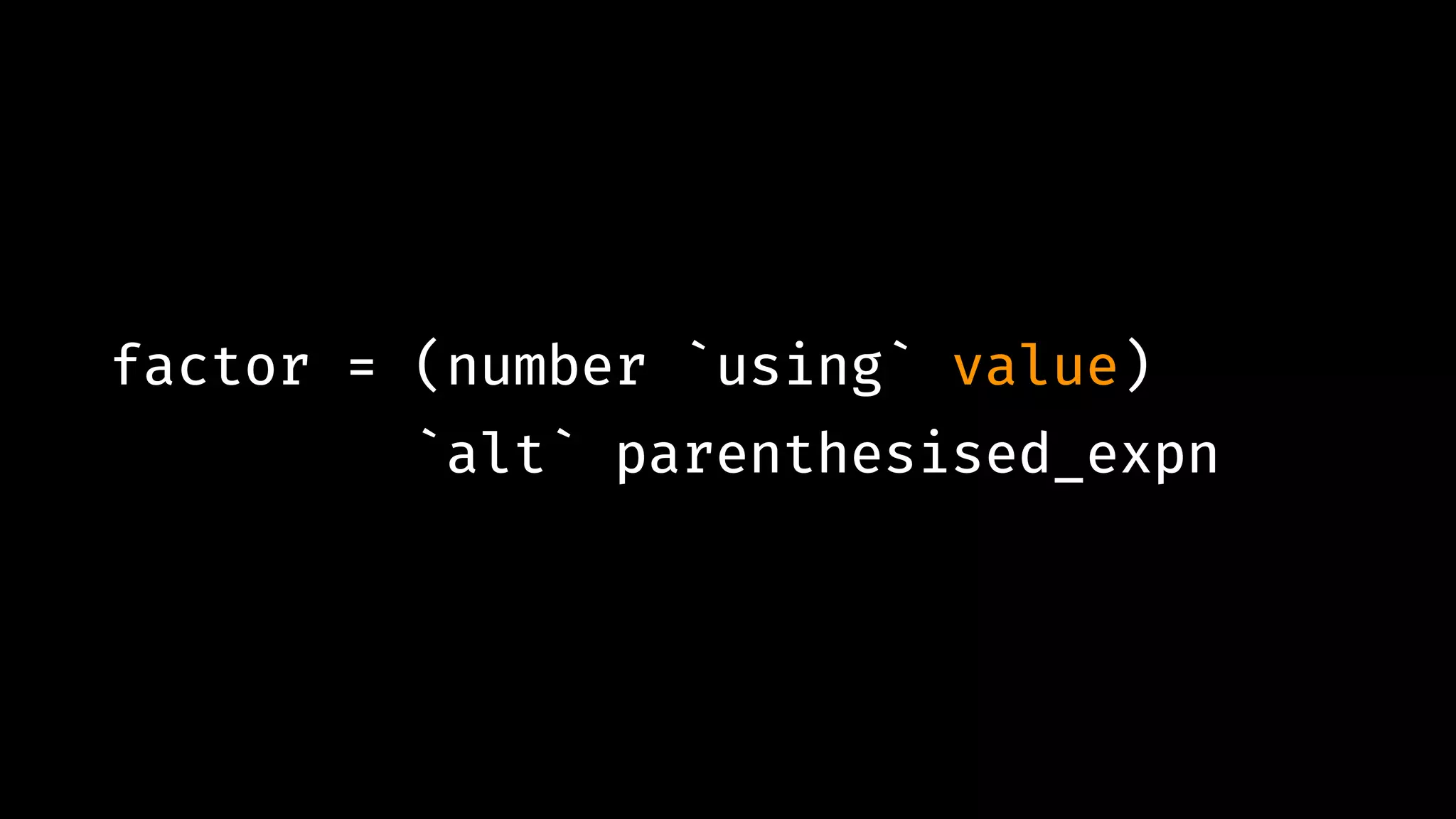
![expn "12*(5+(7-2))" # !=> [ (Const 12.0 `Mul` (Const 5.0 `Add` (Const 7.0 `Sub` Const 2.0)),""), … ]](https://image.slidesharecdn.com/combinatorparsing-180121101339/75/Combinator-parsing-93-2048.jpg)
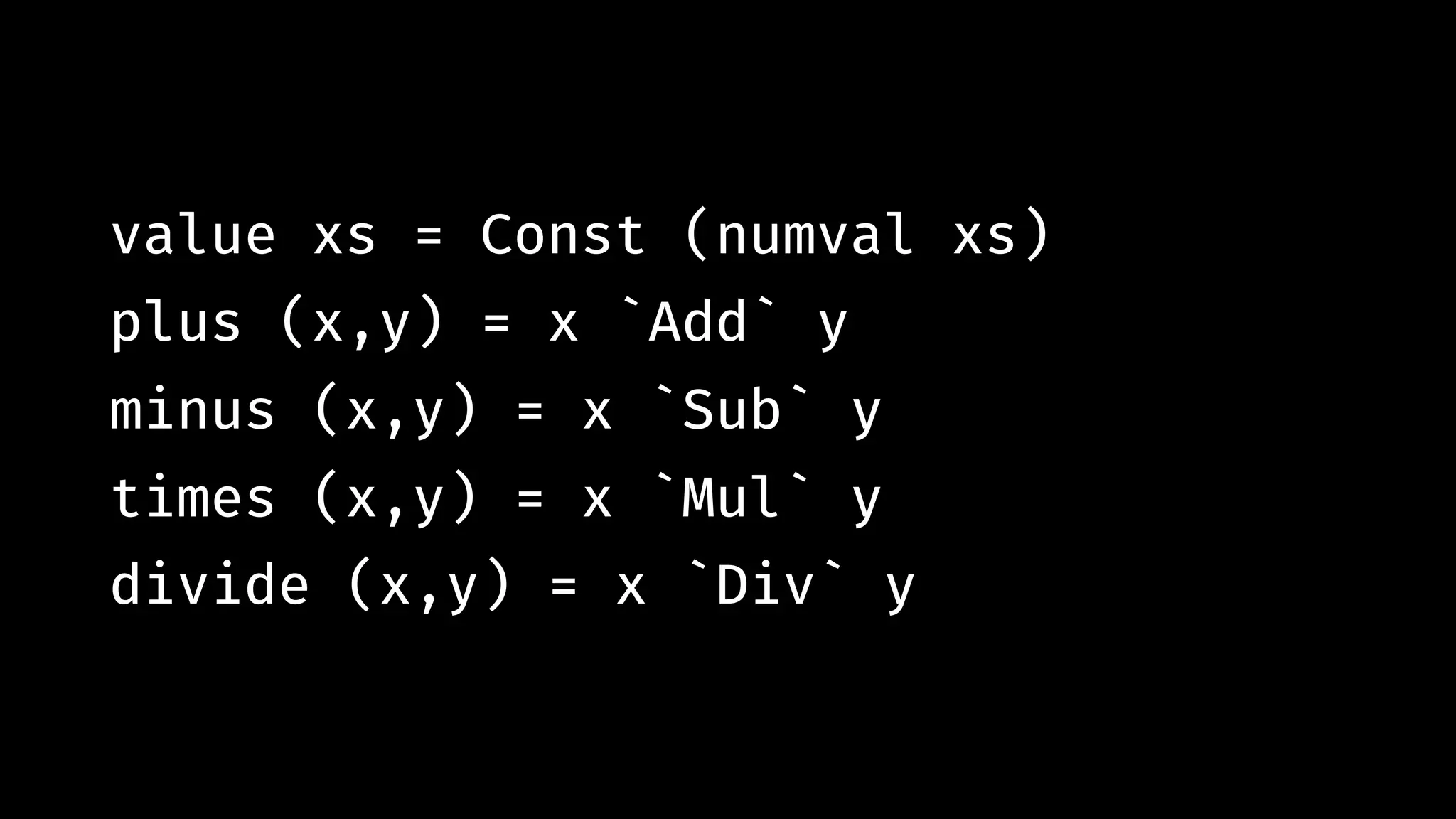
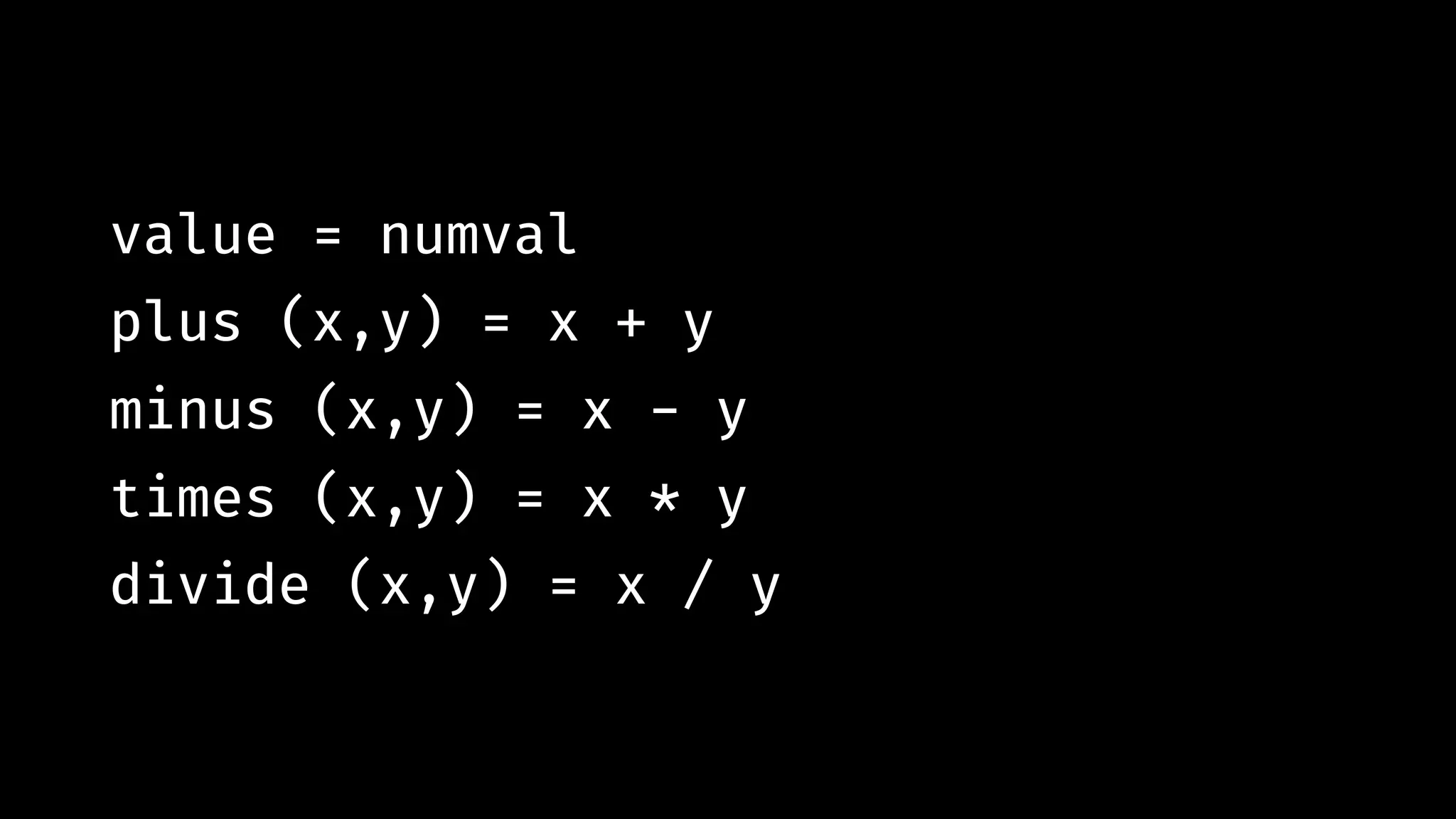
![expn "12*(5+(7-2))" # !=> [(120.0,""), (12.0,"*(5+(7-2))"), (1.0,"2*(5+(7-2))")]](https://image.slidesharecdn.com/combinatorparsing-180121101339/75/Combinator-parsing-96-2048.jpg)
![expn "(12+1)*(5+(7-2))" # !=> [(130.0,""), (13.0,"*(5+(7-2))")]](https://image.slidesharecdn.com/combinatorparsing-180121101339/75/Combinator-parsing-97-2048.jpg)


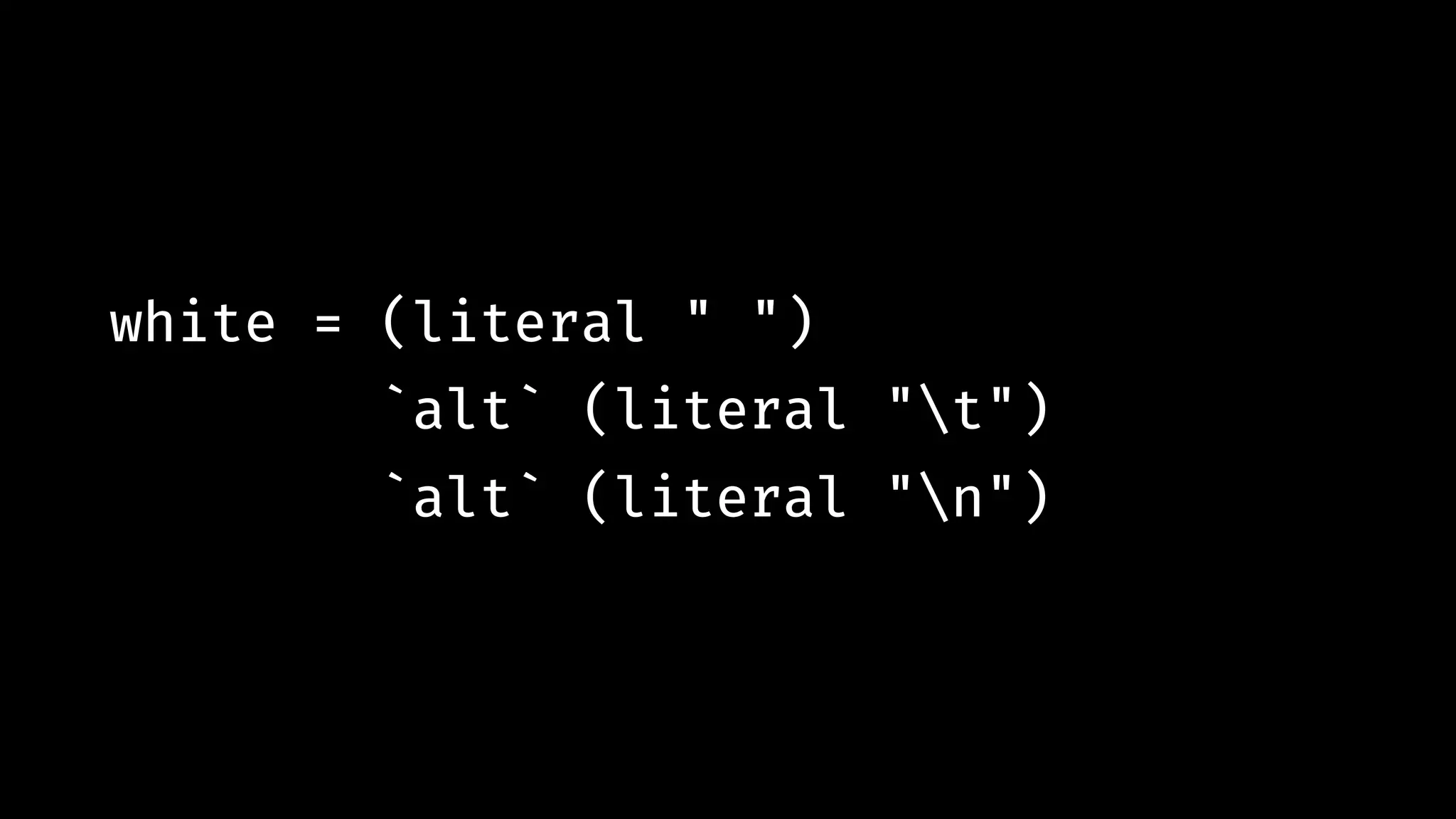
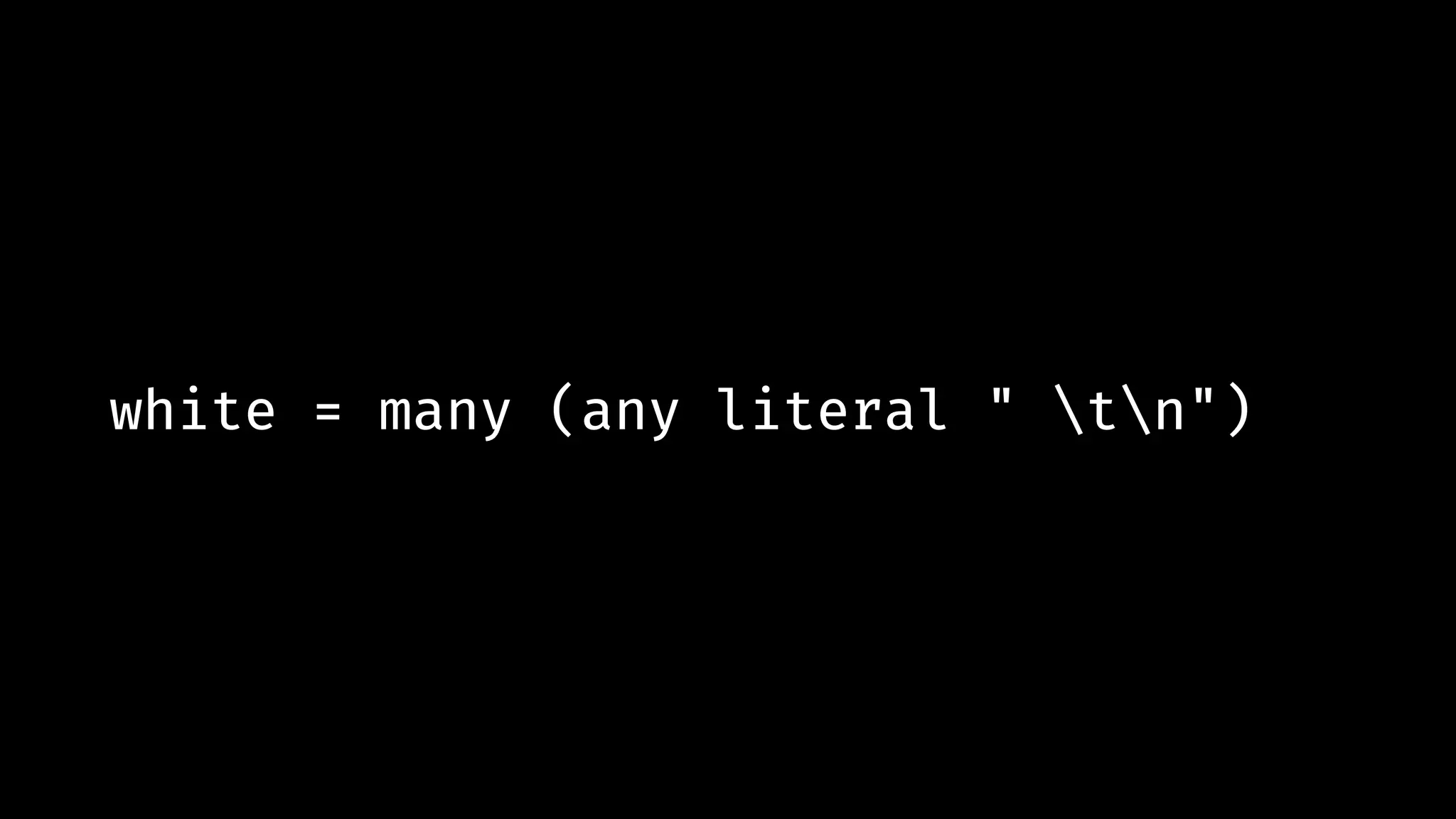

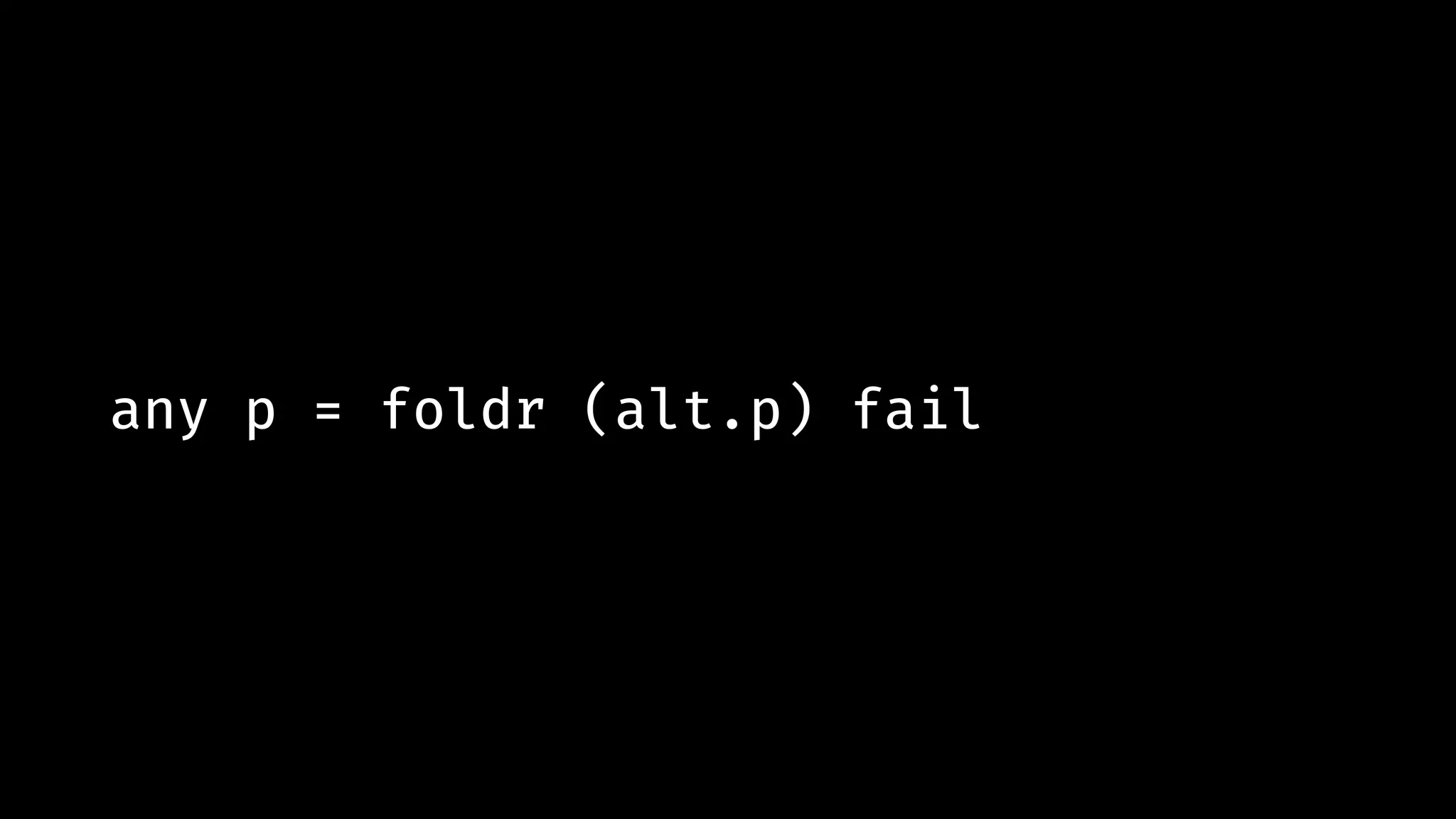
![any p [x1,x2,!!...,xn] = (p x1) `alt` (p x2) `alt` !!... `alt` (p xn)](https://image.slidesharecdn.com/combinatorparsing-180121101339/75/Combinator-parsing-104-2048.jpg)
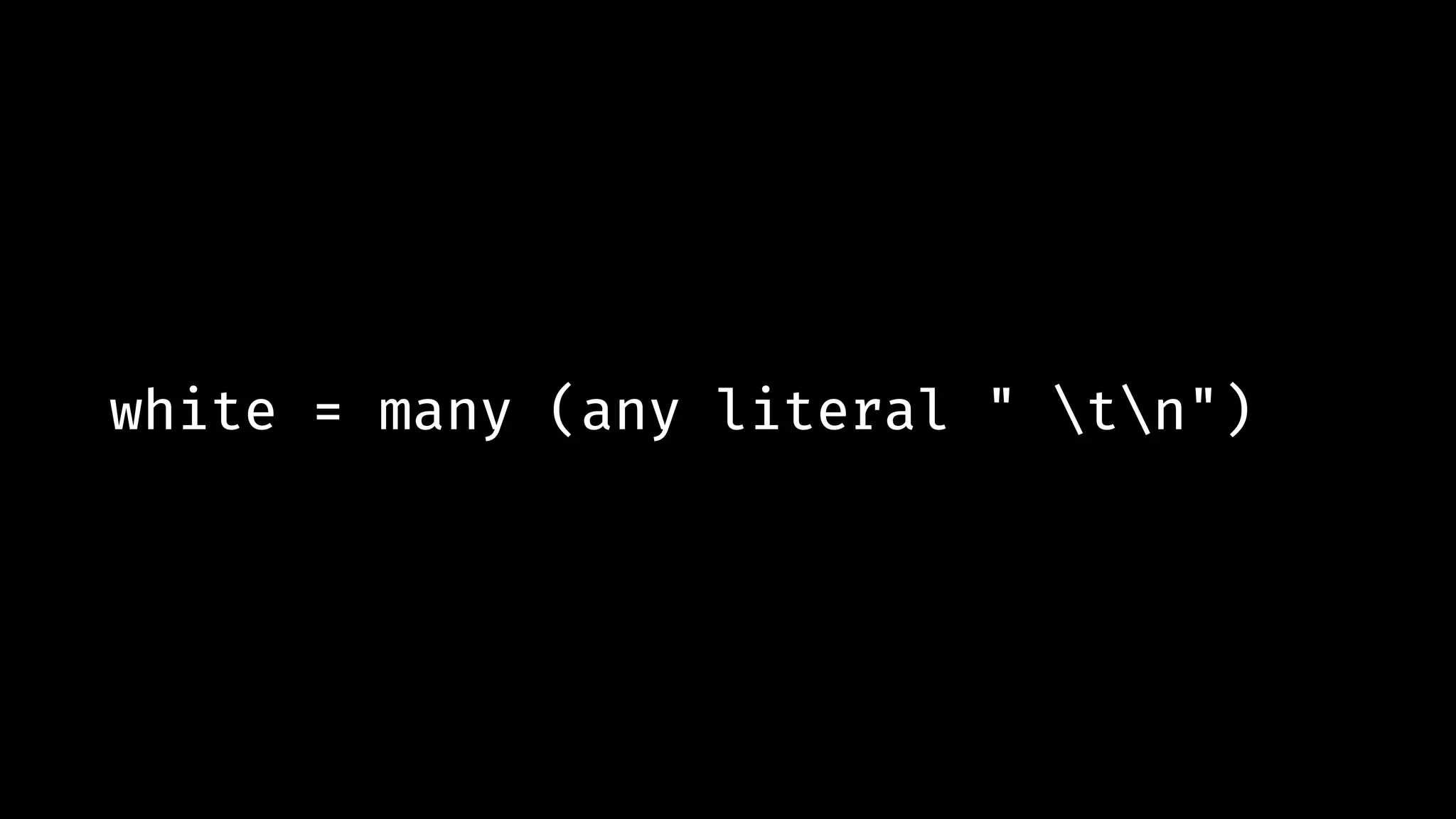
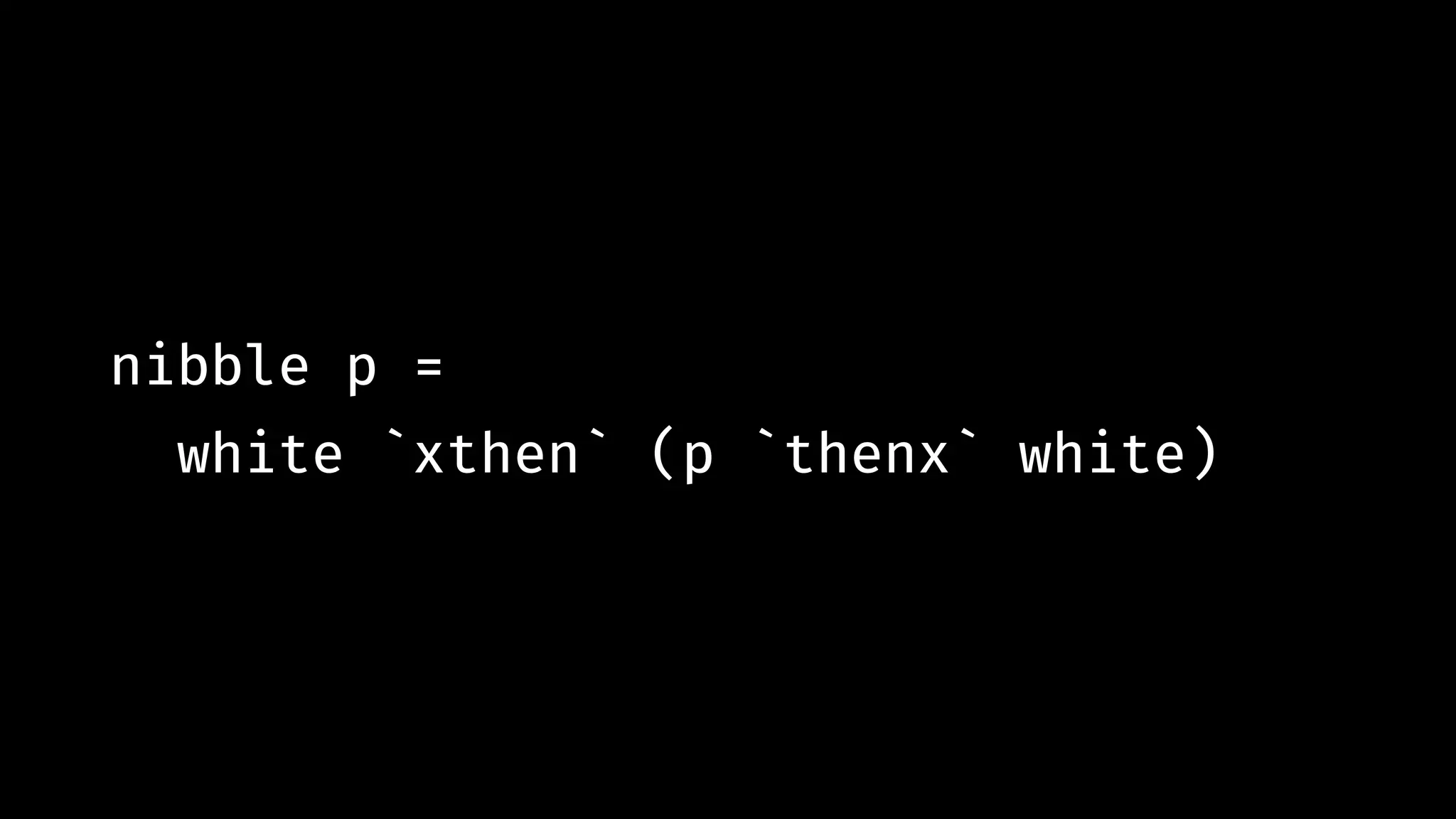
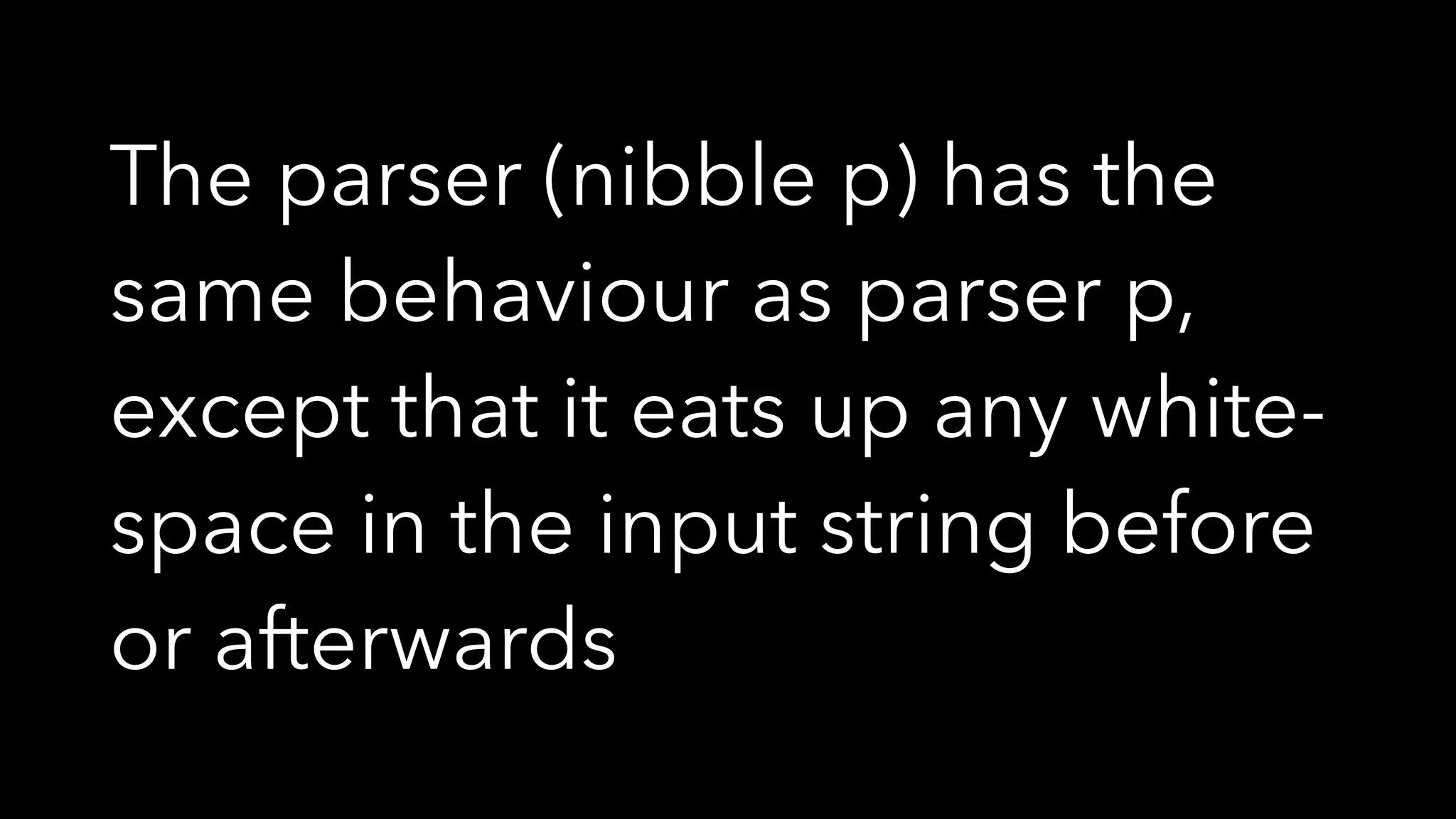
![(nibble (literal 'a')) " a " # !=> [('a',""),('a'," "),('a'," ")]](https://image.slidesharecdn.com/combinatorparsing-180121101339/75/Combinator-parsing-108-2048.jpg)
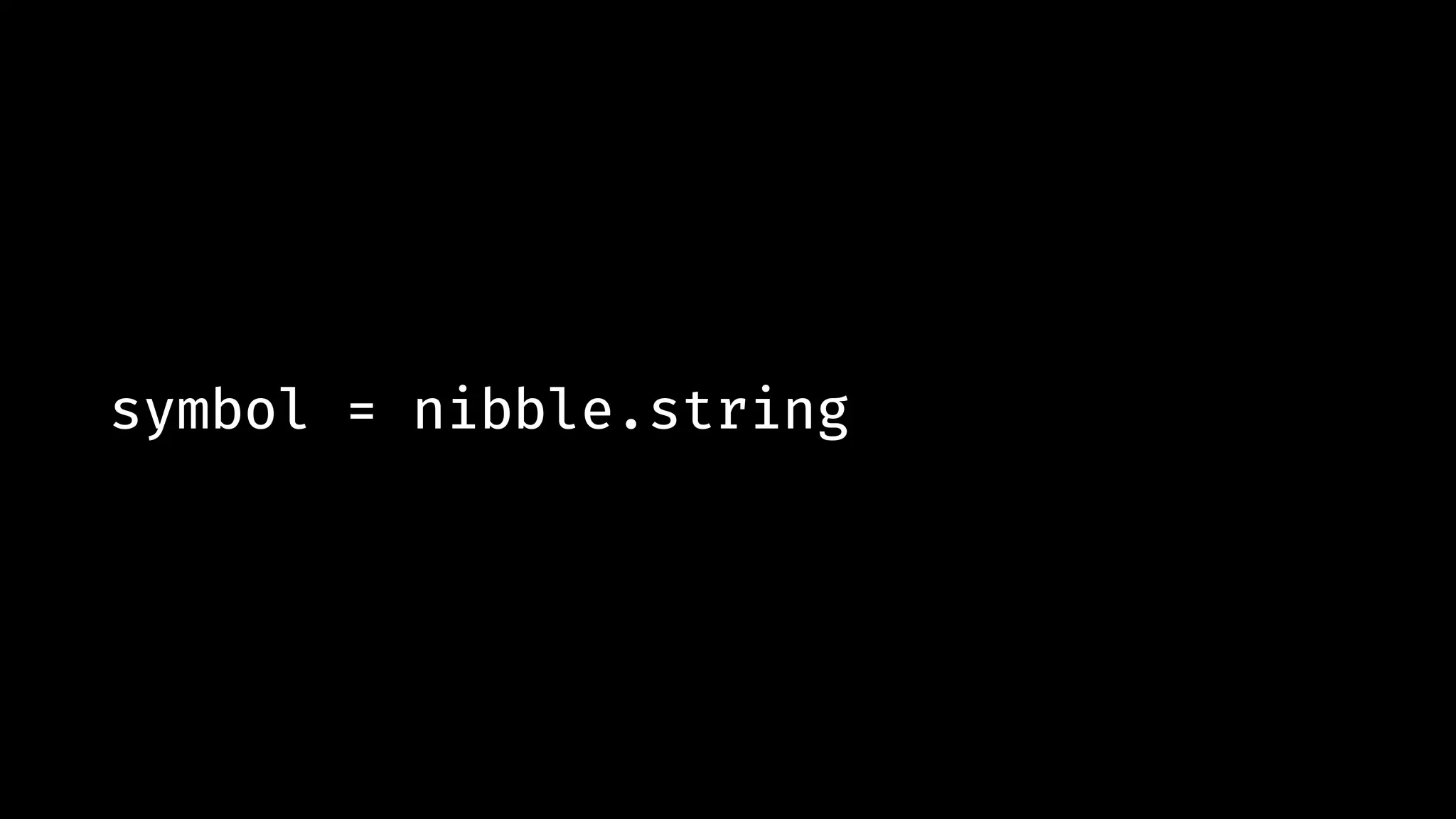
![symbol "$fold" " $fold " # !=> [("$fold", ""), ("$fold", " ")]](https://image.slidesharecdn.com/combinatorparsing-180121101339/75/Combinator-parsing-110-2048.jpg)
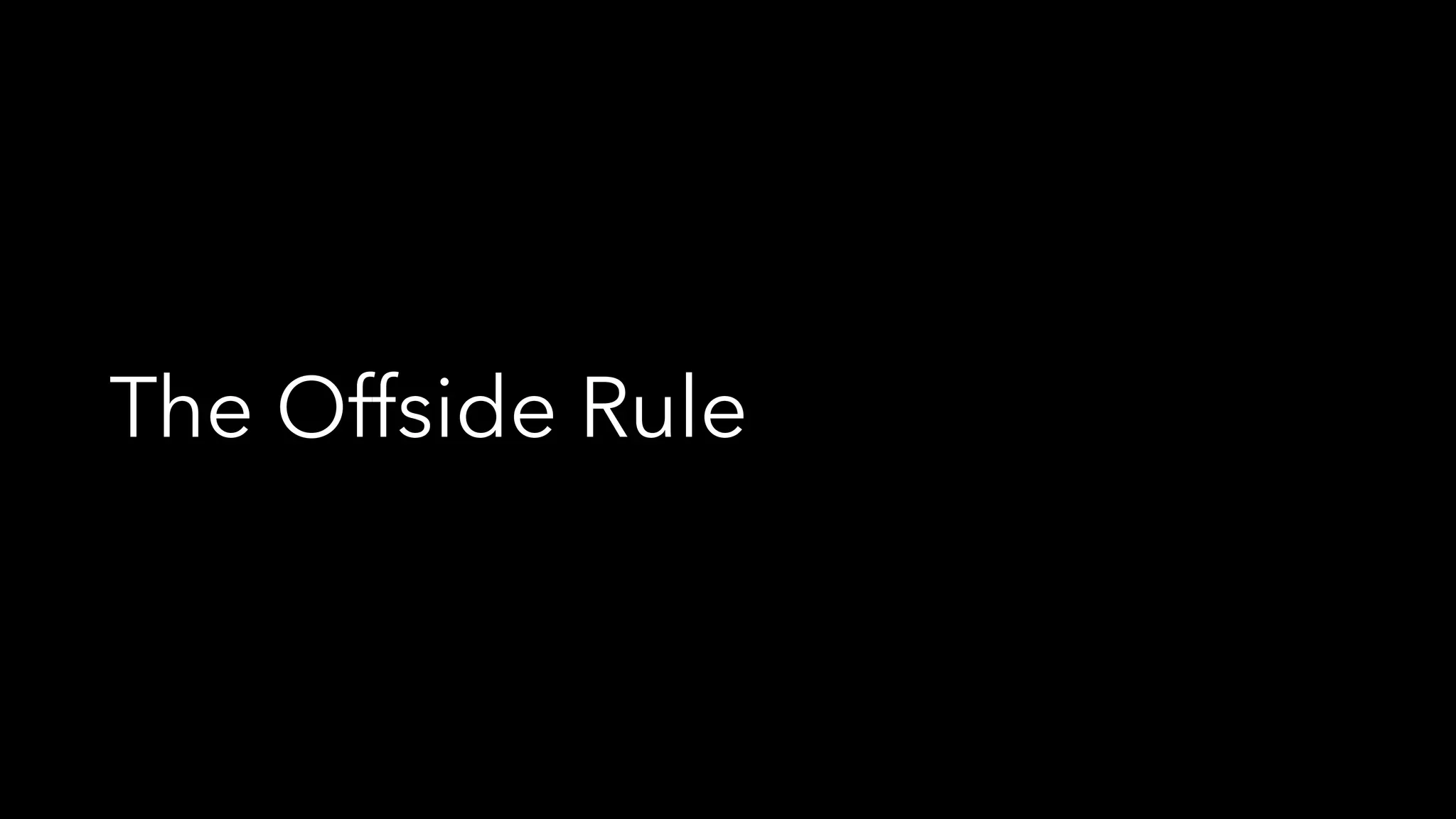
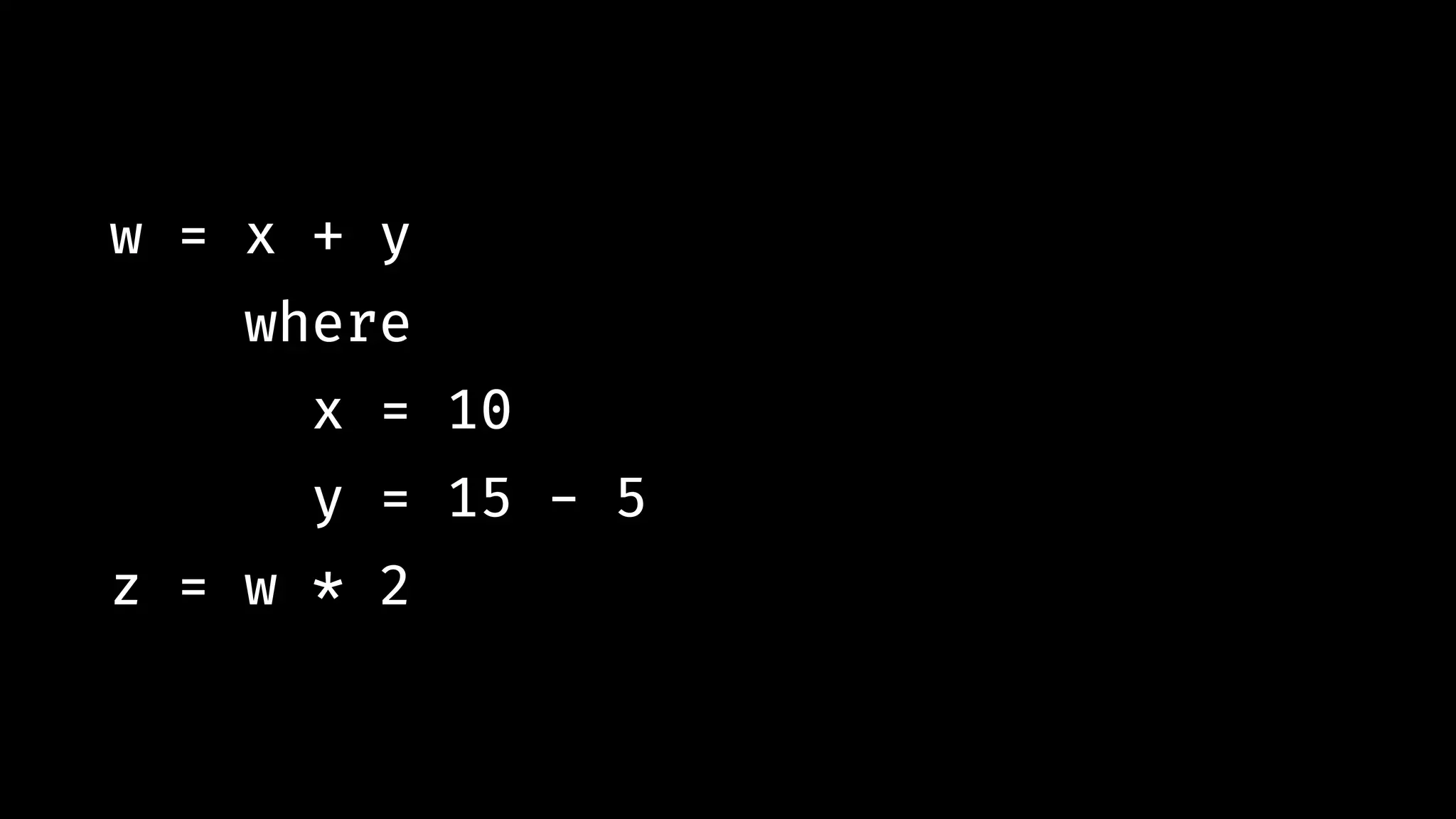
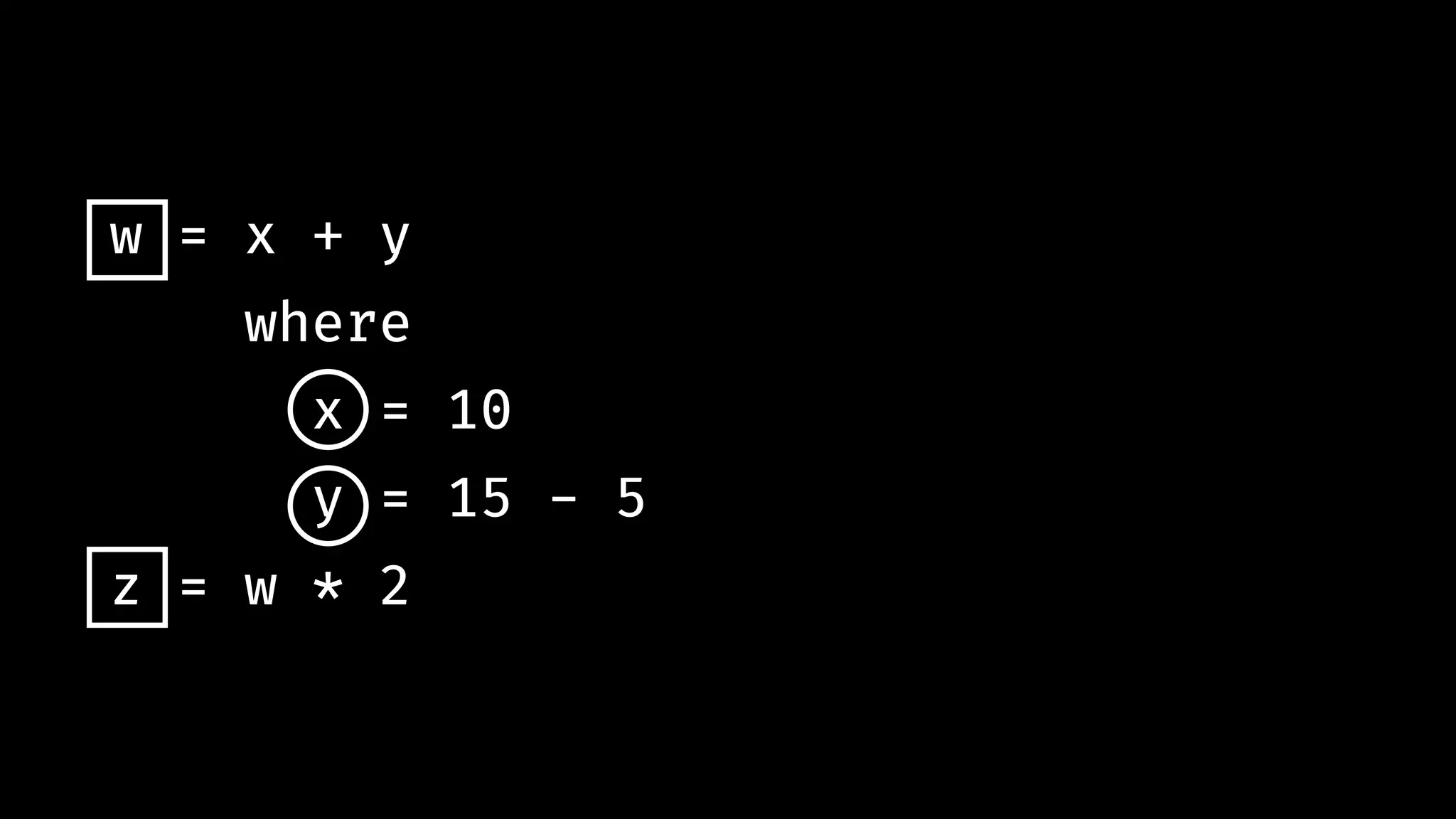
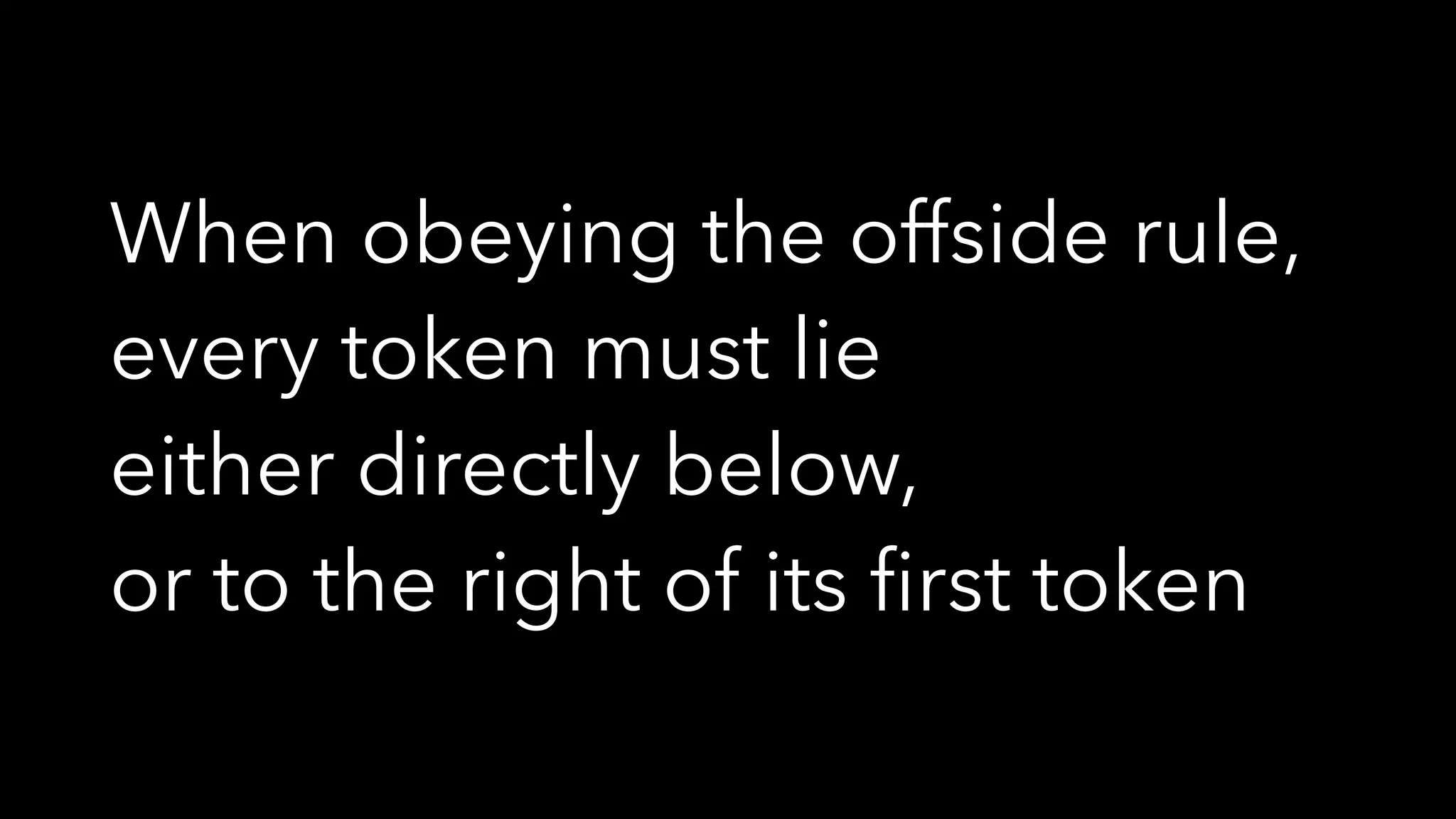
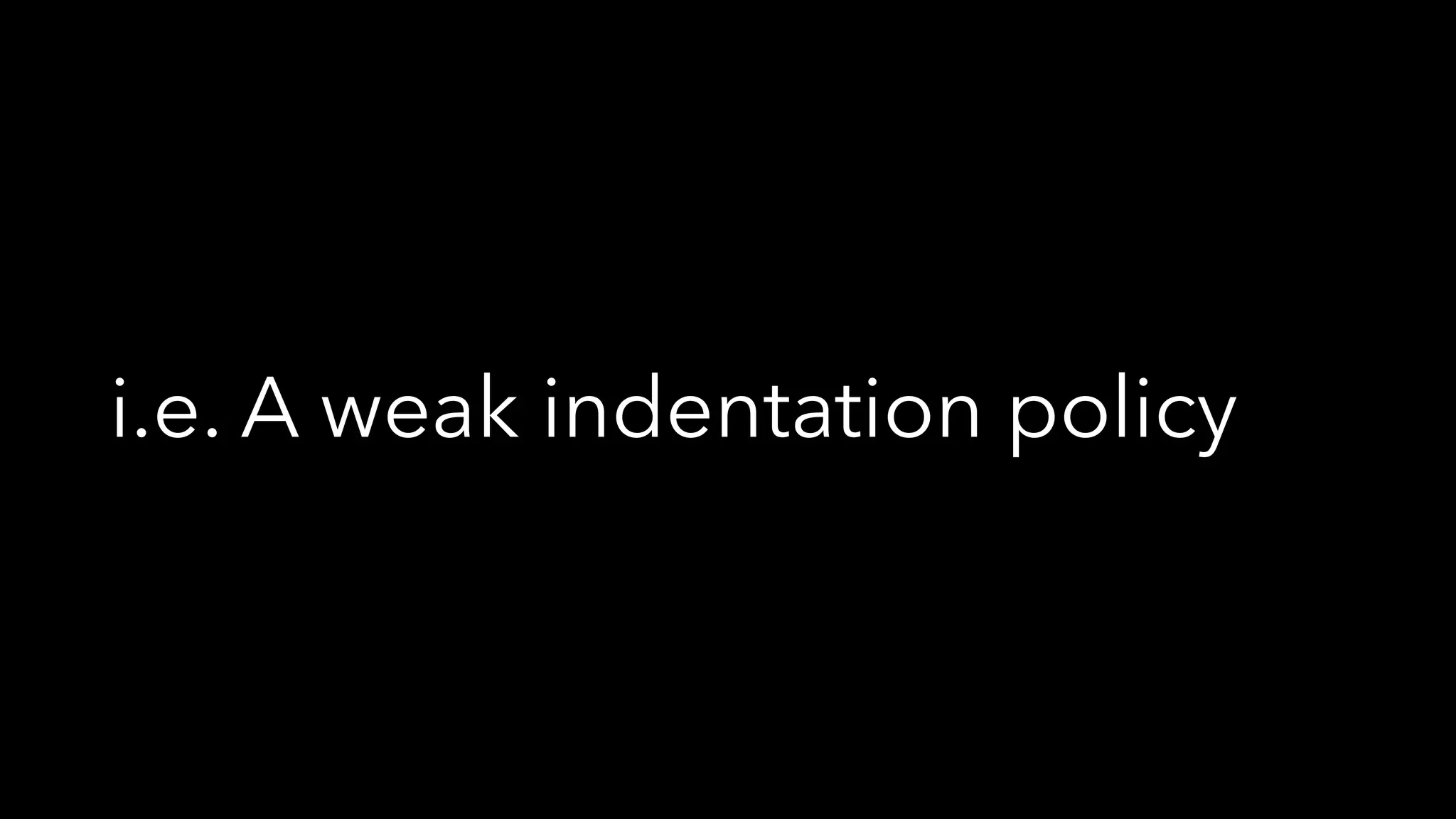
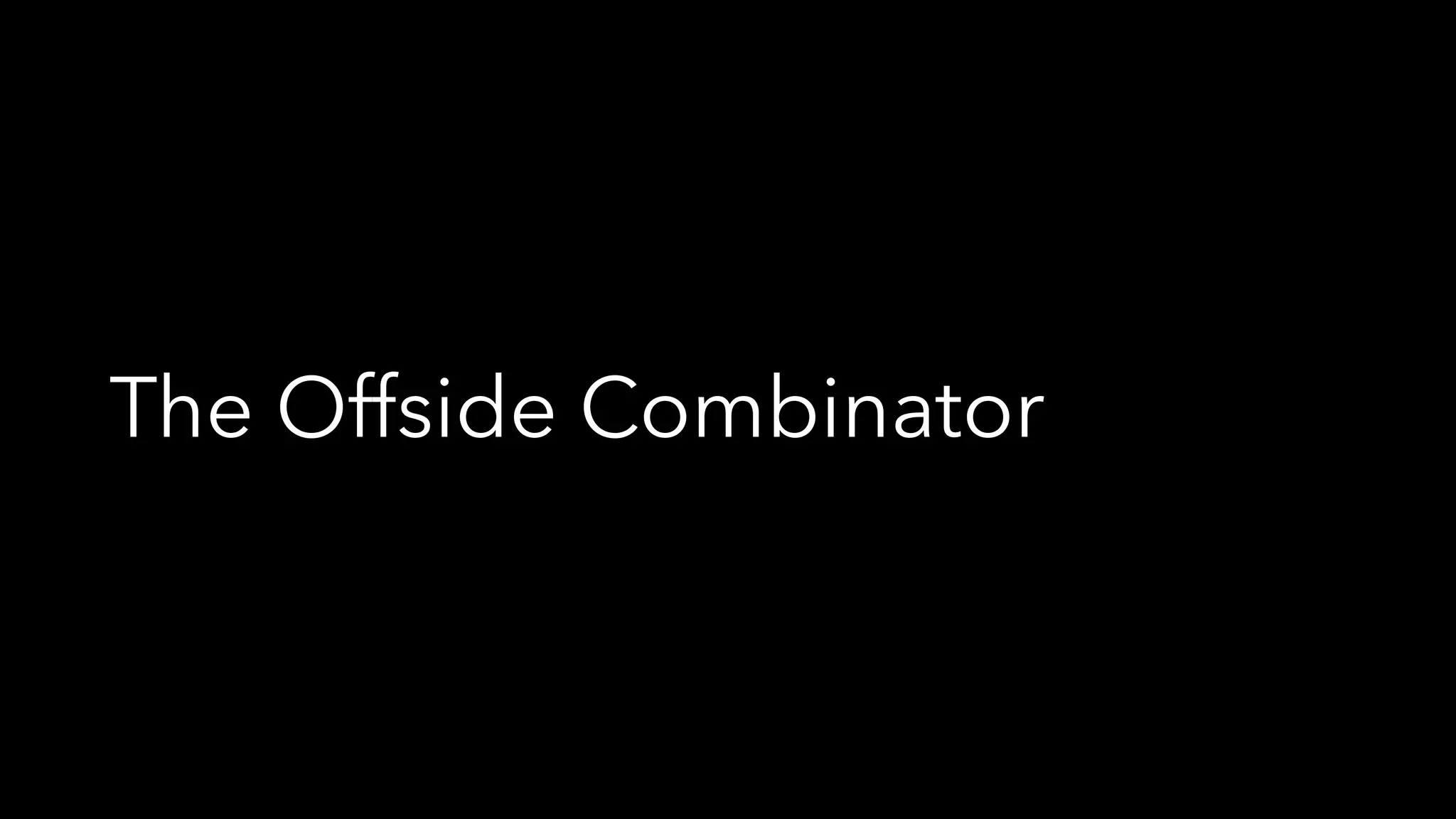
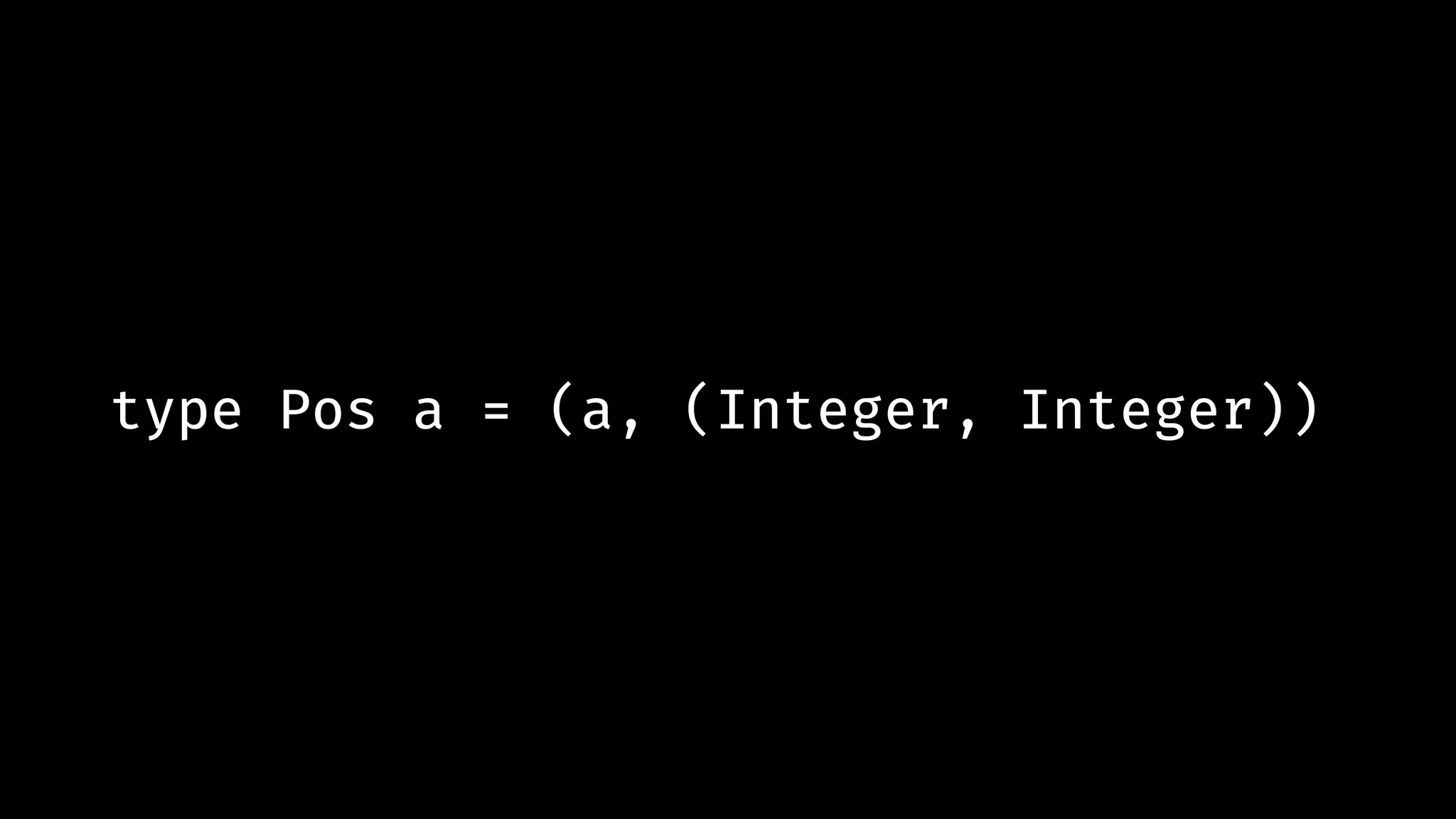
![prelex "3 + n 2 * (4 + 5)" # !=> [('3',(0,0)), ('+',(0,2)), ('2',(1,2)), ('*',(1,4)), … ]](https://image.slidesharecdn.com/combinatorparsing-180121101339/75/Combinator-parsing-118-2048.jpg)
![satisfy !:: (a !-> Bool) !-> Parser a a satisfy p [] = failure [] satisfy p (x:xs) | p x = succeed x xs !-- if p(x) is true | otherwise = failure []](https://image.slidesharecdn.com/combinatorparsing-180121101339/75/Combinator-parsing-119-2048.jpg)
![satisfy !:: (a !-> Bool) !-> Parser (Pos a) a satisfy p [] = failure [] satisfy p (x:xs) | p a = succeed a xs !-- if p(a) is true | otherwise = failure [] where (a, (r, c)) = x](https://image.slidesharecdn.com/combinatorparsing-180121101339/75/Combinator-parsing-120-2048.jpg)
![satisfy !:: (a !-> Bool) !-> Parser (Pos a) a satisfy p [] = failure [] satisfy p (x:xs) | p a = succeed a xs !-- if p(a) is true | otherwise = failure [] where (a, (r, c)) = x](https://image.slidesharecdn.com/combinatorparsing-180121101339/75/Combinator-parsing-121-2048.jpg)
![offside !:: Parser (Pos a) b !-> Parser (Pos a) b offside p inp = [(v, inpOFF) | (v, []) !<- (p inpON)] where inpON = takeWhile (onside (head inp)) inp inpOFF = drop (length inpON) inp onside (a, (r, c)) (b, (r', c')) = r' !>= r !&& c' !>= c](https://image.slidesharecdn.com/combinatorparsing-180121101339/75/Combinator-parsing-122-2048.jpg)
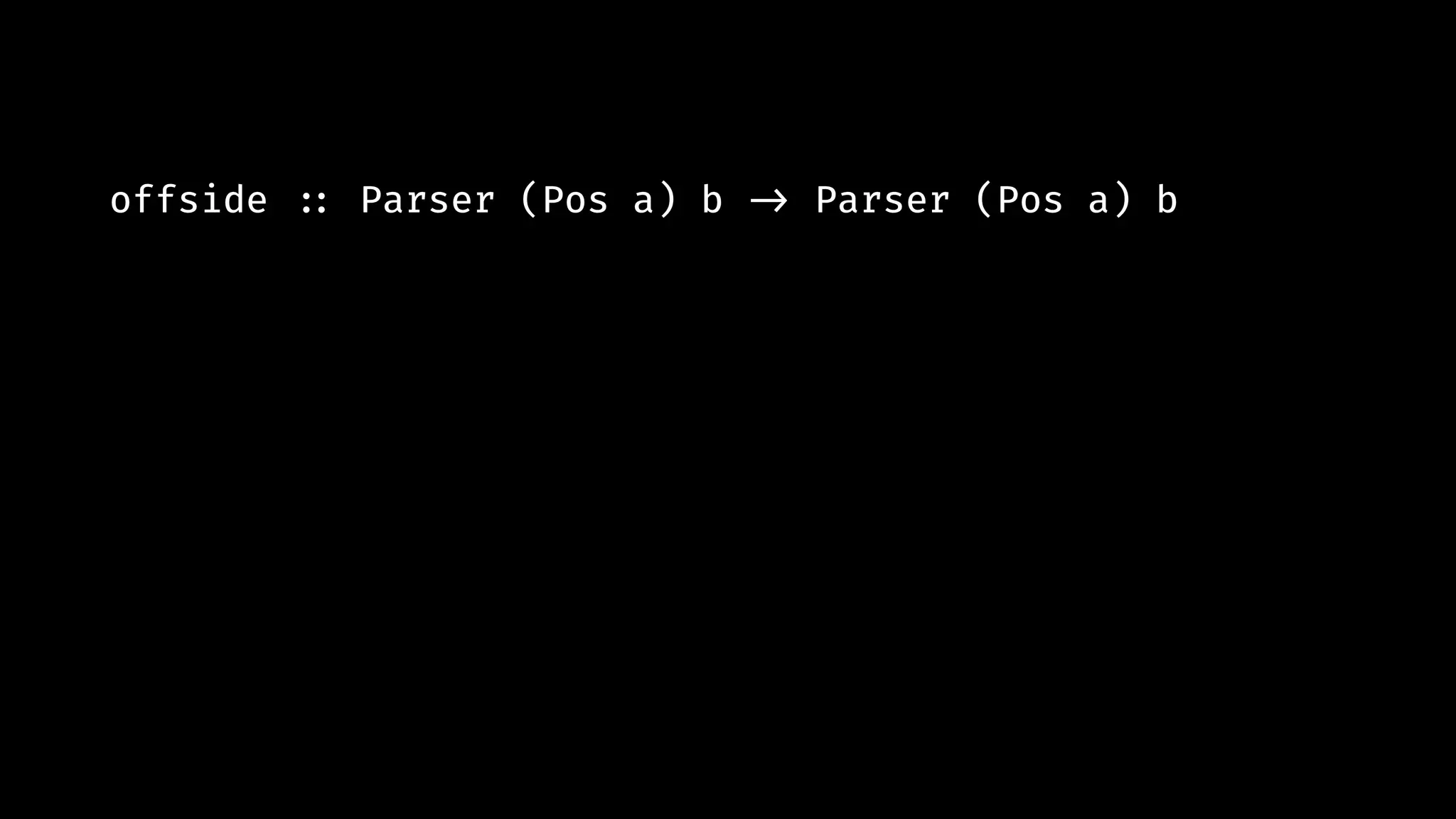
![offside !:: Parser (Pos a) b !-> Parser (Pos a) b offside p inp = [(v, inpOFF) | (v, []) !<- (p inpON)]](https://image.slidesharecdn.com/combinatorparsing-180121101339/75/Combinator-parsing-124-2048.jpg)
![(nibble (literal 'a')) " a " # !=> [('a',""),('a'," "),('a'," ")]](https://image.slidesharecdn.com/combinatorparsing-180121101339/75/Combinator-parsing-125-2048.jpg)
![offside !:: Parser (Pos a) b !-> Parser (Pos a) b offside p inp = [(v, inpOFF) | (v, []) !<- (p inpON)]](https://image.slidesharecdn.com/combinatorparsing-180121101339/75/Combinator-parsing-126-2048.jpg)
![offside !:: Parser (Pos a) b !-> Parser (Pos a) b offside p inp = [(v, inpOFF) | (v, []) !<- (p inpON)] where inpON = takeWhile (onside (head inp)) inp](https://image.slidesharecdn.com/combinatorparsing-180121101339/75/Combinator-parsing-127-2048.jpg)
![offside !:: Parser (Pos a) b !-> Parser (Pos a) b offside p inp = [(v, inpOFF) | (v, []) !<- (p inpON)] where inpON = takeWhile (onside (head inp)) inp inpOFF = drop (length inpON) inp](https://image.slidesharecdn.com/combinatorparsing-180121101339/75/Combinator-parsing-128-2048.jpg)
![offside !:: Parser (Pos a) b !-> Parser (Pos a) b offside p inp = [(v, inpOFF) | (v, []) !<- (p inpON)] where inpON = takeWhile (onside (head inp)) inp inpOFF = drop (length inpON) inp onside (a, (r, c)) (b, (r', c')) = r' !>= r !&& c' !>= c](https://image.slidesharecdn.com/combinatorparsing-180121101339/75/Combinator-parsing-129-2048.jpg)
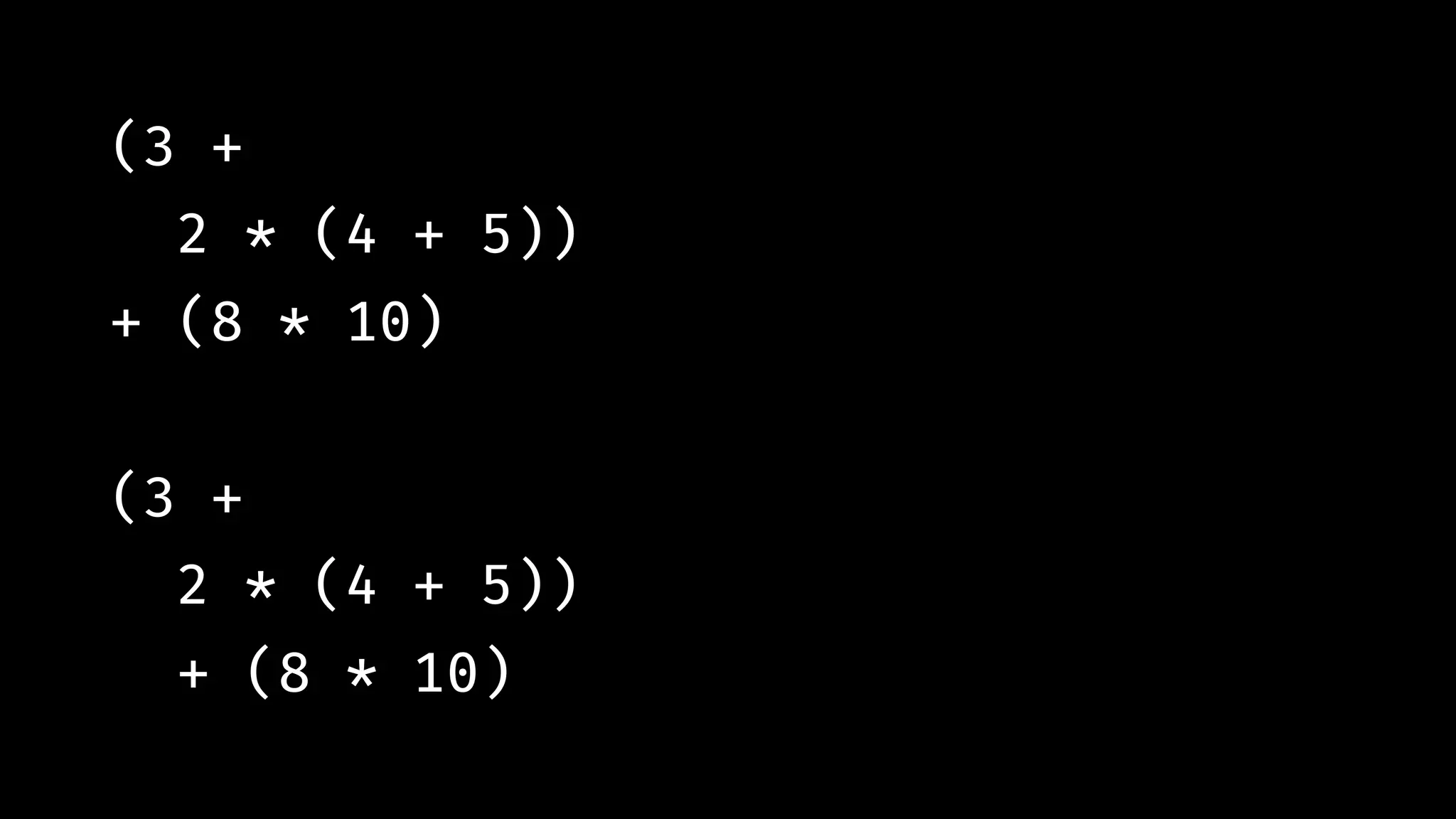
![(offside expn) (prelex inp_1) # !=> [(21.0,[('+',(2,0)),('(',(2,2)),('8',(2,3)),('*', (2,5)),('1',(2,7)),('0',(2,8)),(')',(2,9))])] (offside expn) (prelex inp_2) # !=> [(101.0,[])]](https://image.slidesharecdn.com/combinatorparsing-180121101339/75/Combinator-parsing-131-2048.jpg)

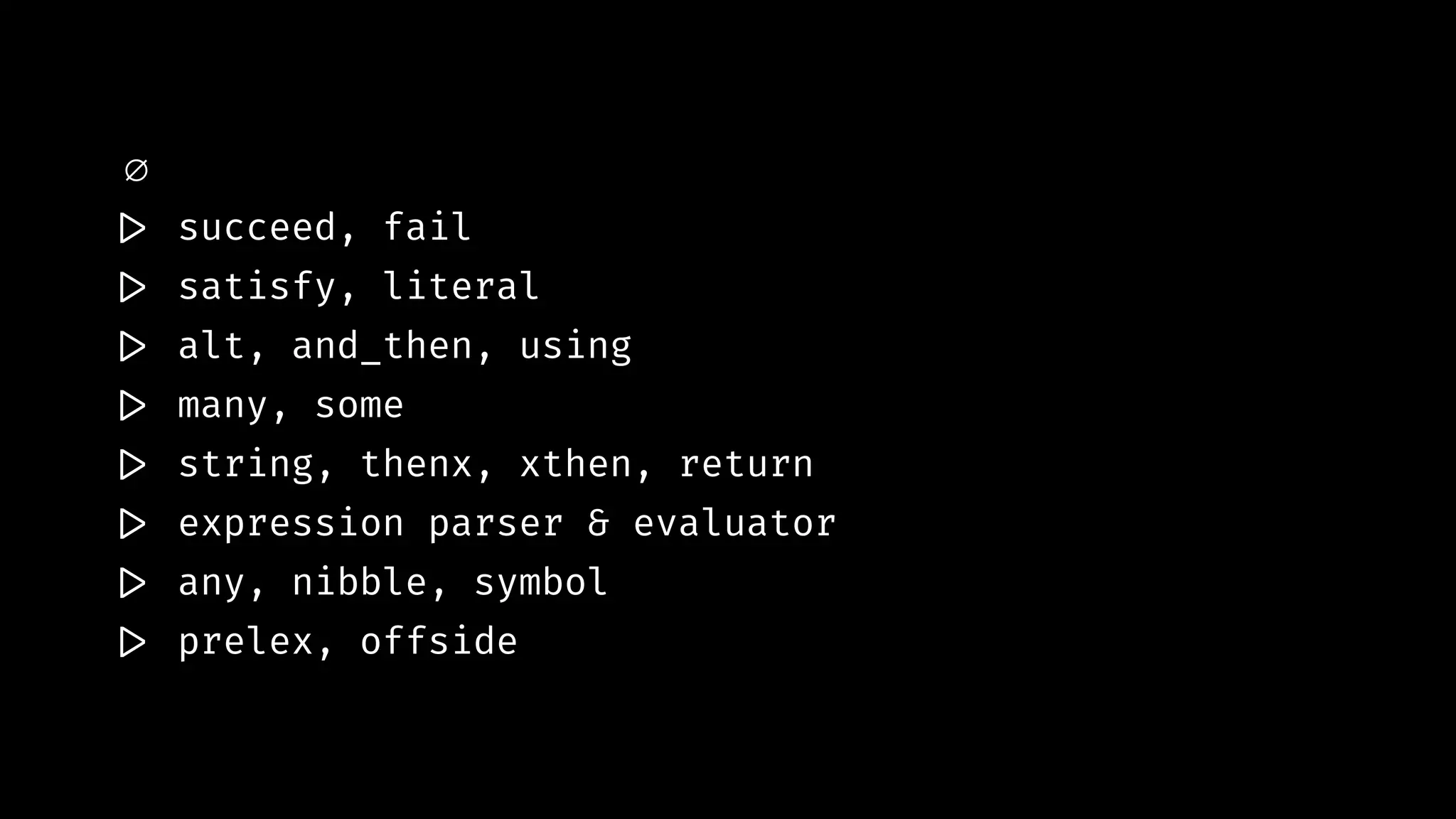
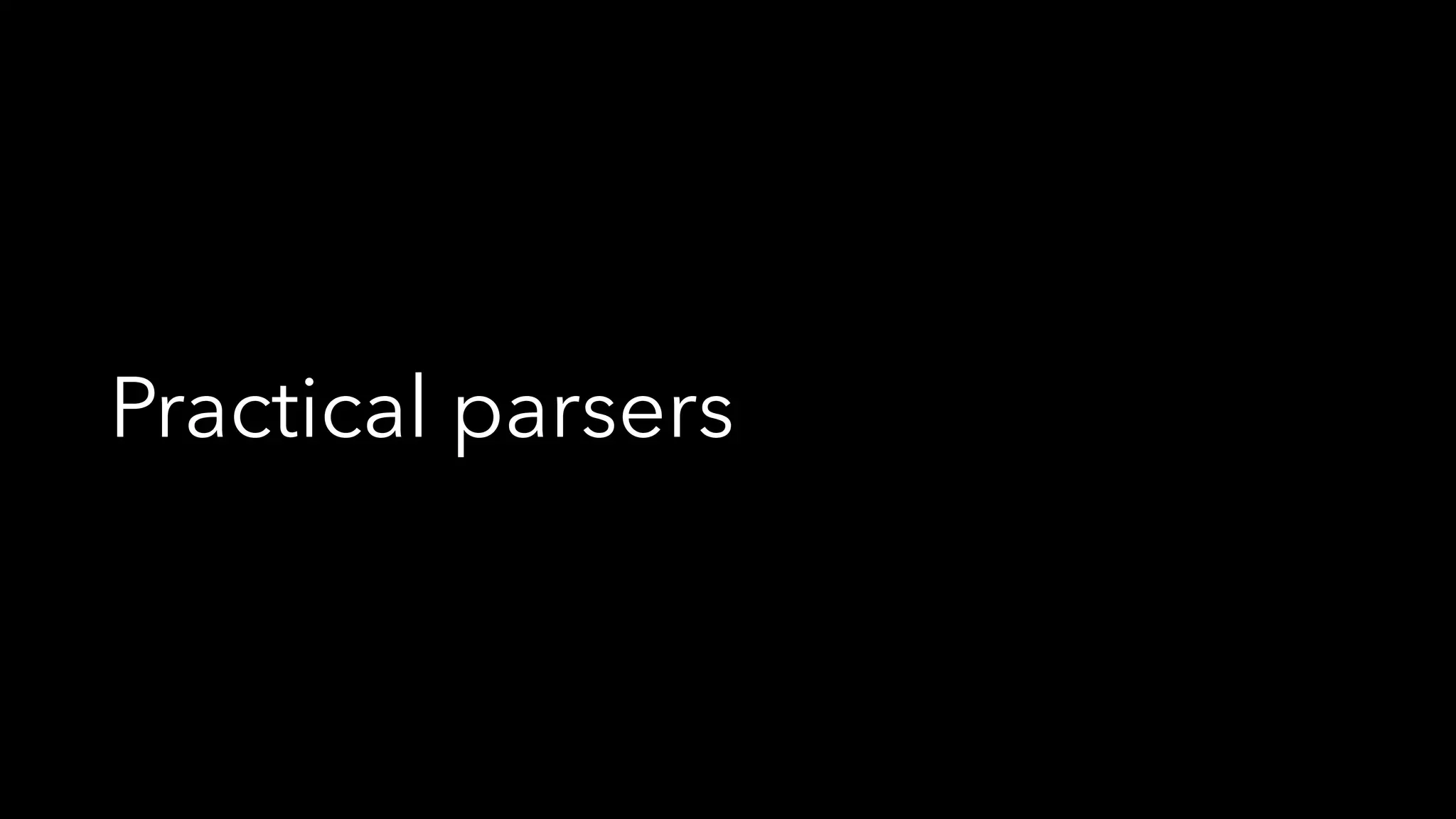
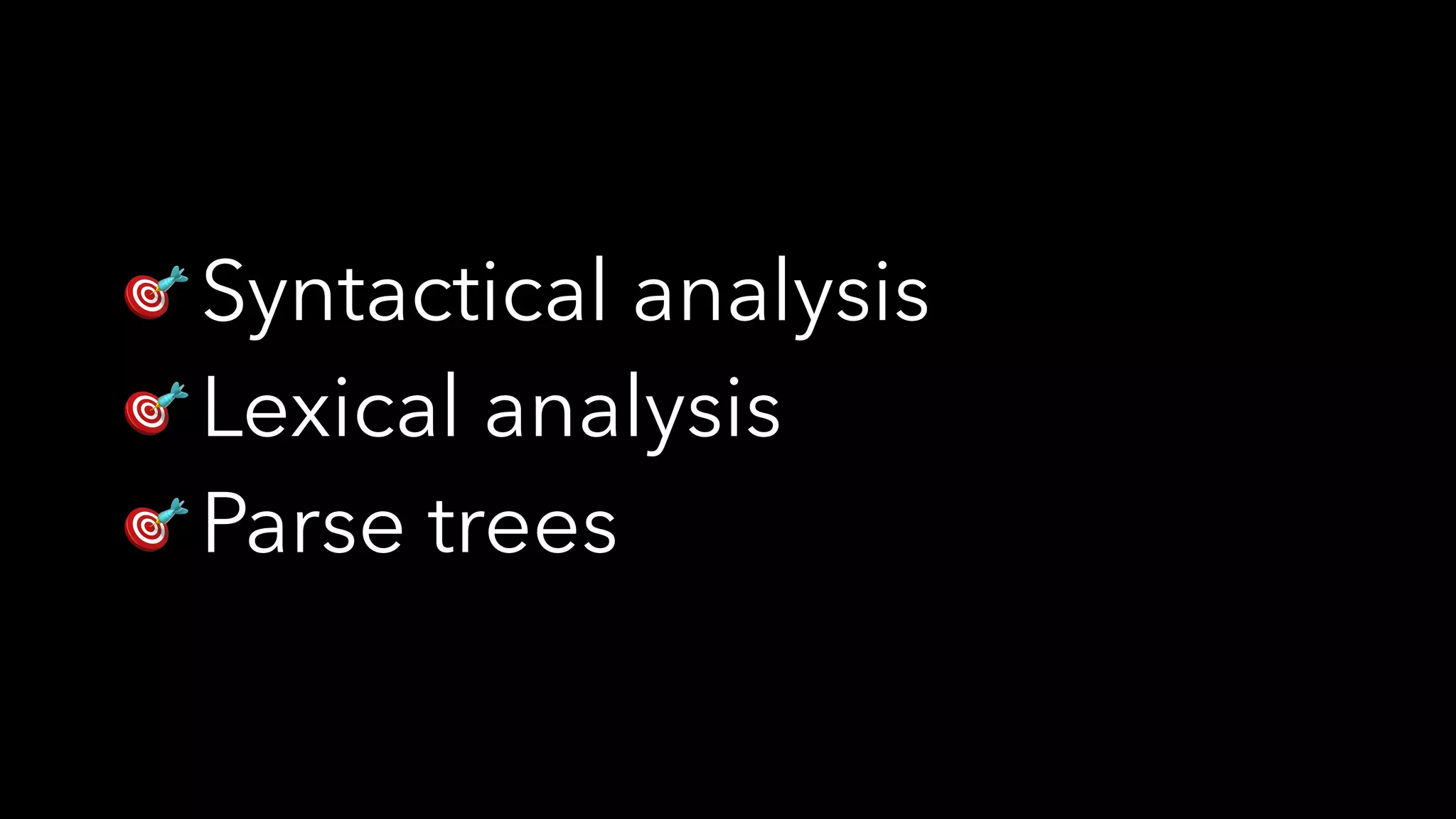
![type Parser a b = [a] !-> [(b, [a])] type Pos a = (a, (Integer, Integer))](https://image.slidesharecdn.com/combinatorparsing-180121101339/75/Combinator-parsing-136-2048.jpg)
![data Tag = Ident | Number | Symbol | Junk deriving (Show, Eq) type Token = (Tag, [Char])](https://image.slidesharecdn.com/combinatorparsing-180121101339/75/Combinator-parsing-137-2048.jpg)
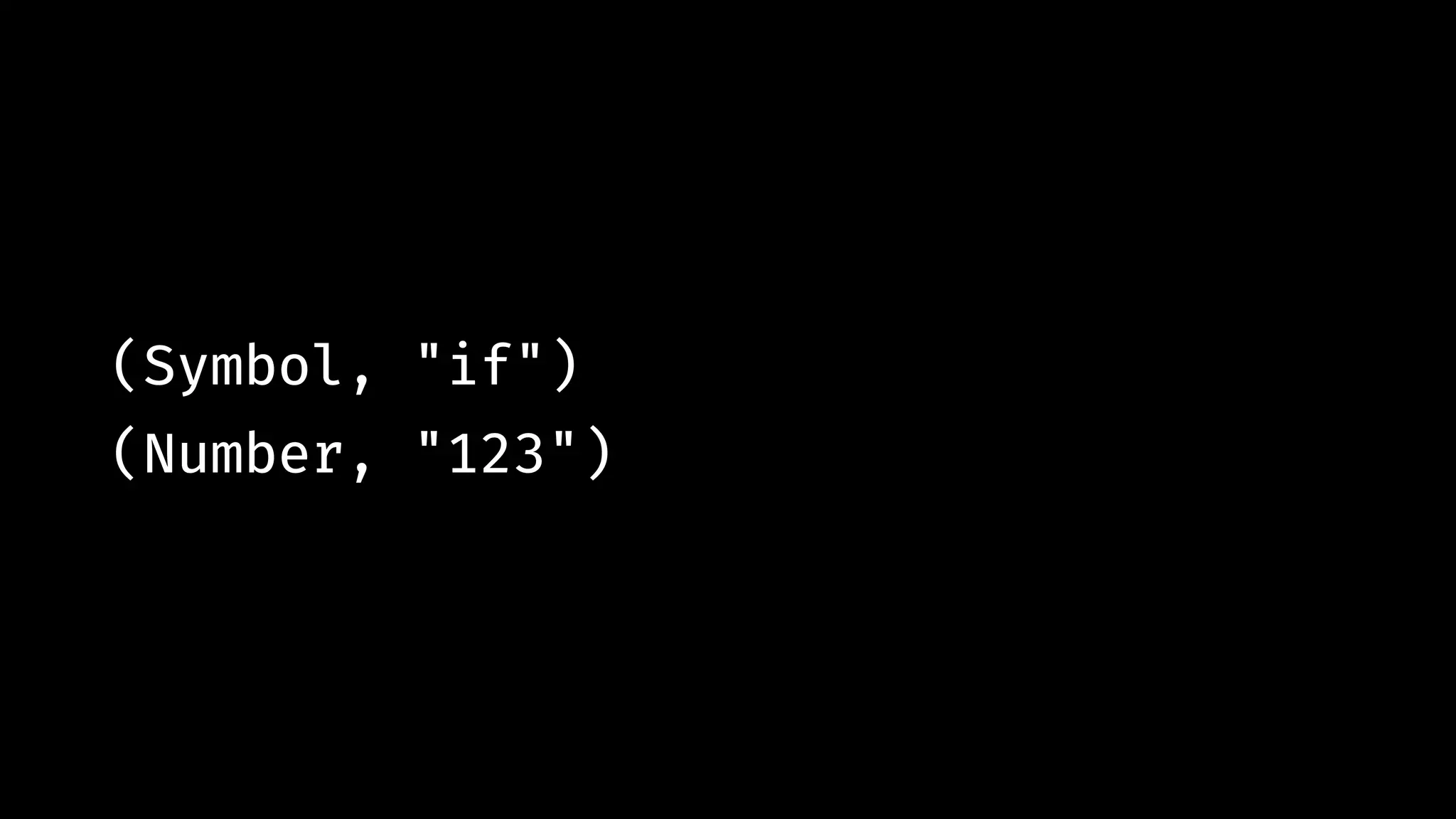
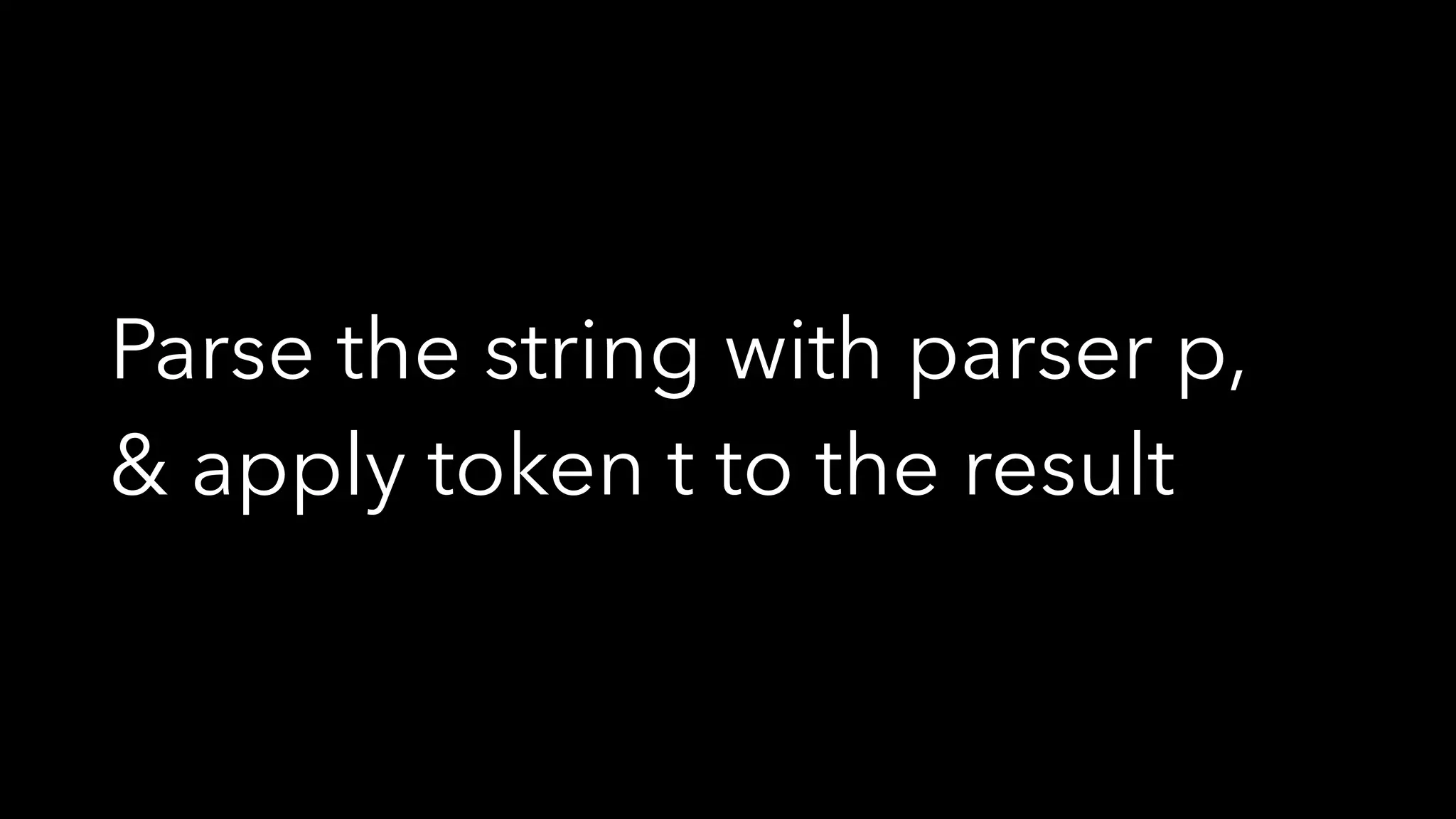
![(p `tok` t) inp = [ (((t, xs), (r, c)), out) | (xs, out) !<- p inp] where (x, (r,c)) = head inp](https://image.slidesharecdn.com/combinatorparsing-180121101339/75/Combinator-parsing-140-2048.jpg)
![(p `tok` t) inp = [ ((<token>,<pos>),<unused input>) | (xs, out) !<- p inp] where (x, (r,c)) = head inp](https://image.slidesharecdn.com/combinatorparsing-180121101339/75/Combinator-parsing-141-2048.jpg)
![(p `tok` t) inp = [ (((t, xs), (r, c)), out) | (xs, out) !<- p inp] where (x, (r,c)) = head inp](https://image.slidesharecdn.com/combinatorparsing-180121101339/75/Combinator-parsing-142-2048.jpg)
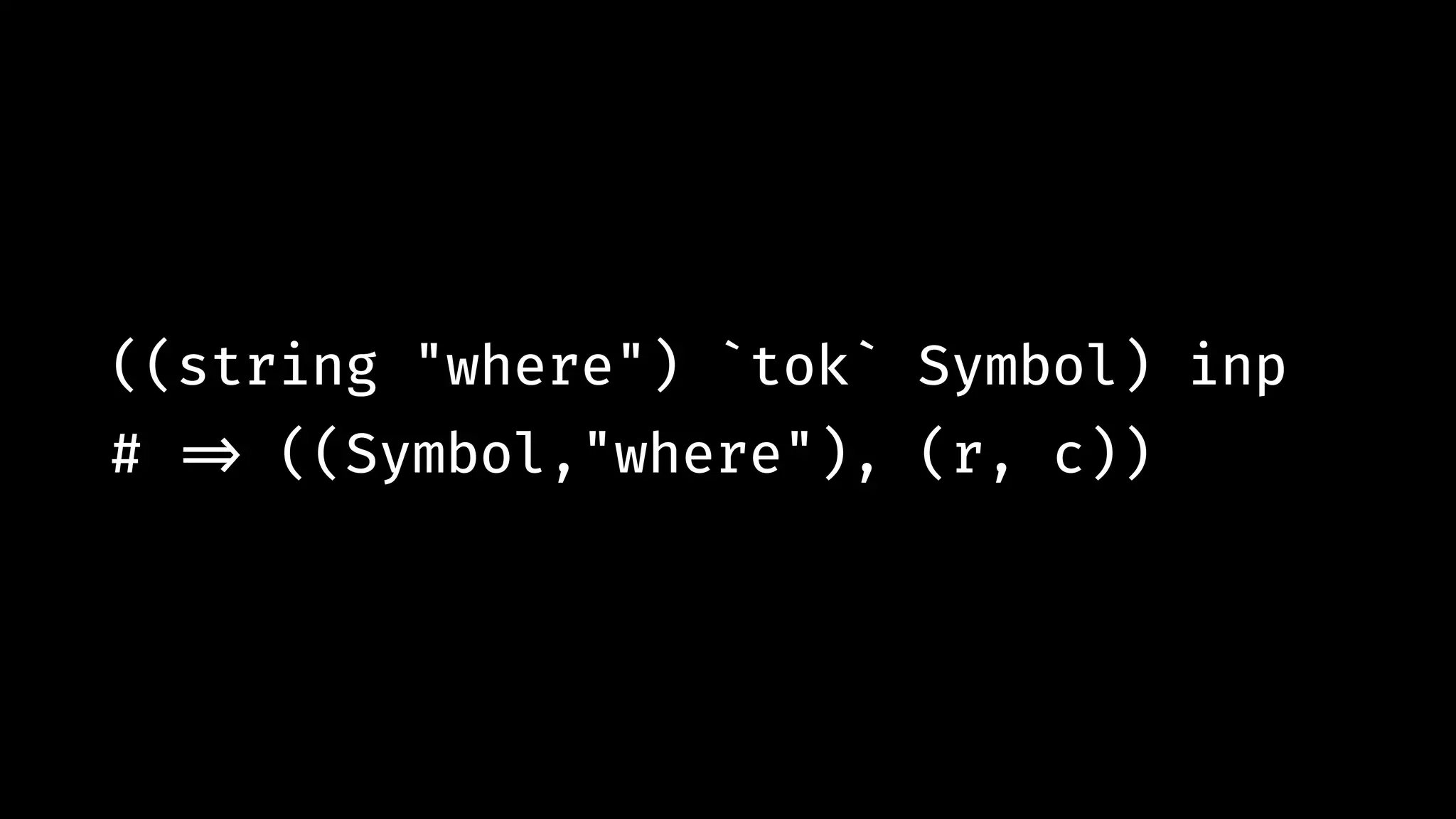
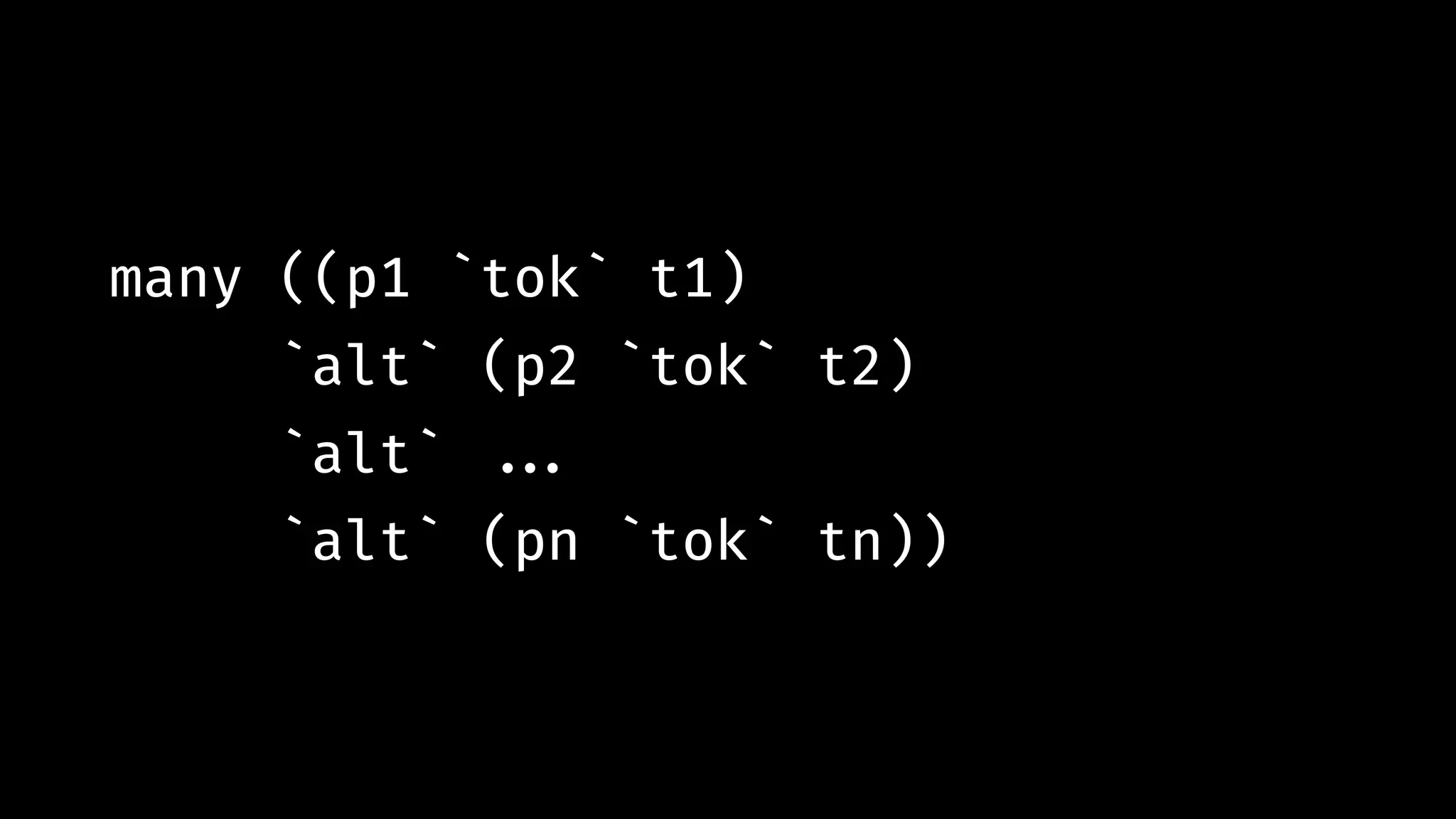
![[(p1, t1), (p2, t2), …, (pn, tn)]](https://image.slidesharecdn.com/combinatorparsing-180121101339/75/Combinator-parsing-145-2048.jpg)
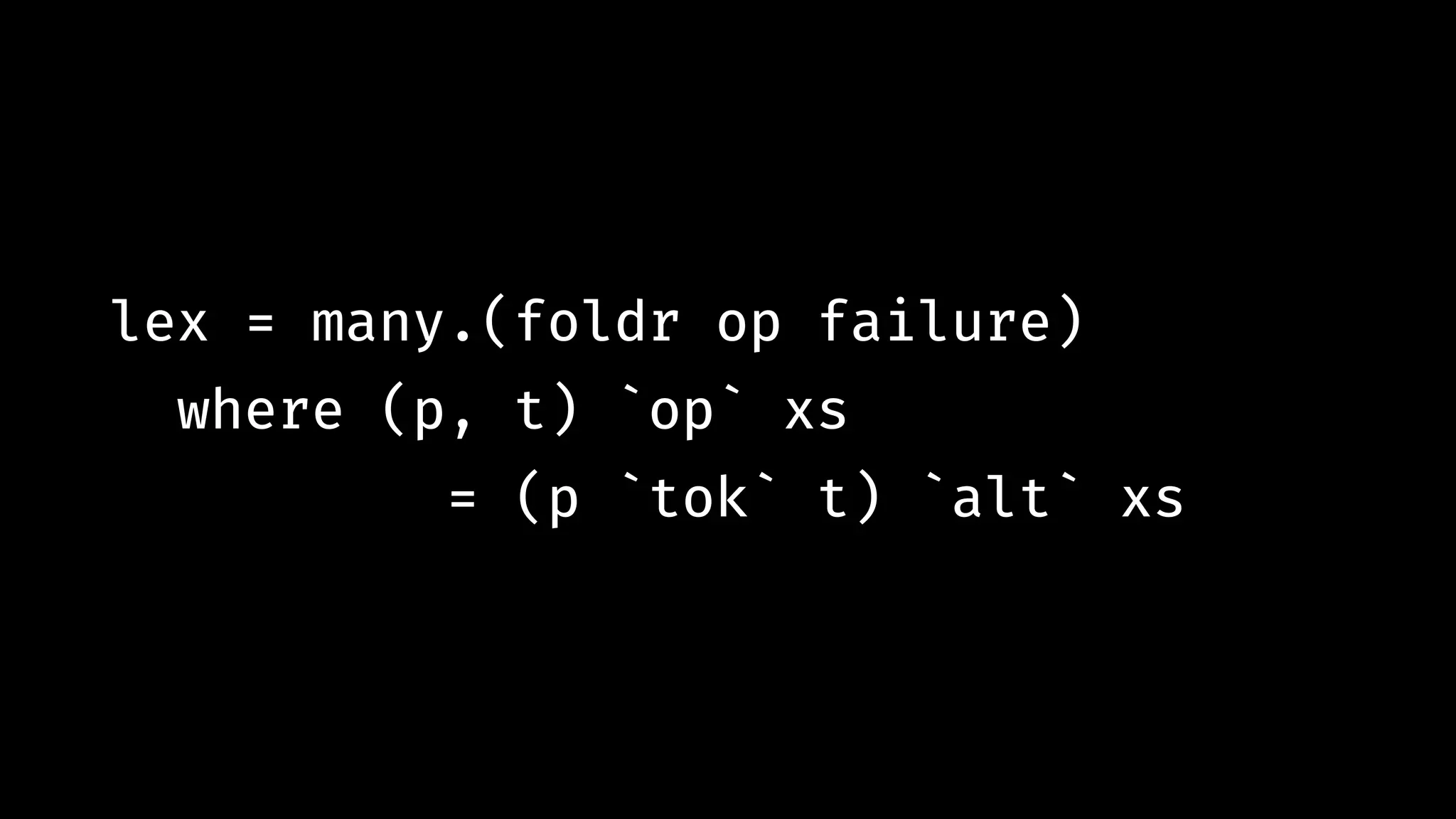

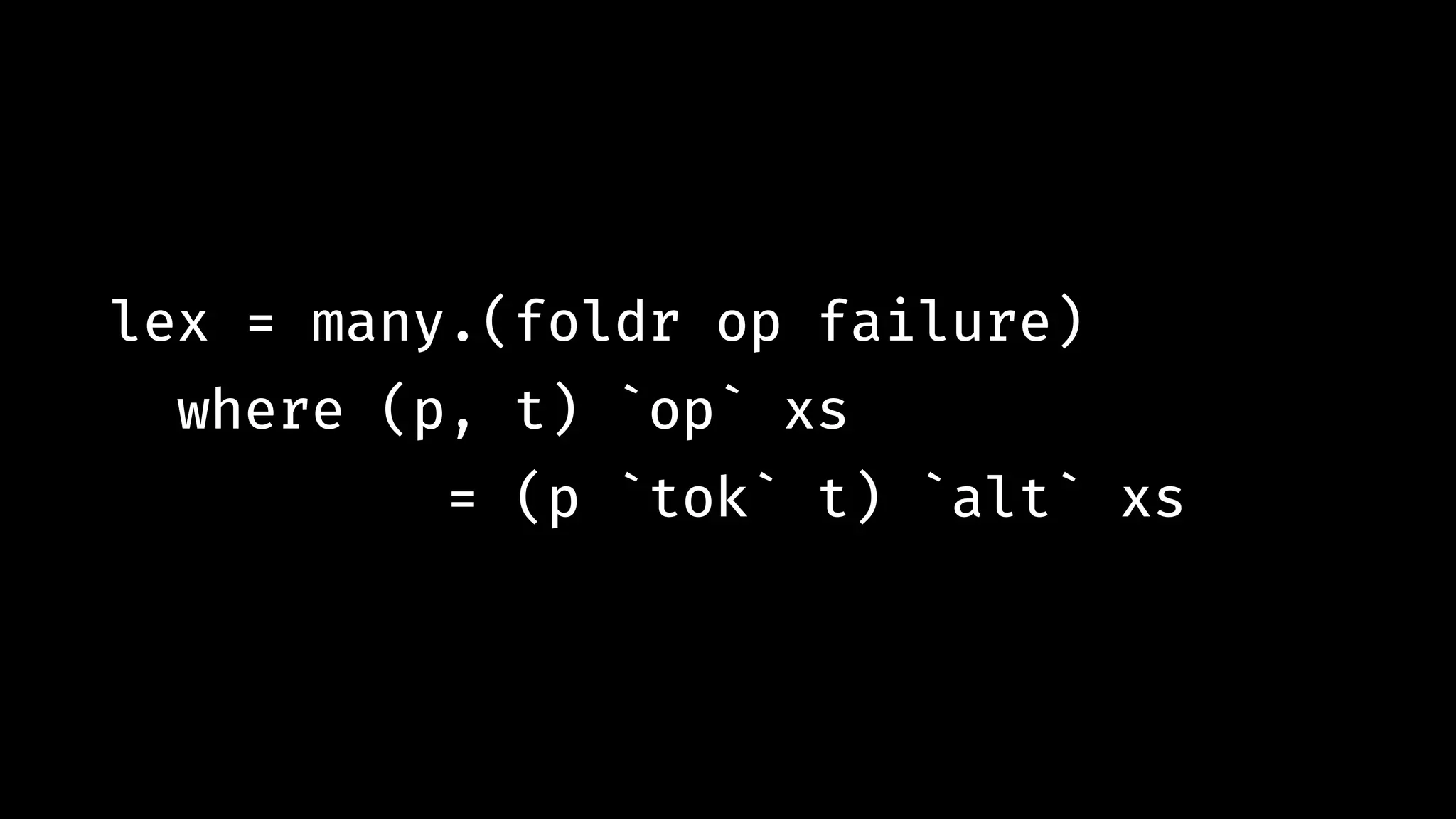
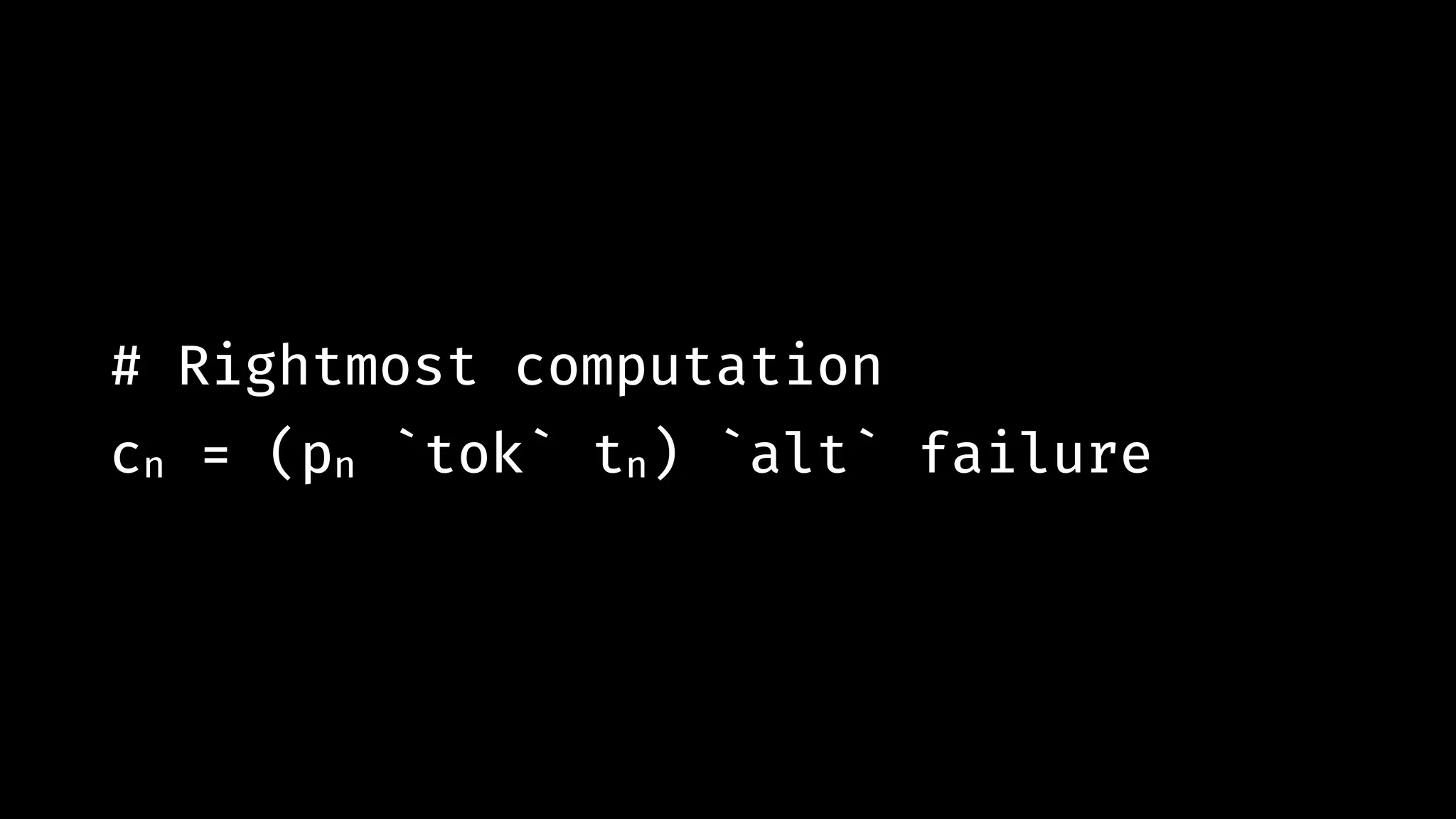
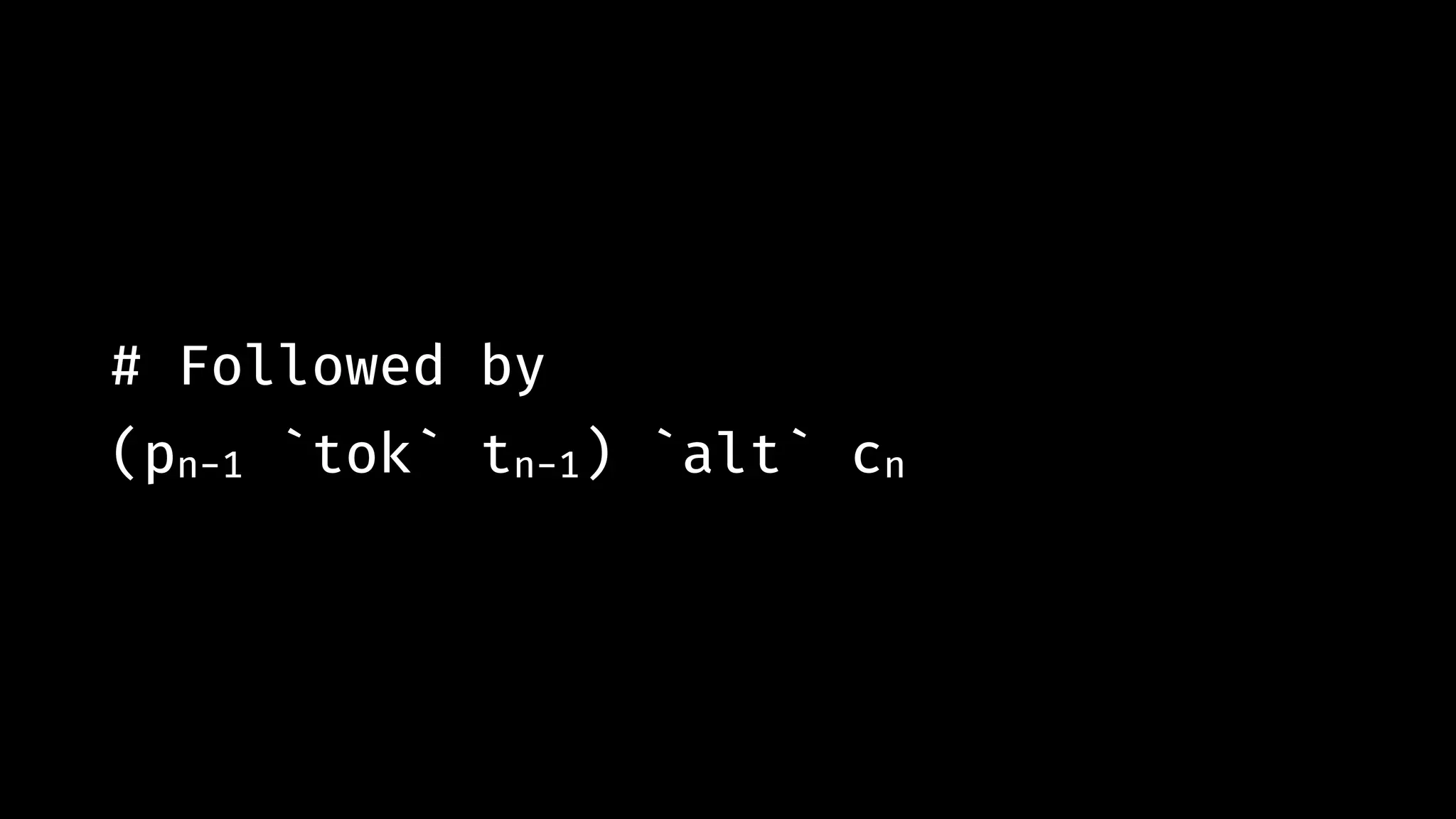
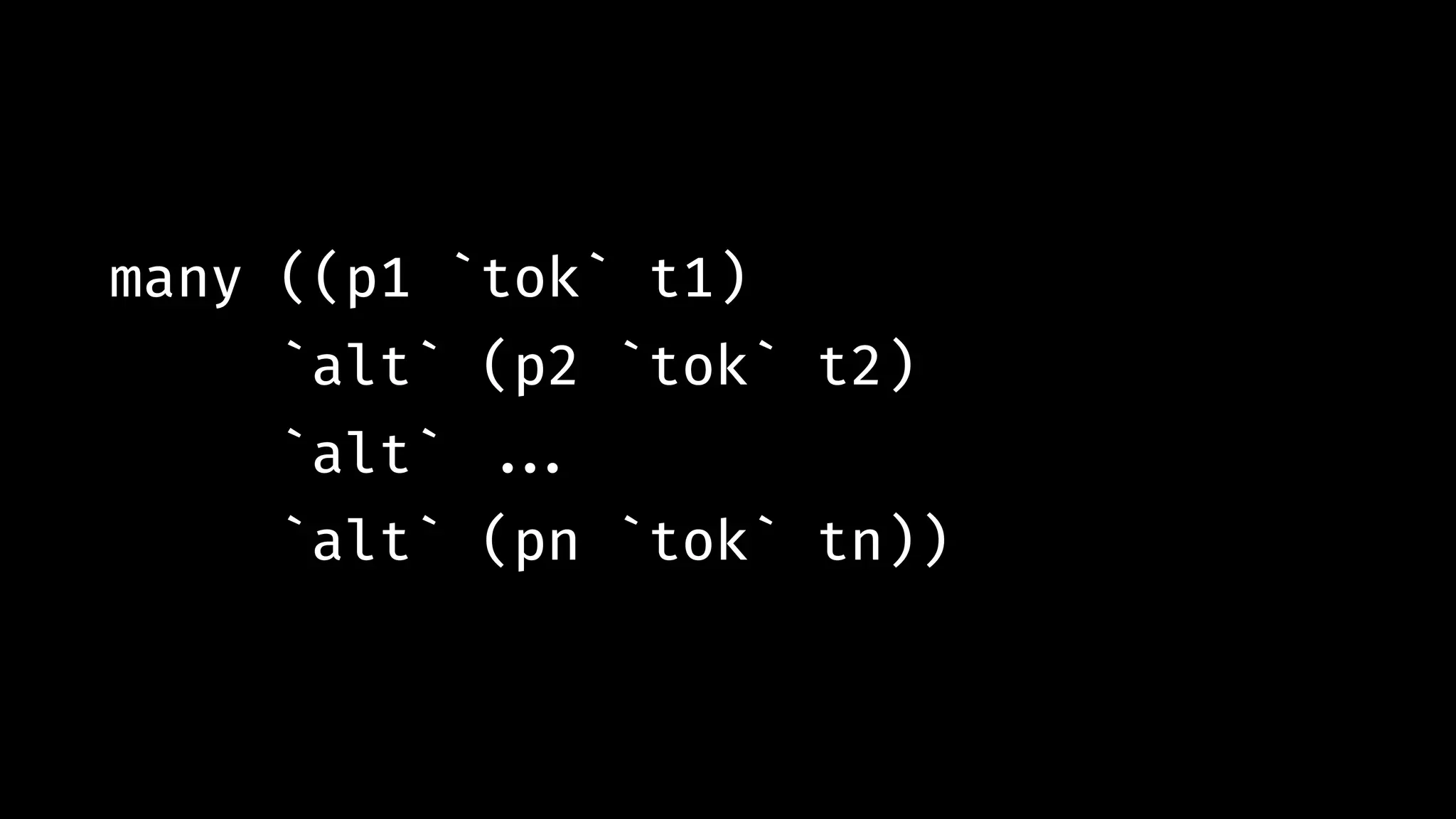
![lexer = lex [ ((some (any_of literal " nt")), Junk), ((string "where"), Symbol), (word, Ident), (number, Number), ((any_of string ["(", ")", "="]), Symbol)]](https://image.slidesharecdn.com/combinatorparsing-180121101339/75/Combinator-parsing-152-2048.jpg)
![lexer = lex [ ((some (any_of literal " nt")), Junk), ((string "where"), Symbol), (word, Ident), (number, Number), ((any_of string ["(", ")", "="]), Symbol)]](https://image.slidesharecdn.com/combinatorparsing-180121101339/75/Combinator-parsing-153-2048.jpg)
![lexer = lex [ ((some (any_of literal " nt")), Junk), ((string "where"), Symbol), (word, Ident), (number, Number), ((any_of string ["(", ")", "="]), Symbol)]](https://image.slidesharecdn.com/combinatorparsing-180121101339/75/Combinator-parsing-154-2048.jpg)
![head (lexer (prelex "where x = 10")) # !=> ([((Symbol,"where"),(0,0)), ((Ident,"x"),(0,6)), ((Symbol,"="),(0,8)), ((Number,"10"),(0,10)) ],[])](https://image.slidesharecdn.com/combinatorparsing-180121101339/75/Combinator-parsing-155-2048.jpg)
![(head.lexer.prelex) "where x = 10" # !=> ([((Symbol,"where"),(0,0)), ((Ident,"x"),(0,6)), ((Symbol,"="),(0,8)), ((Number,"10"),(0,10)) ],[])](https://image.slidesharecdn.com/combinatorparsing-180121101339/75/Combinator-parsing-156-2048.jpg)
![(head.lexer.prelex) "where x = 10" # !=> ([((Symbol,"where"),(0,0)), ((Ident,"x"),(0,6)), ((Symbol,"="),(0,8)), ((Number,"10"),(0,10)) ],[]) Function composition](https://image.slidesharecdn.com/combinatorparsing-180121101339/75/Combinator-parsing-157-2048.jpg)
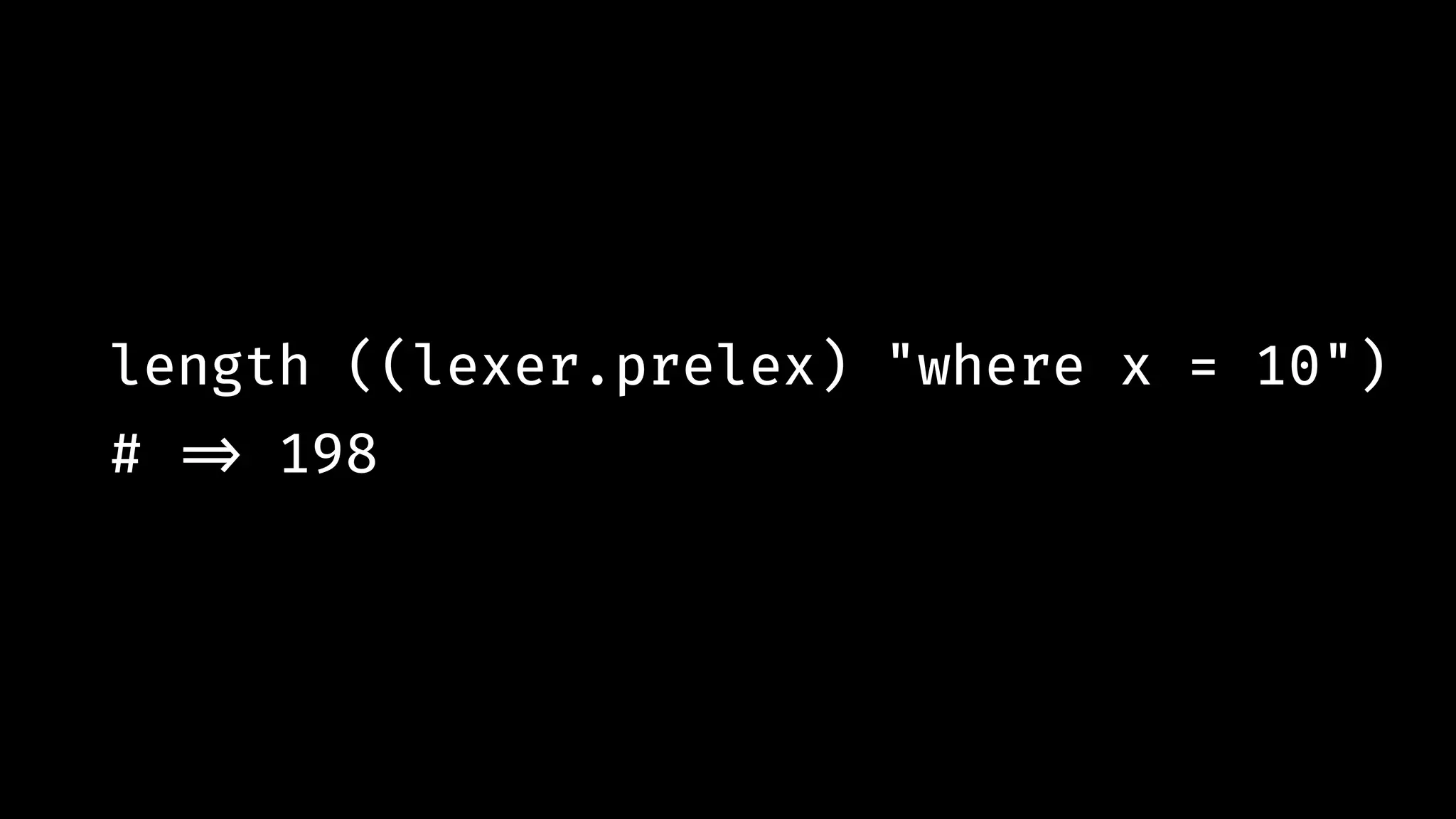

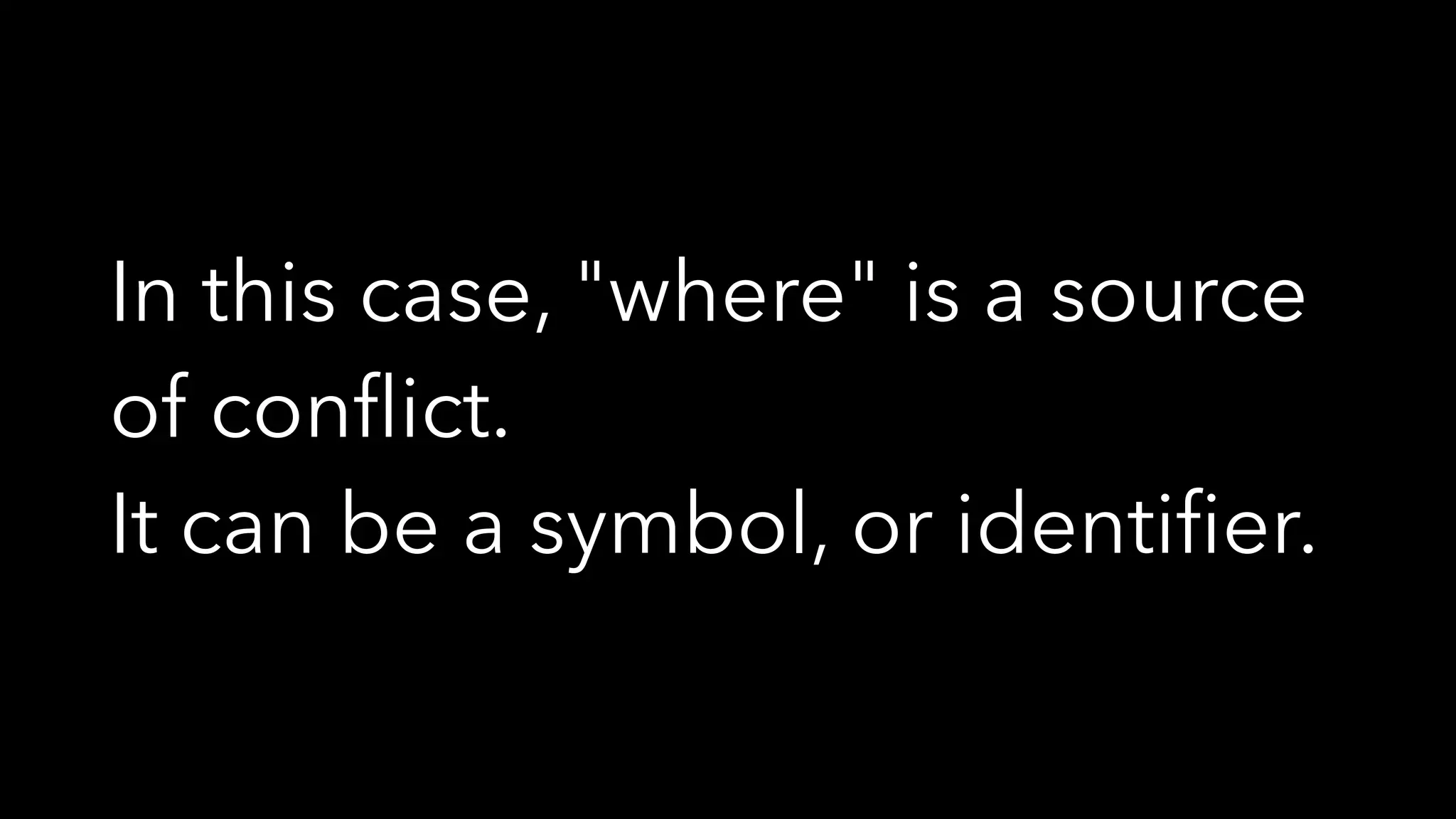
![lexer = lex [ {- 1 -} ((some (any_of literal " nt")), Junk), {- 2 -} ((string "where"), Symbol), {- 3 -} (word, Ident), {- 4 -} (number, Number), {- 5 -} ((any_of string ["(",")","="]), Symbol)]](https://image.slidesharecdn.com/combinatorparsing-180121101339/75/Combinator-parsing-161-2048.jpg)


![strip !:: [(Pos Token)] !-> [(Pos Token)] strip = filter ((!!= Junk).fst.fst)](https://image.slidesharecdn.com/combinatorparsing-180121101339/75/Combinator-parsing-164-2048.jpg)
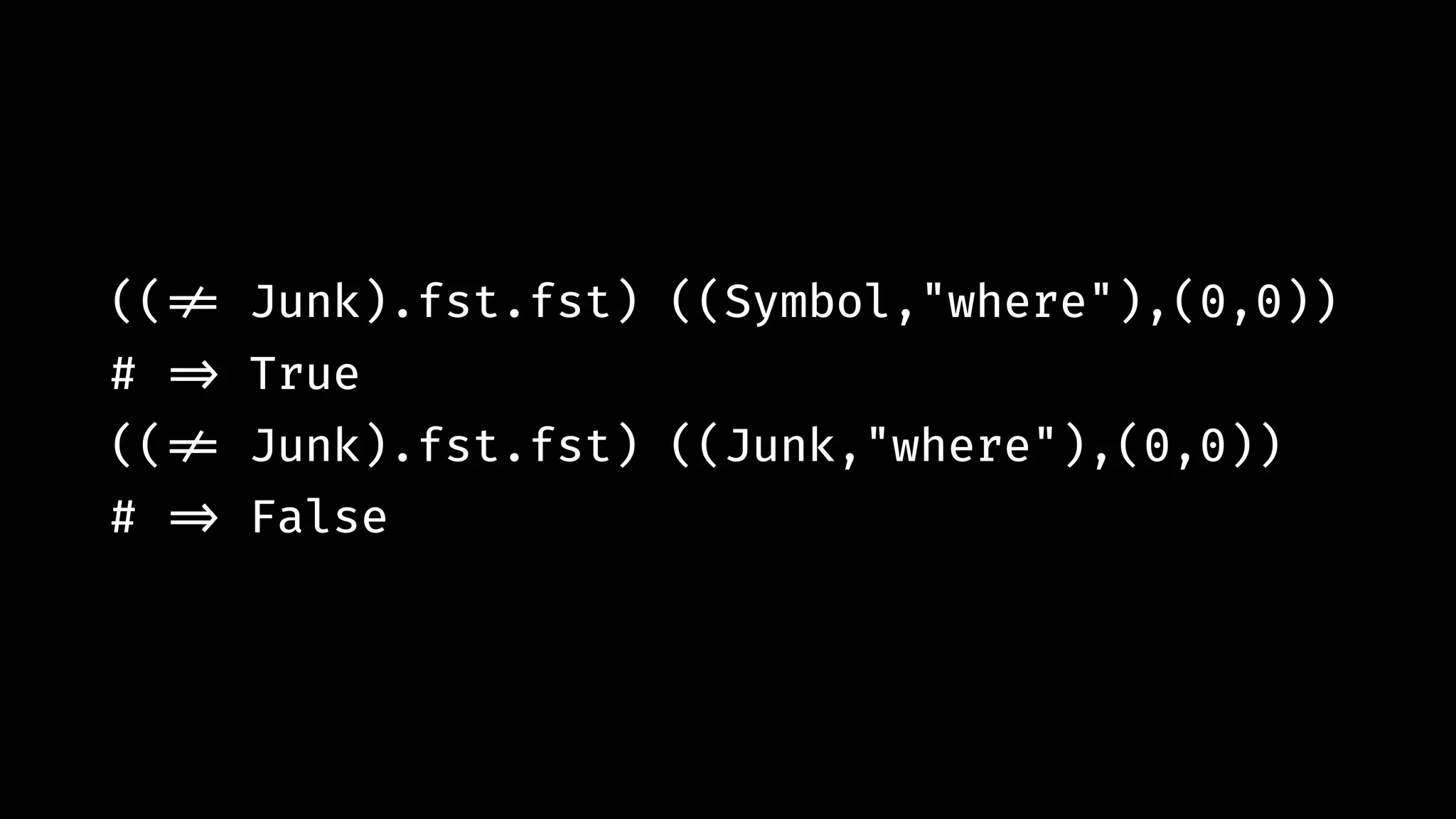
![(fst.head.lexer.prelex) "where x = 10" # !=> [((Symbol,"where"),(0,0)), ((Junk," "),(0,5)), ((Ident,"x"),(0,6)), ((Junk," "),(0,7)), ((Symbol,"="),(0,8)), ((Junk," "),(0,9)), ((Number,"10"),(0,10))]](https://image.slidesharecdn.com/combinatorparsing-180121101339/75/Combinator-parsing-166-2048.jpg)
![(strip.fst.head.lexer.prelex) "where x = 10" # !=> [((Symbol,"where"),(0,0)), ((Ident,"x"),(0,6)), ((Symbol,"="),(0,8)), ((Number,"10"),(0,10))]](https://image.slidesharecdn.com/combinatorparsing-180121101339/75/Combinator-parsing-167-2048.jpg)
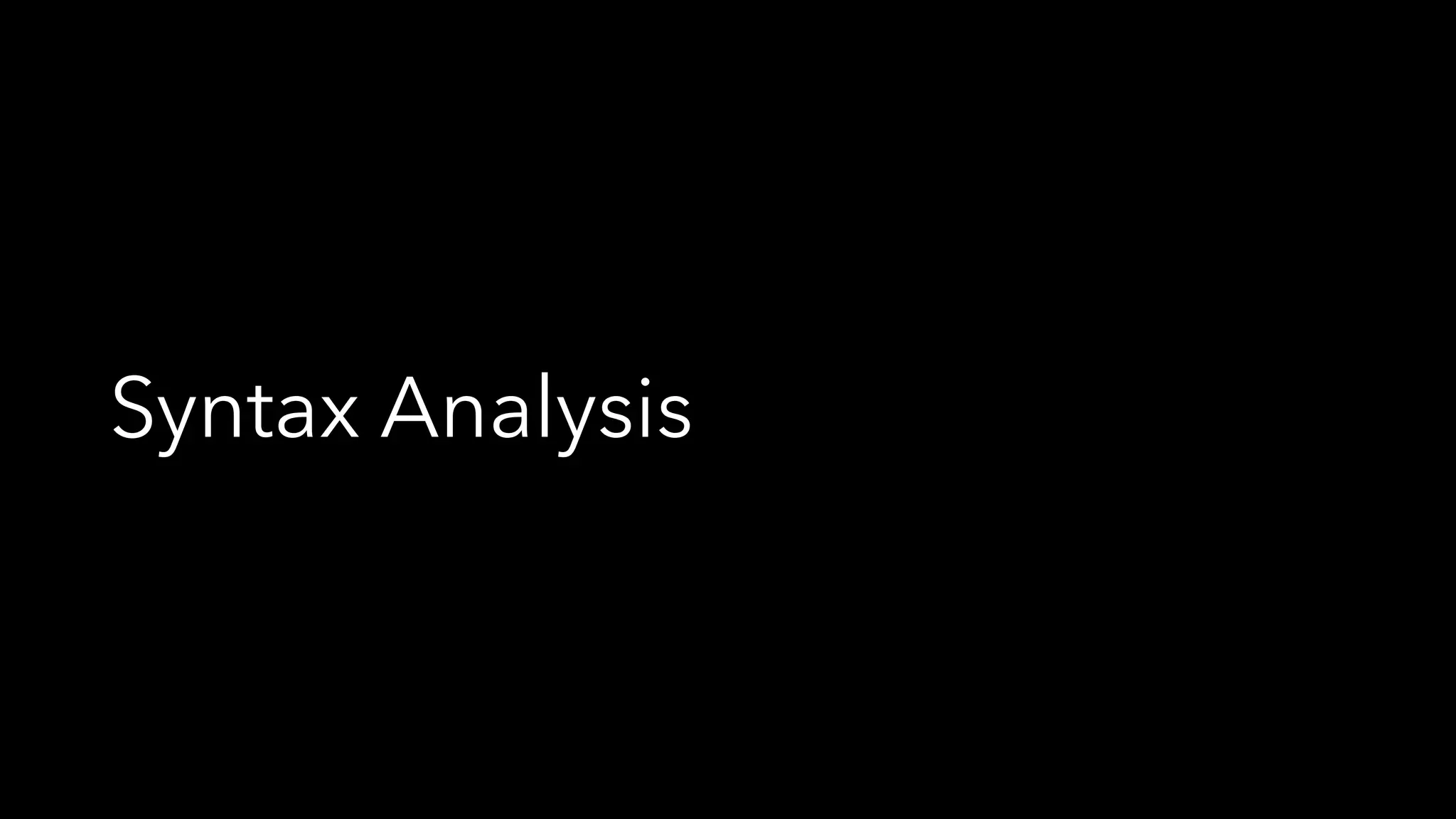
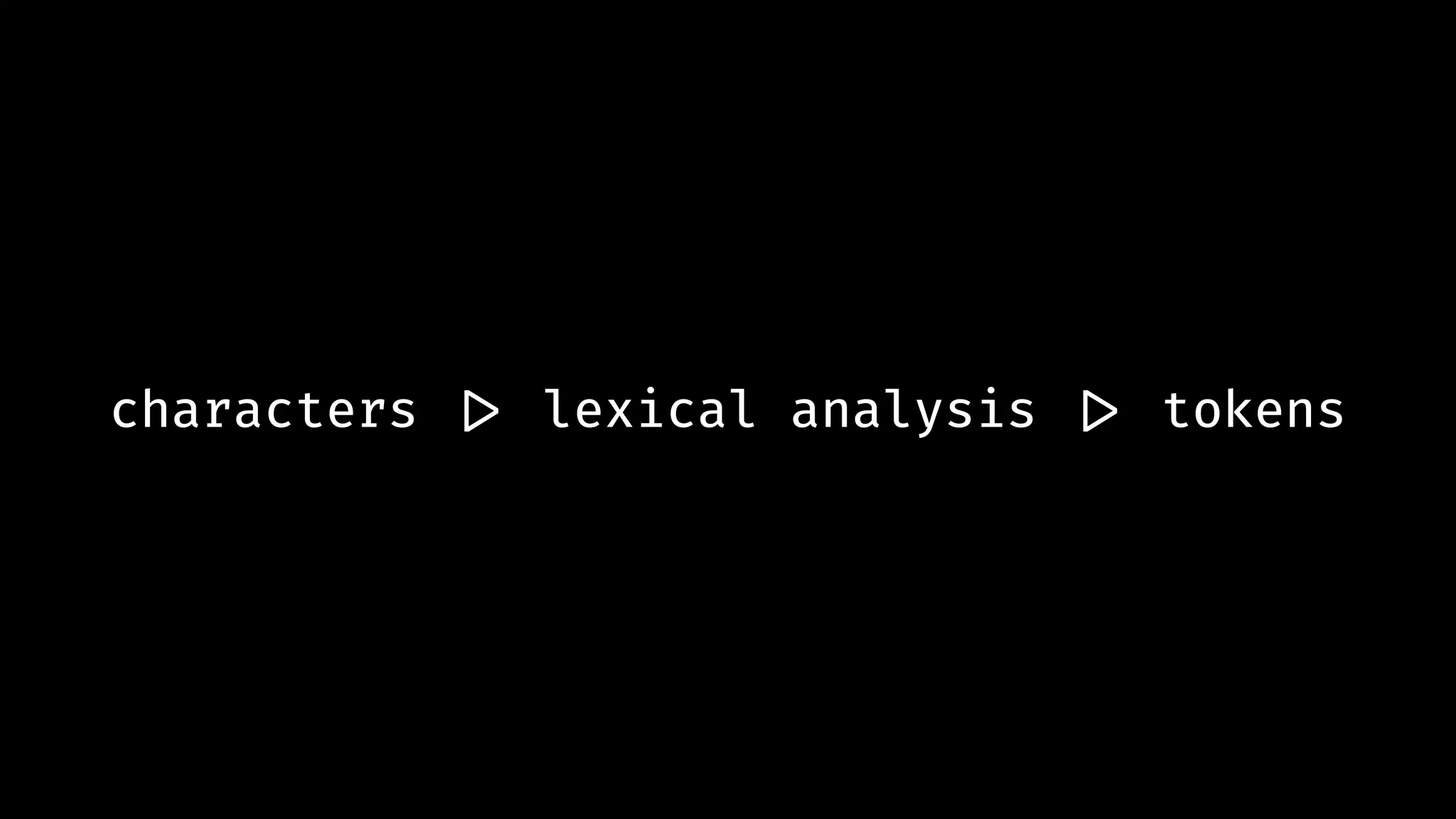
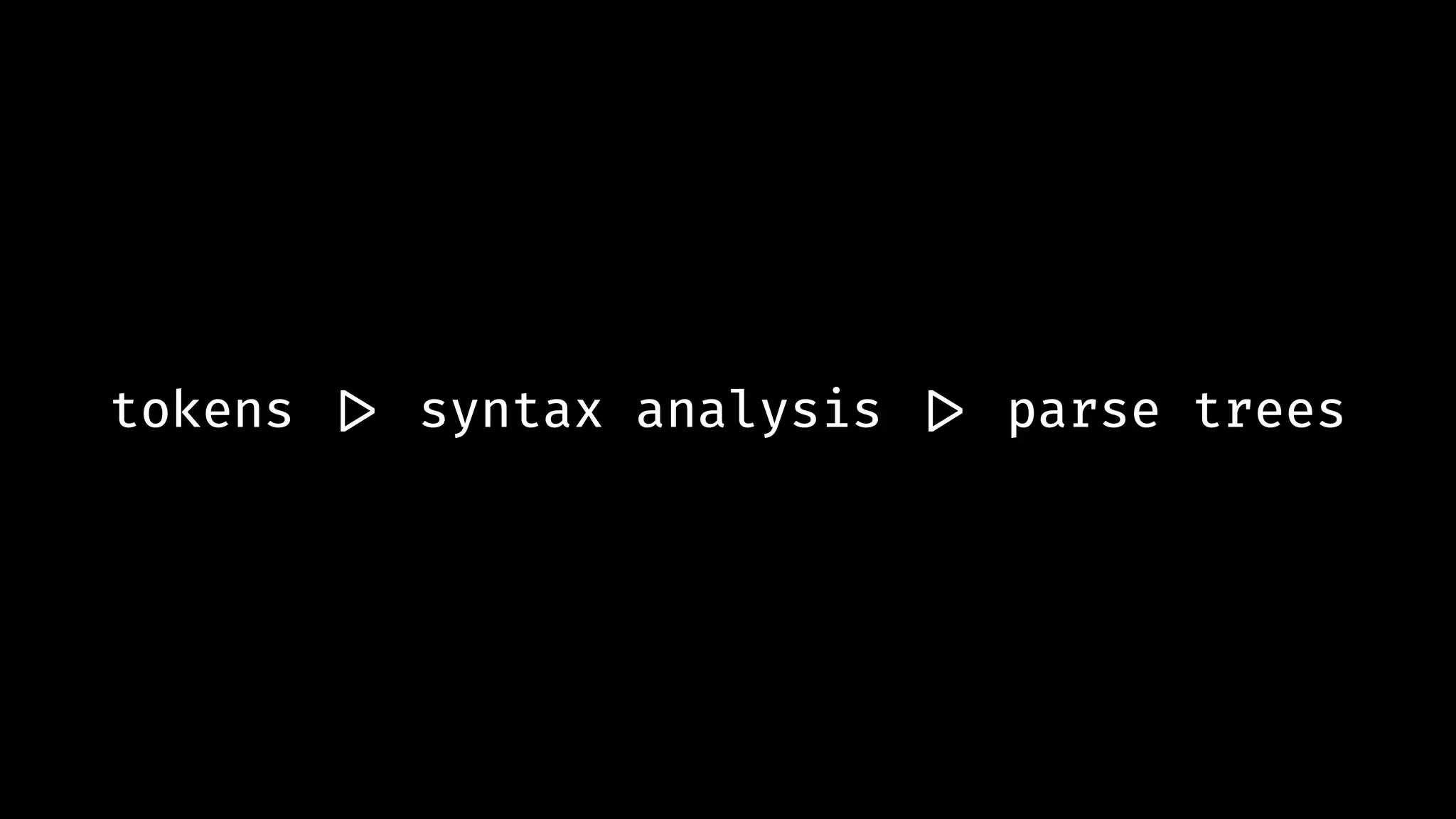
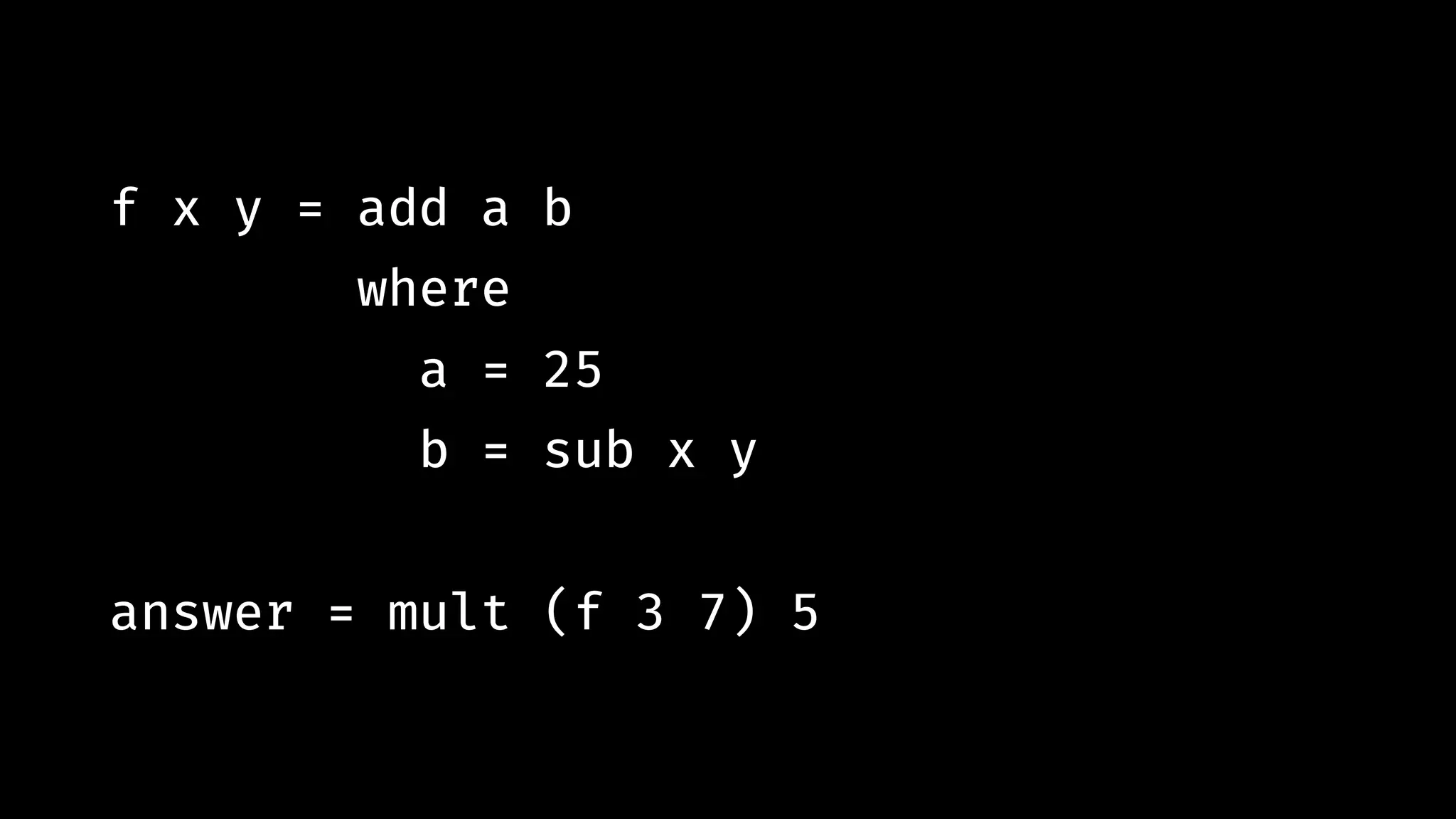
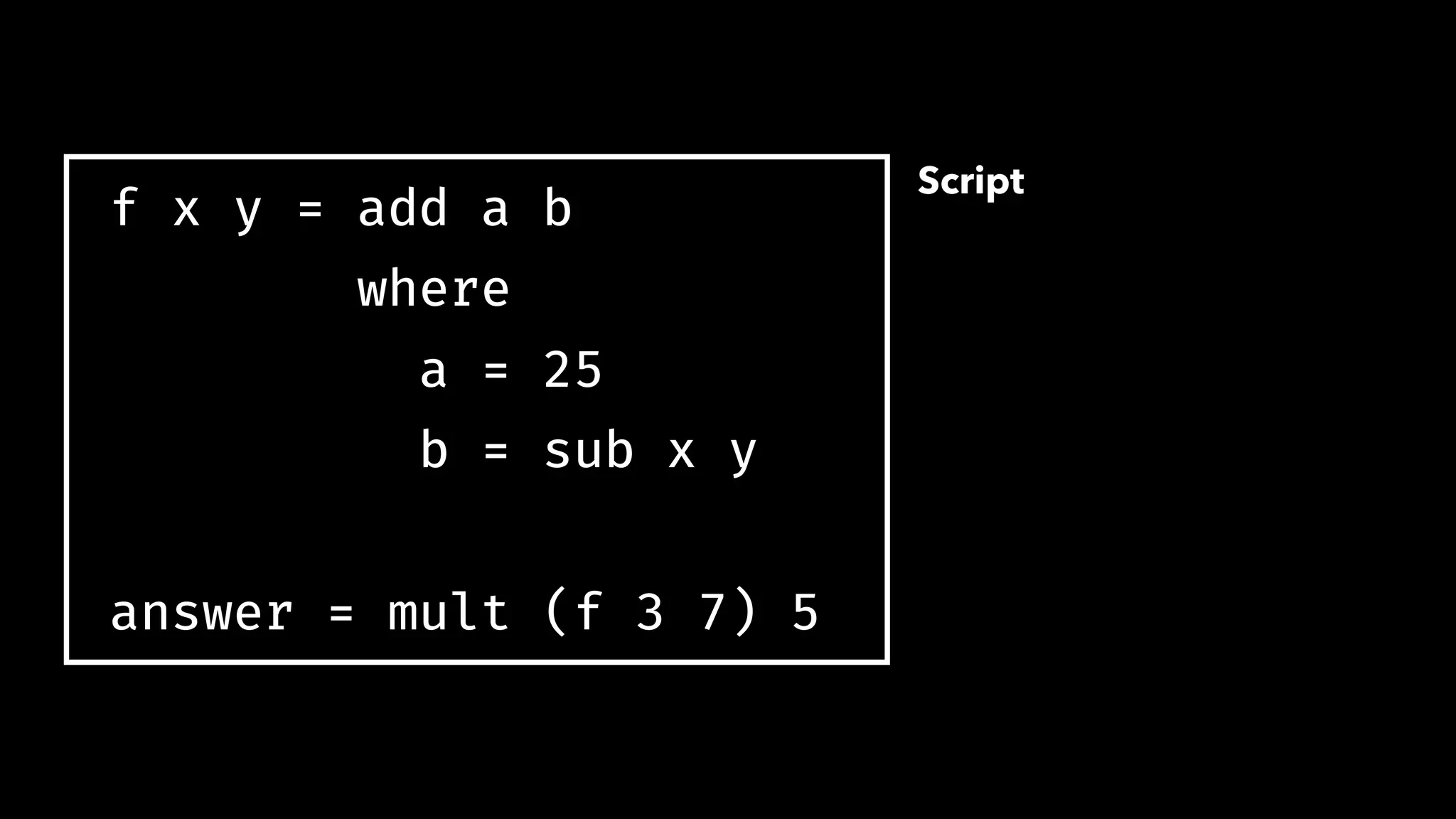
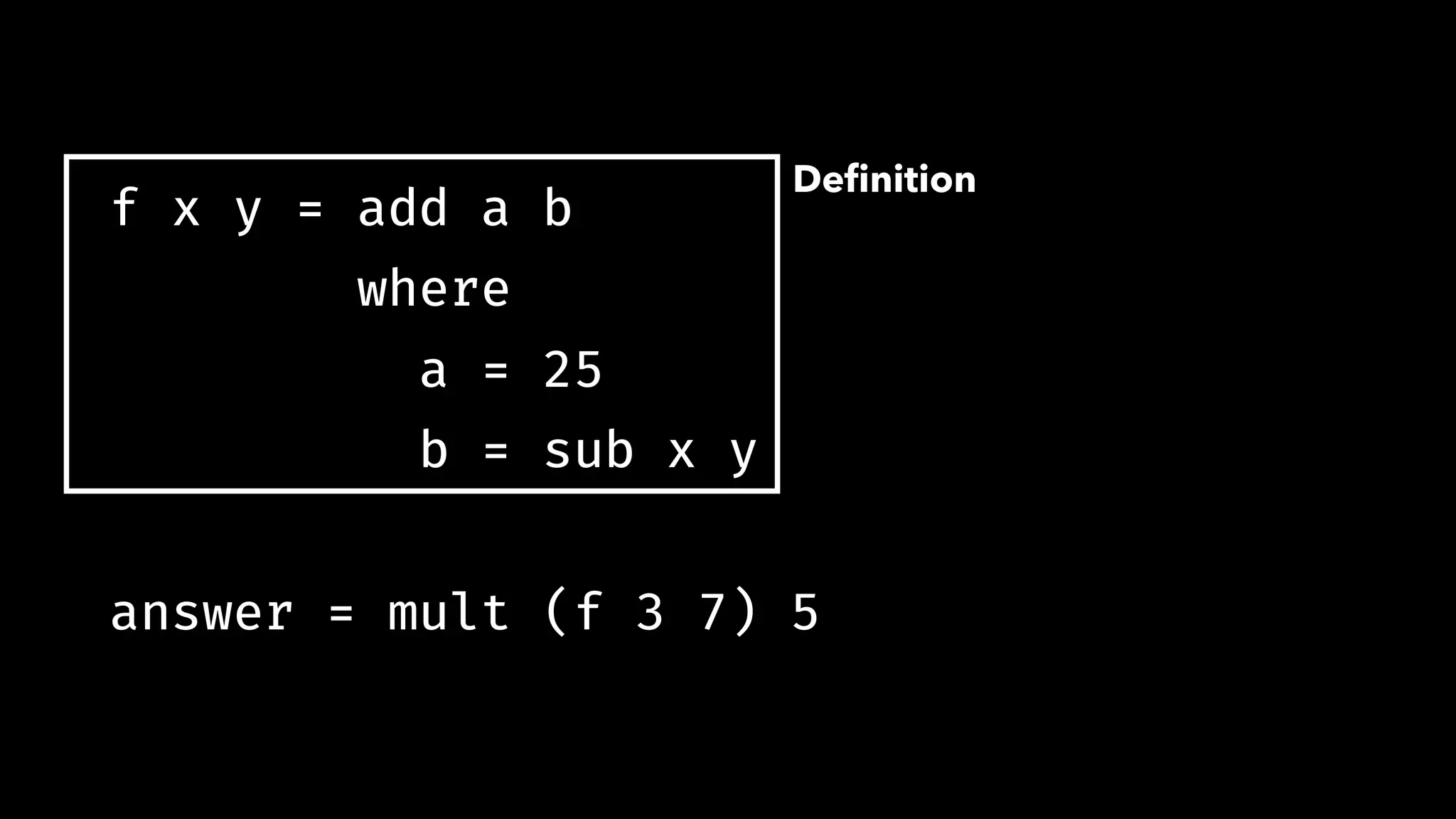
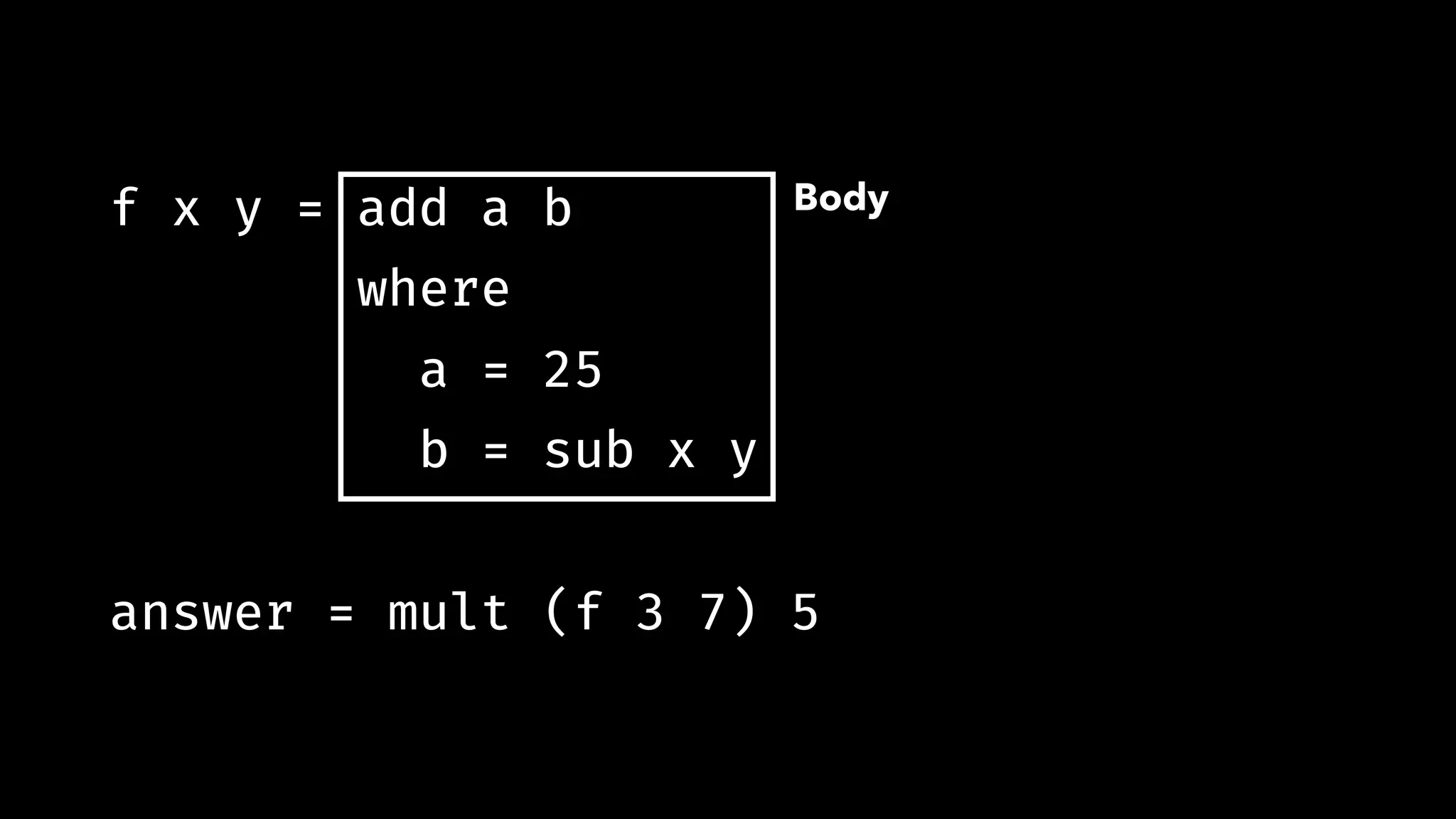
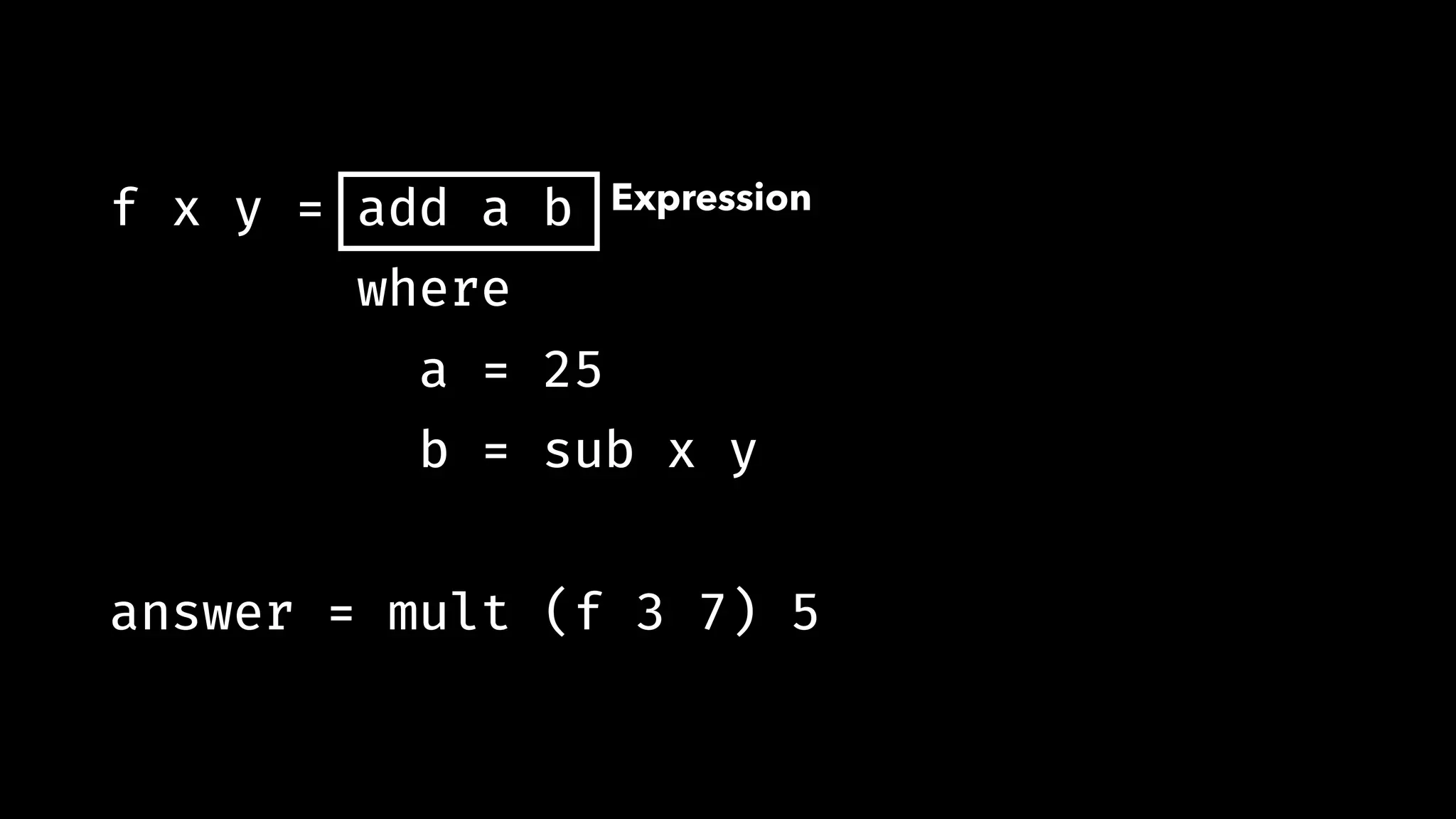
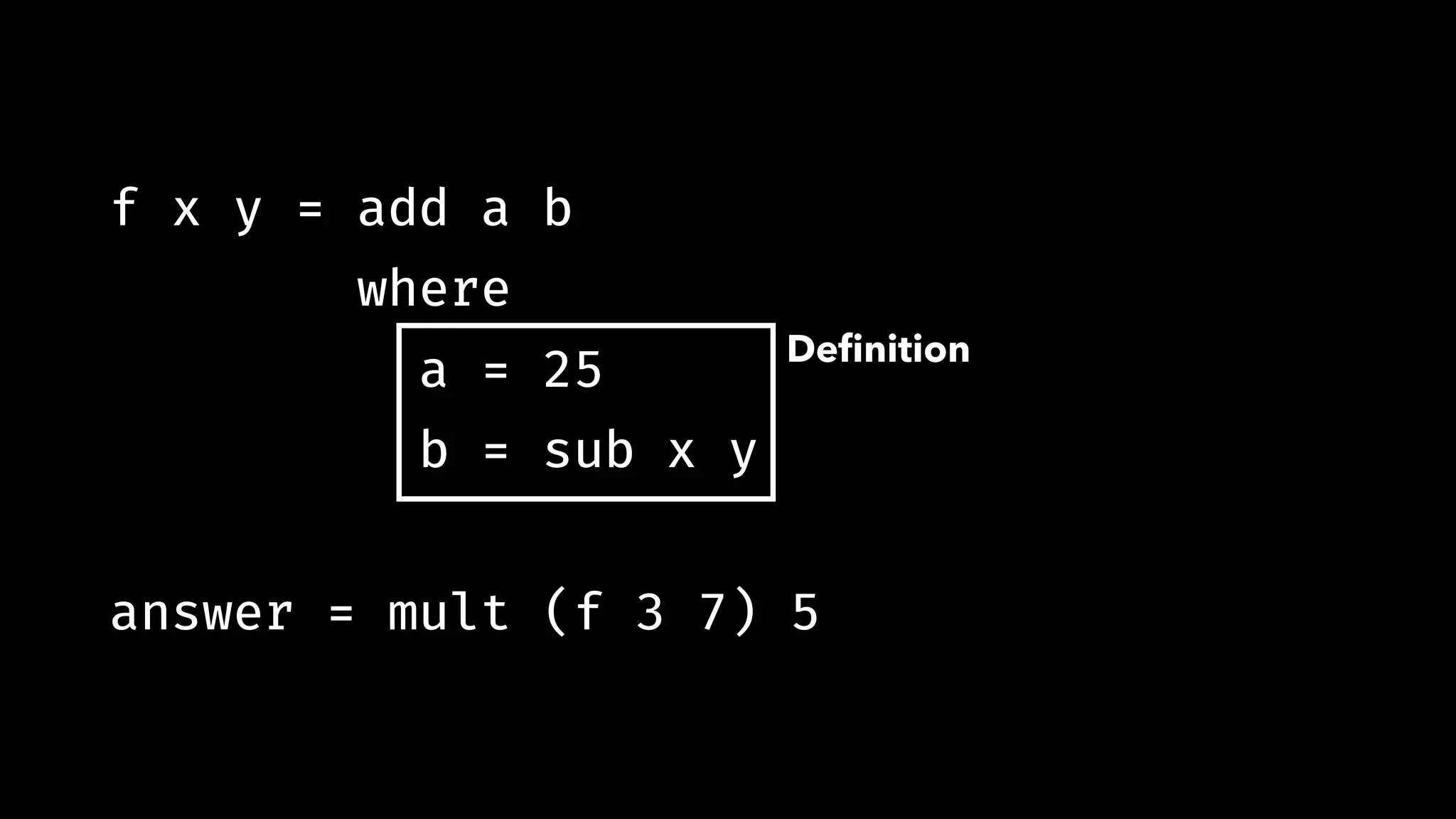
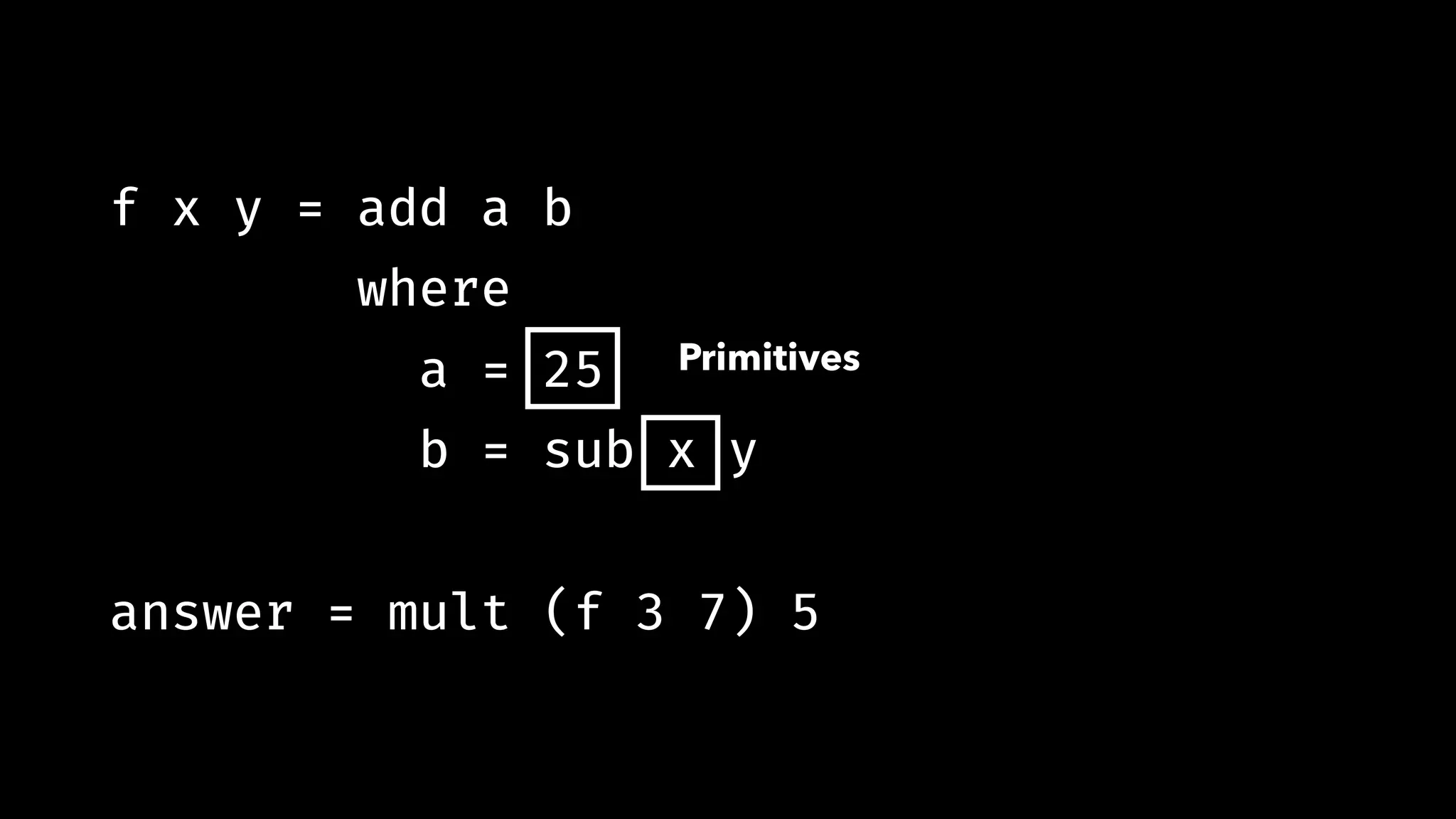
![data Script = Script [Def] data Def = Def Var [Var] Expn data Expn = Var Var | Num Double | Expn `Apply` Expn | Expn `Where` [Def] type Var = [Char]](https://image.slidesharecdn.com/combinatorparsing-180121101339/75/Combinator-parsing-178-2048.jpg)
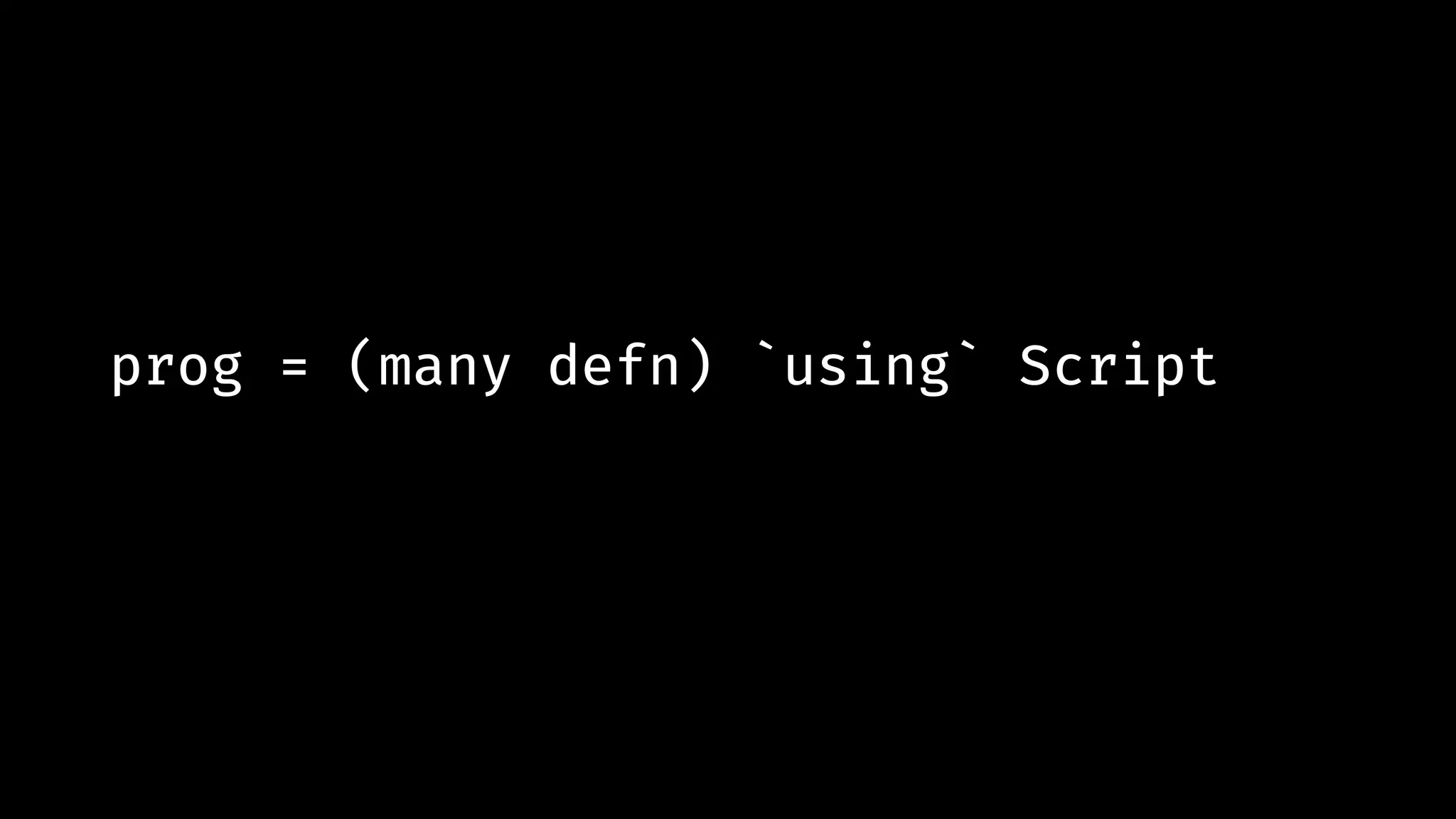
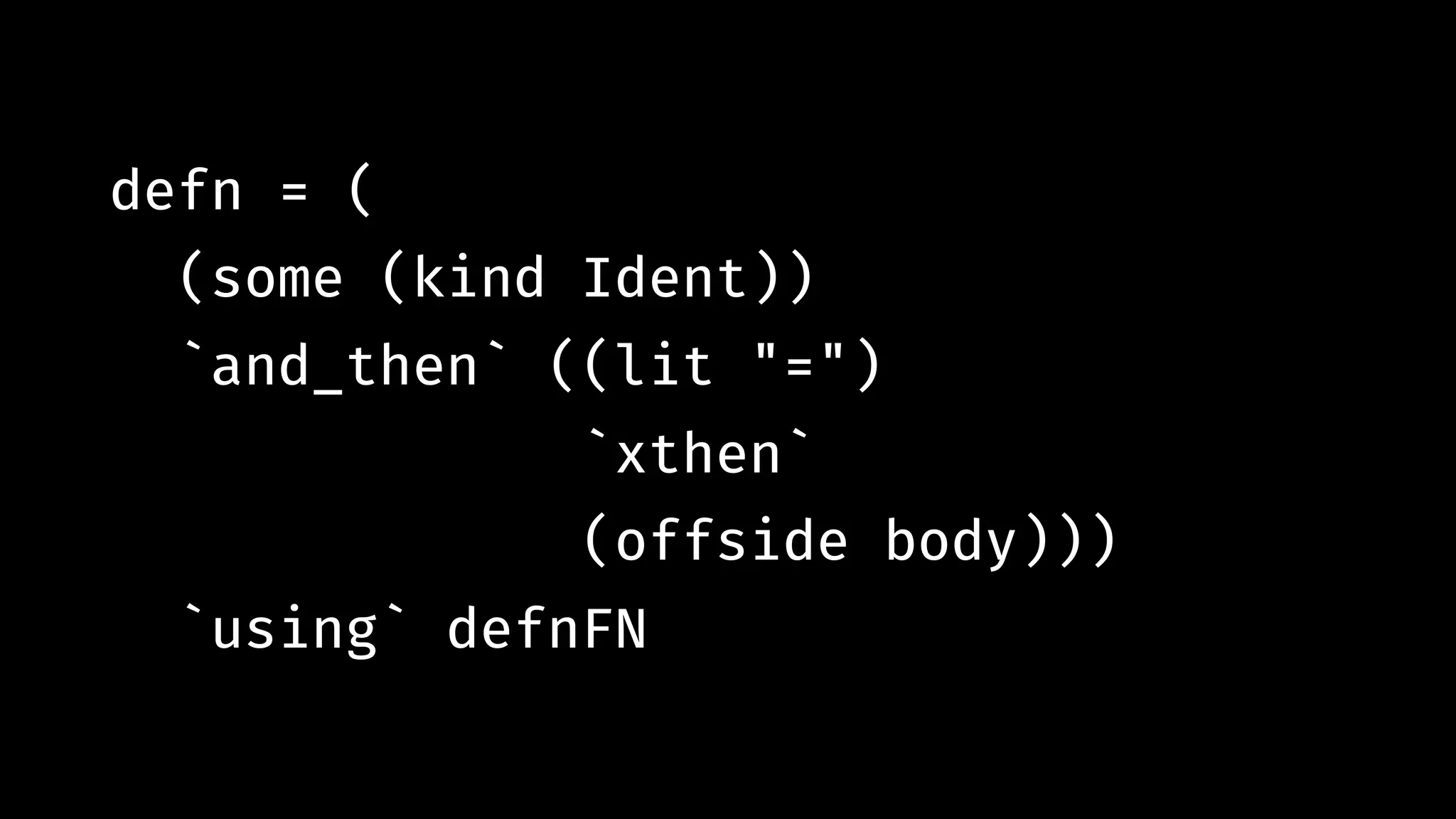
![body = ( expr `and_then` (((lit "where") `xthen` (some defn)) `opt` [])) `using` bodyFN](https://image.slidesharecdn.com/combinatorparsing-180121101339/75/Combinator-parsing-181-2048.jpg)
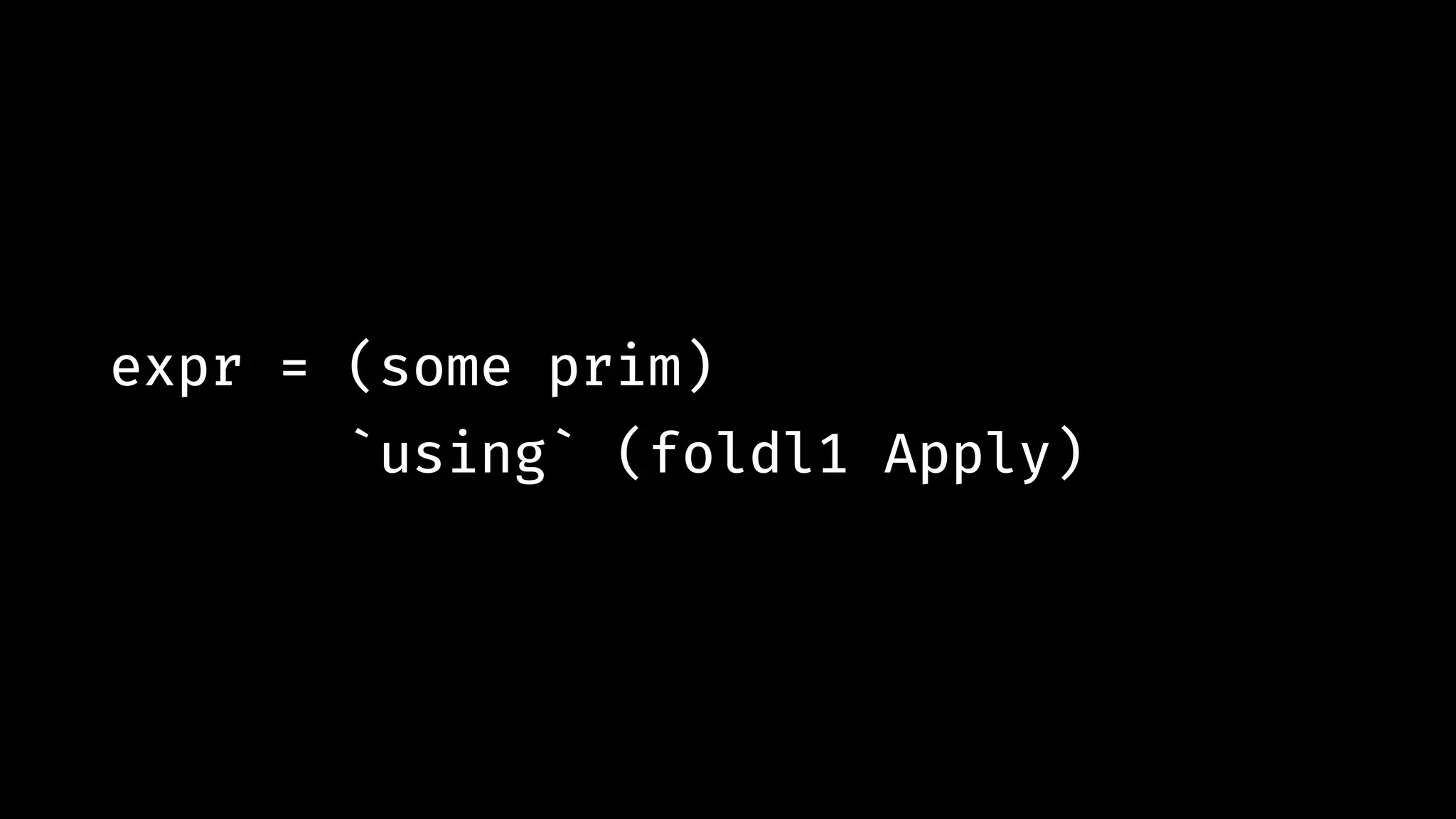
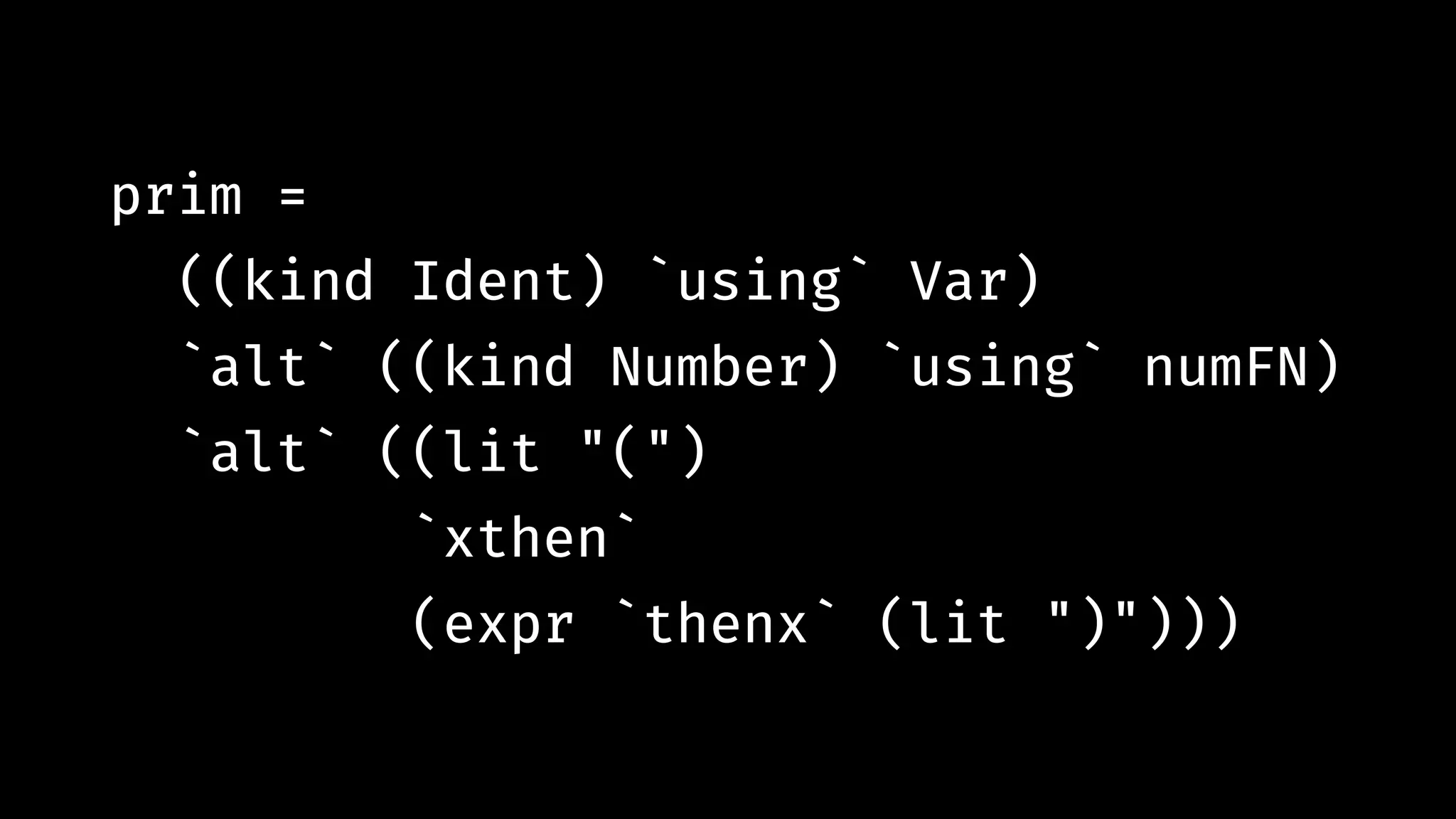
![!-- only allow a kind of tag kind !:: Tag !-> Parser (Pos Token) [Char] kind t = (satisfy ((!== t).fst)) `using` snd — only allow a given symbol lit !:: [Char] !-> Parser (Pos Token) [Char] lit xs = (literal (Symbol, xs)) `using` snd](https://image.slidesharecdn.com/combinatorparsing-180121101339/75/Combinator-parsing-184-2048.jpg)
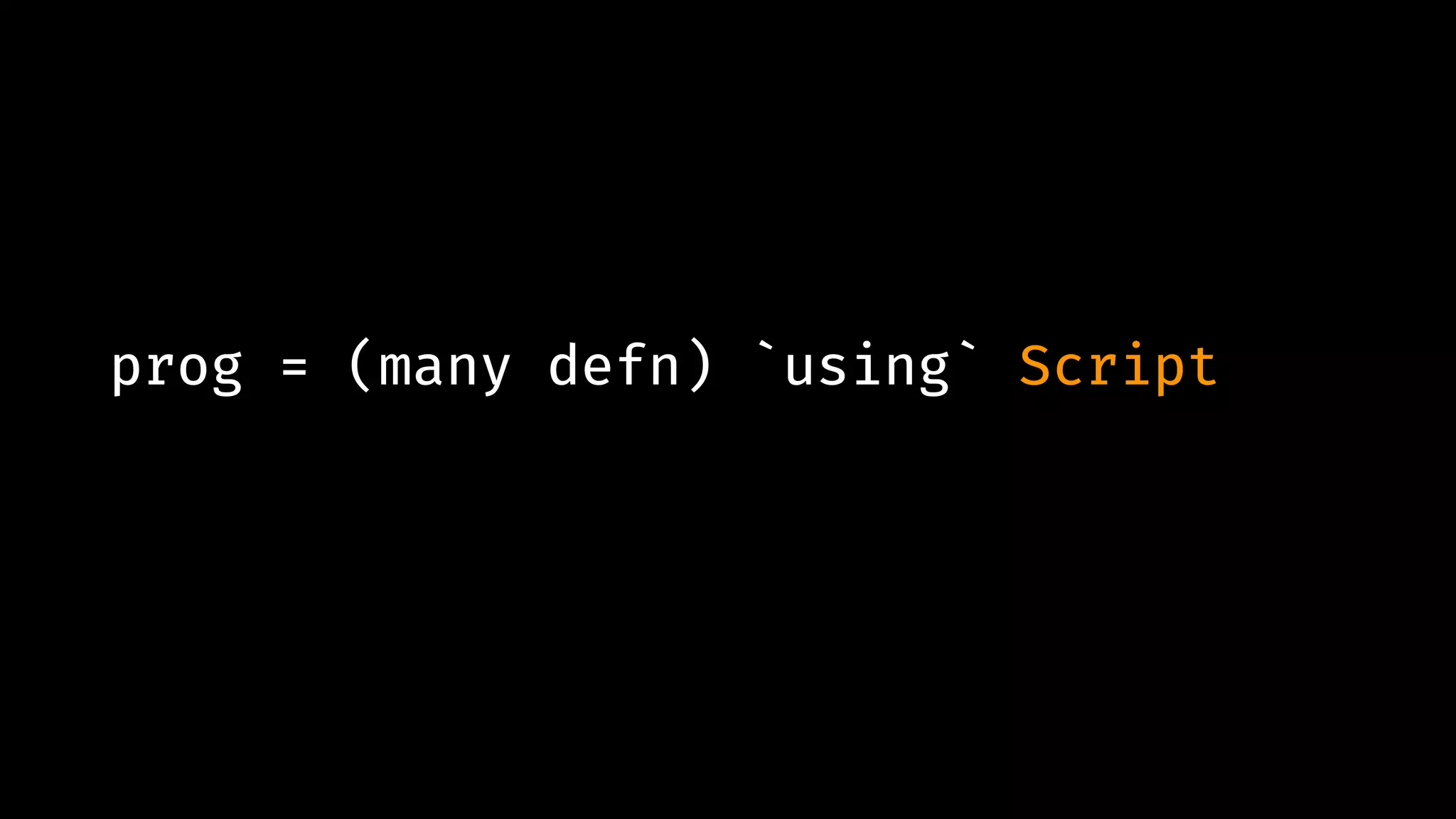
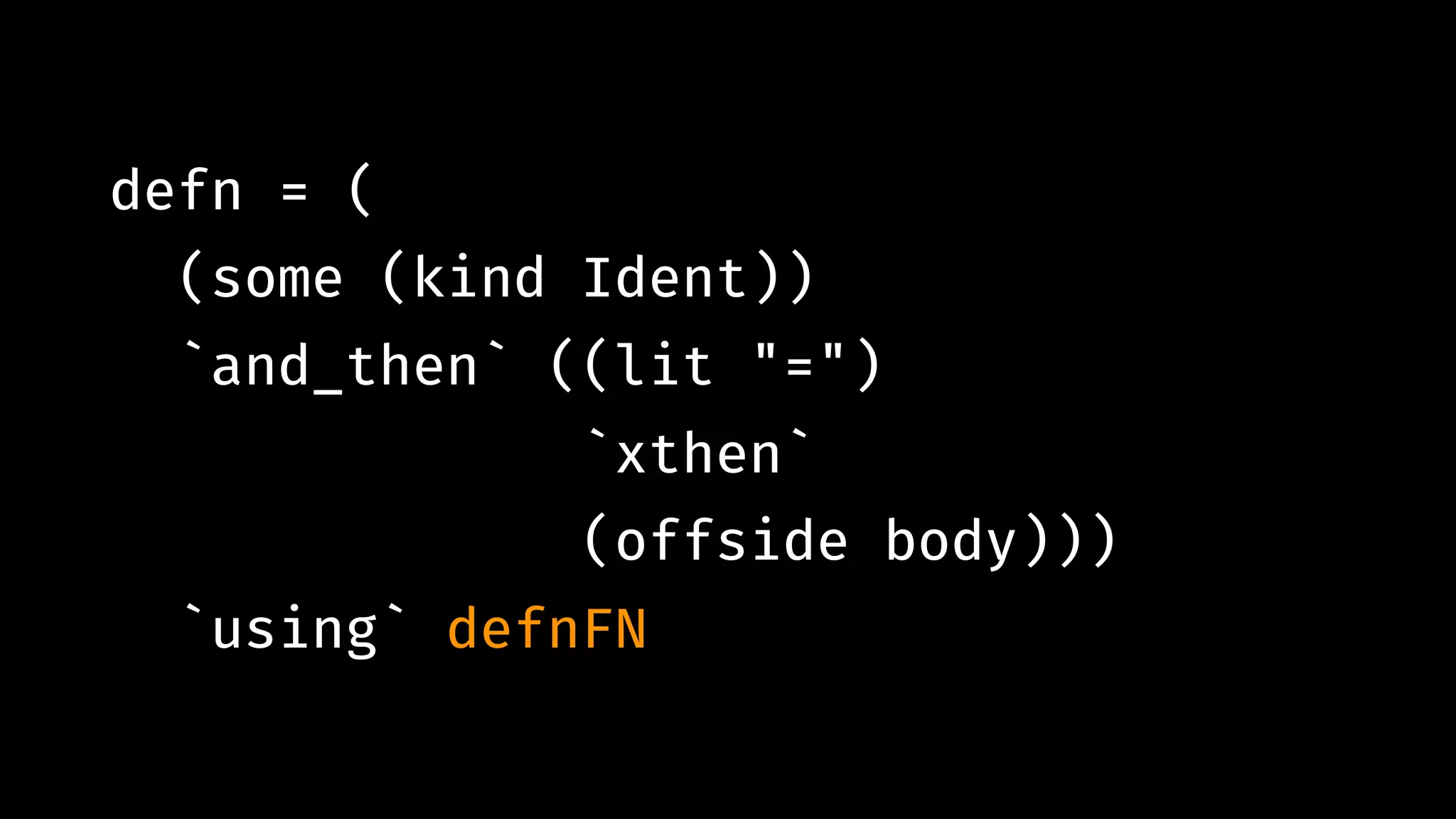
![body = ( expr `and_then` (((lit "where") `xthen` (some defn)) `opt` [])) `using` bodyFN](https://image.slidesharecdn.com/combinatorparsing-180121101339/75/Combinator-parsing-187-2048.jpg)
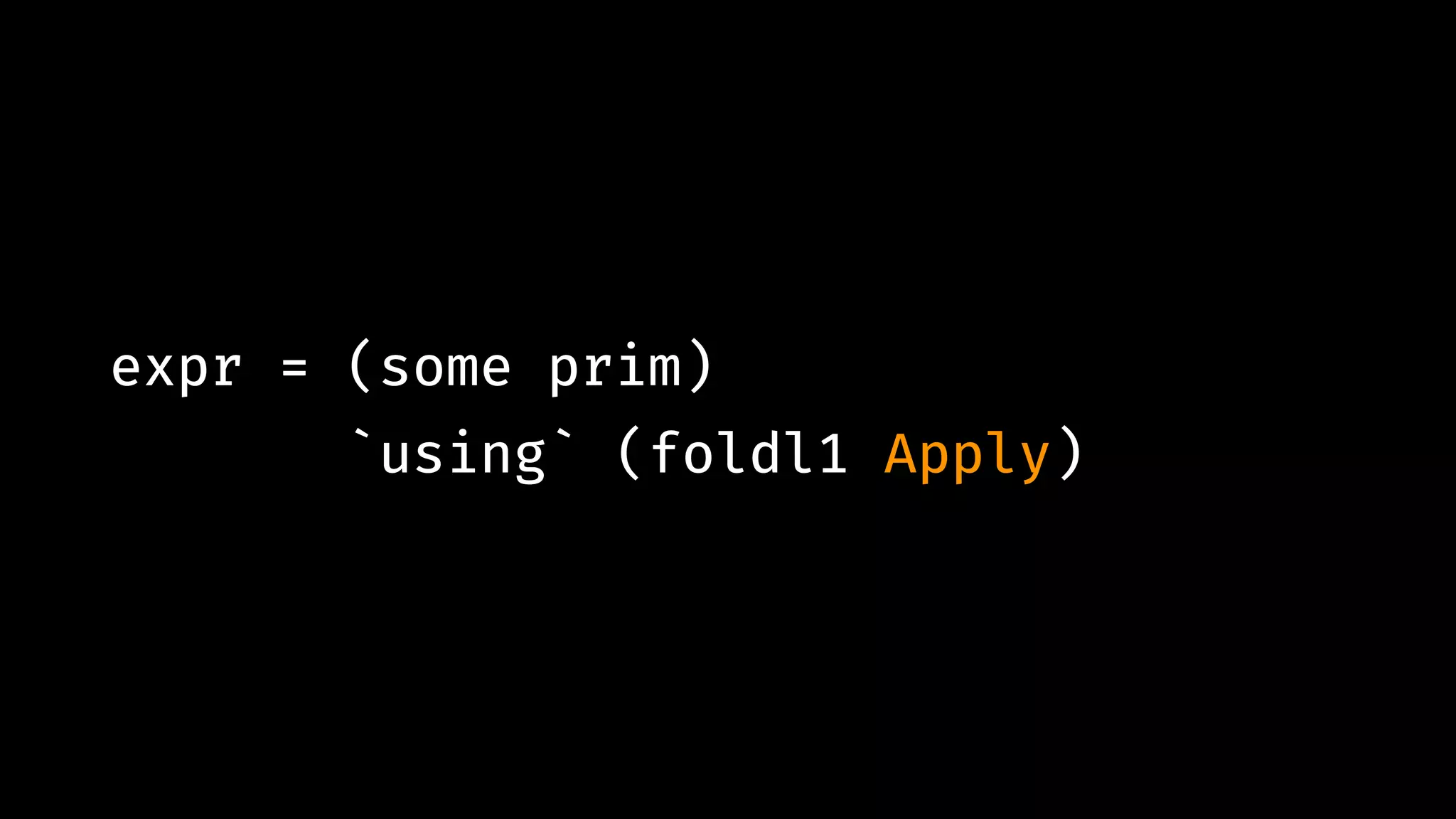
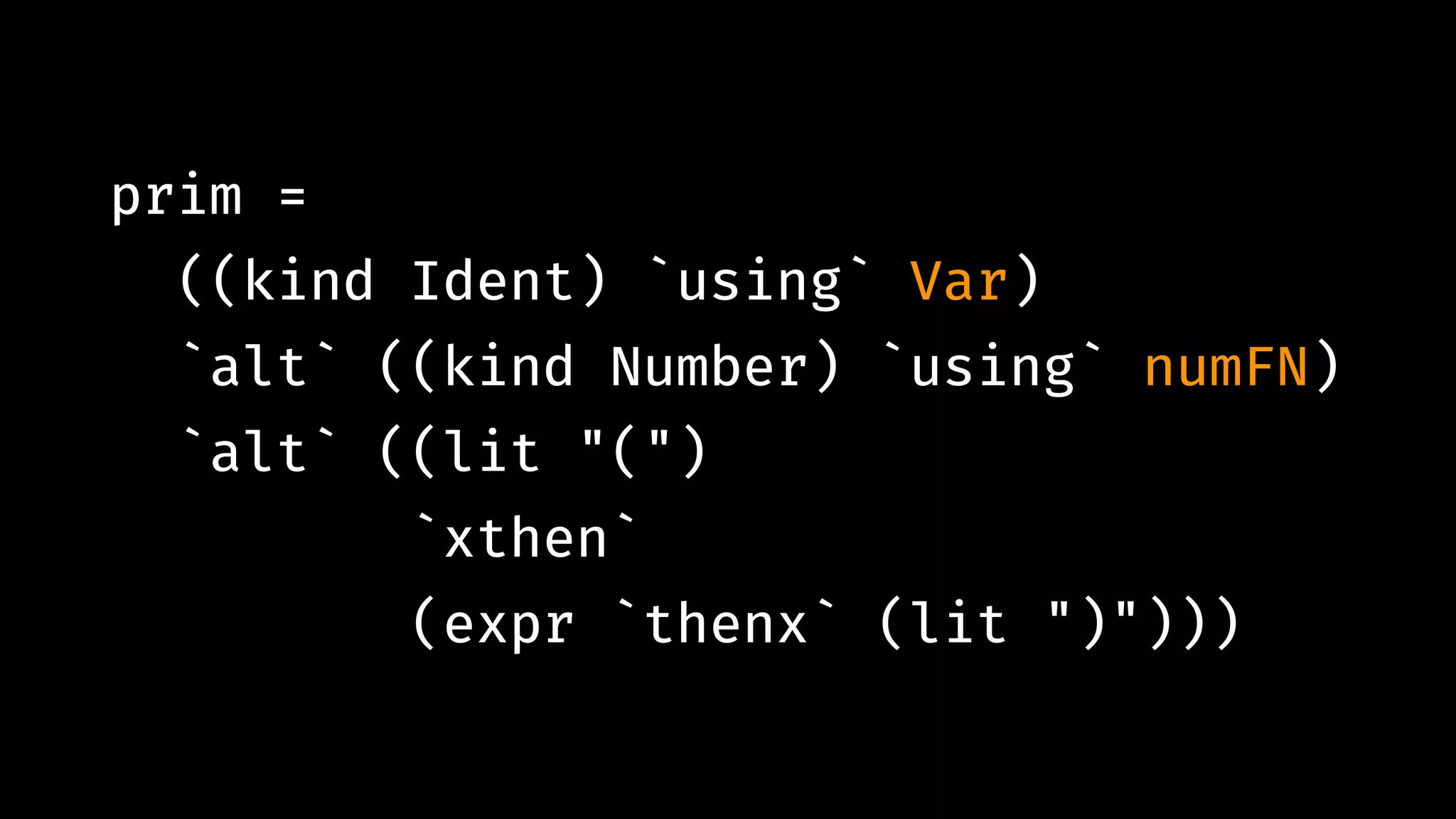
![data Script = Script [Def] data Def = Def Var [Var] Expn data Expn = Var Var | Num Double | Expn `Apply` Expn | Expn `Where` [Def] type Var = [Char]](https://image.slidesharecdn.com/combinatorparsing-180121101339/75/Combinator-parsing-190-2048.jpg)

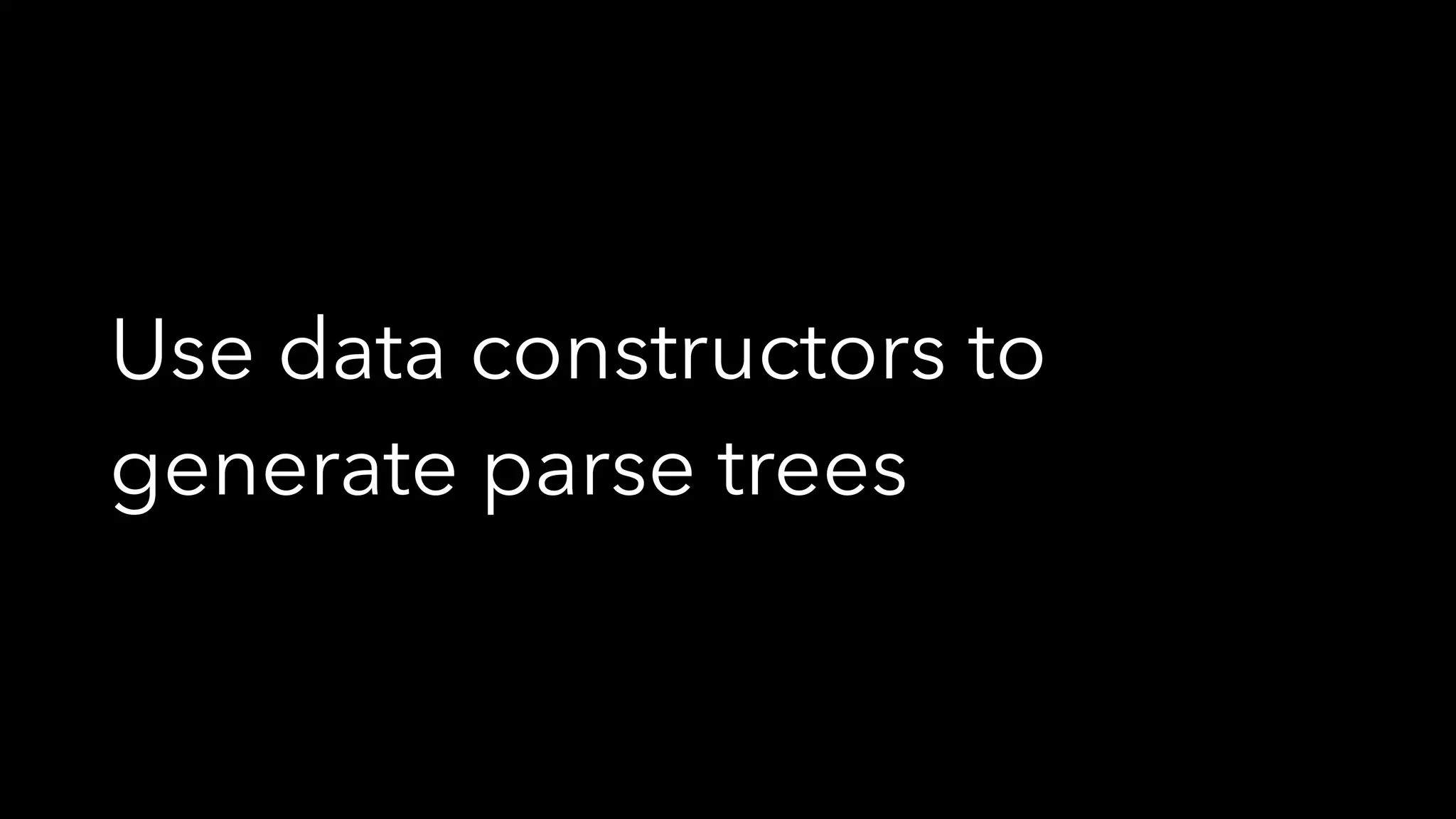
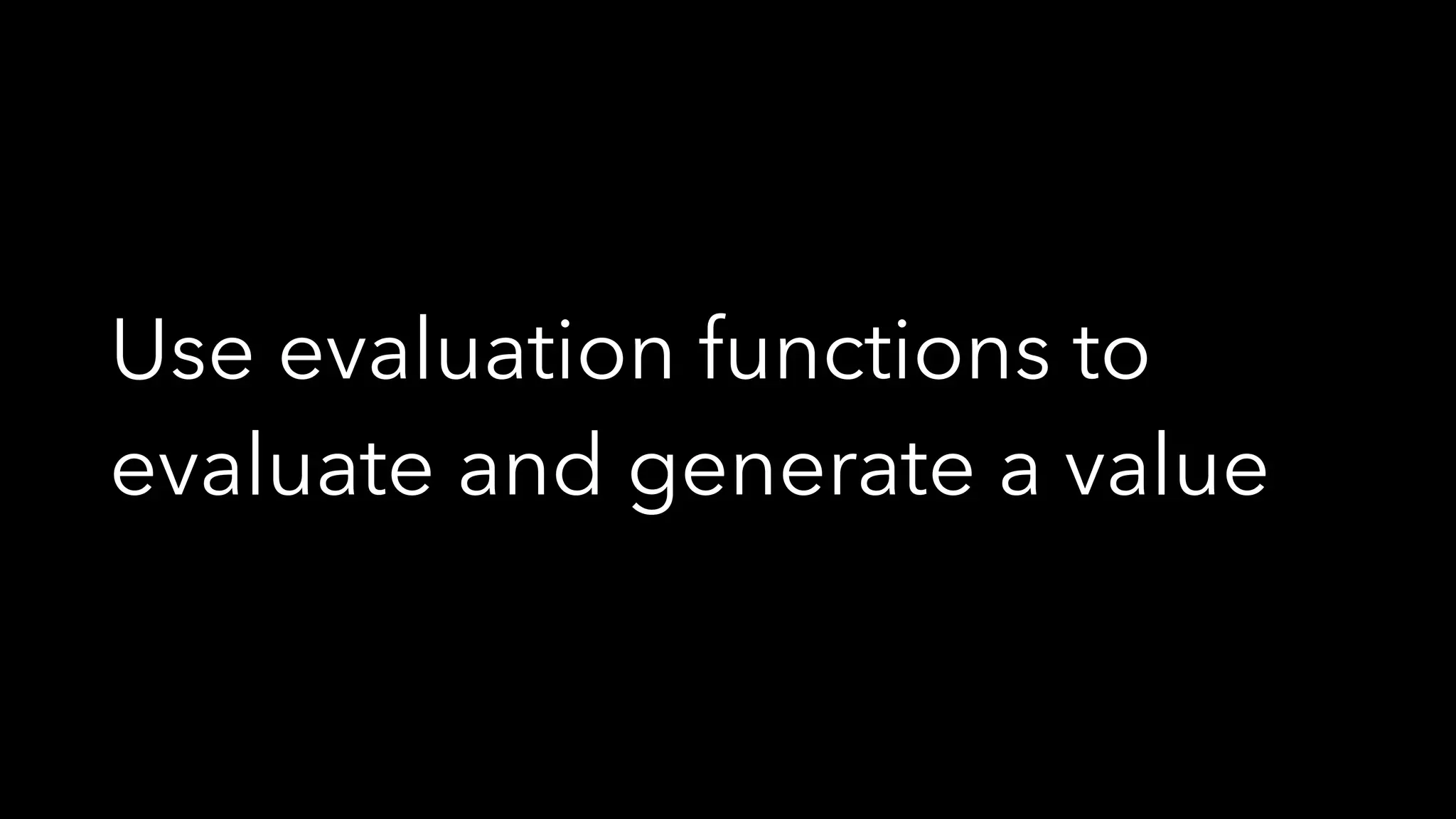
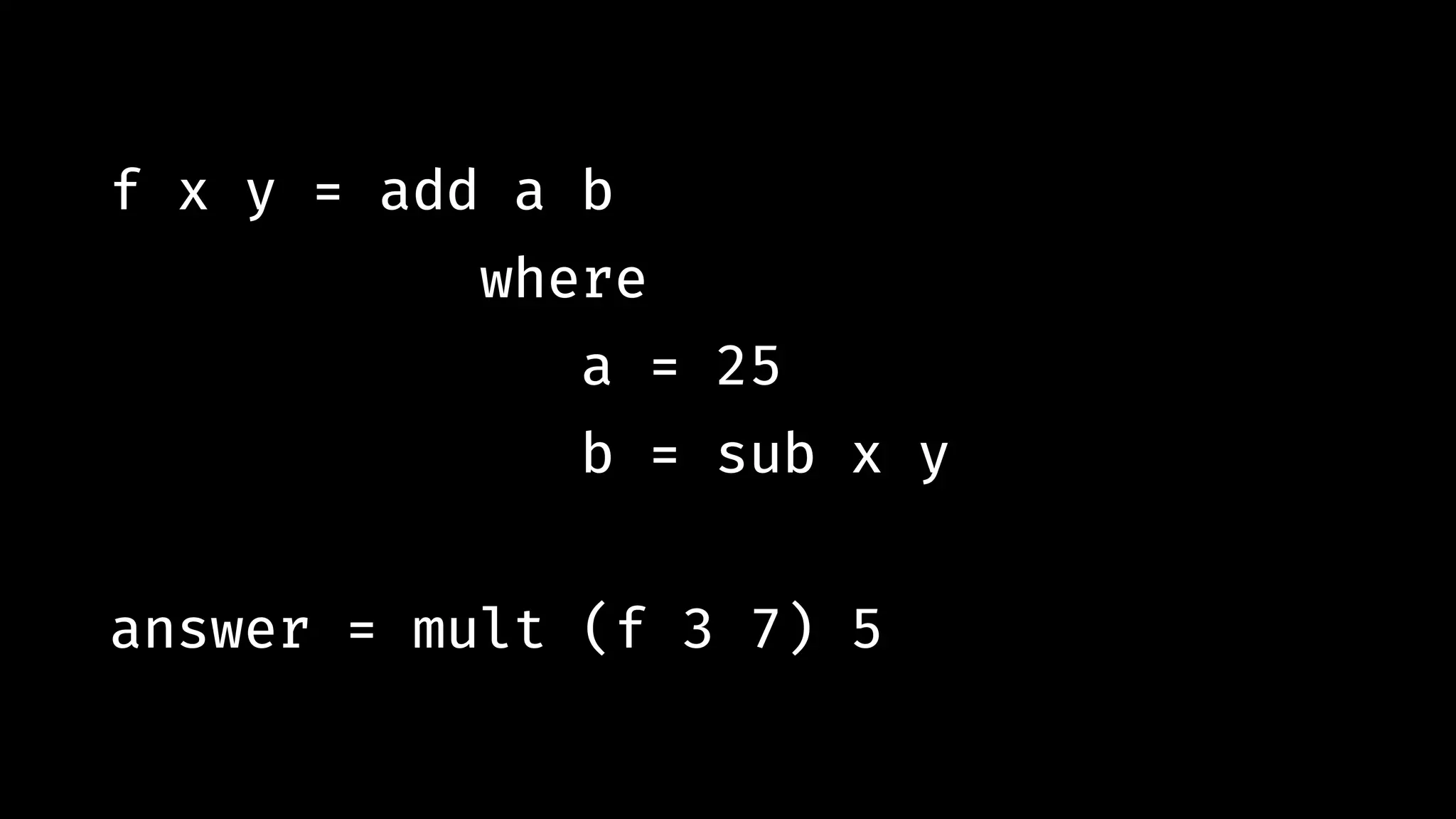
![Script [ Def "f" ["x","y"] ( ((Var "add" `Apply` Var "a") `Apply` Var "b") `Where` [ Def "a" [] (Num 25.0), Def "b" [] ((Var "sub" `Apply` Var "x") `Apply` Var "y")]), Def "answer" [] ( (Var "mult" `Apply` ( (Var "f" `Apply` Num 3.0) `Apply` Num 7.0)) `Apply` Num 5.0)]](https://image.slidesharecdn.com/combinatorparsing-180121101339/75/Combinator-parsing-195-2048.jpg)
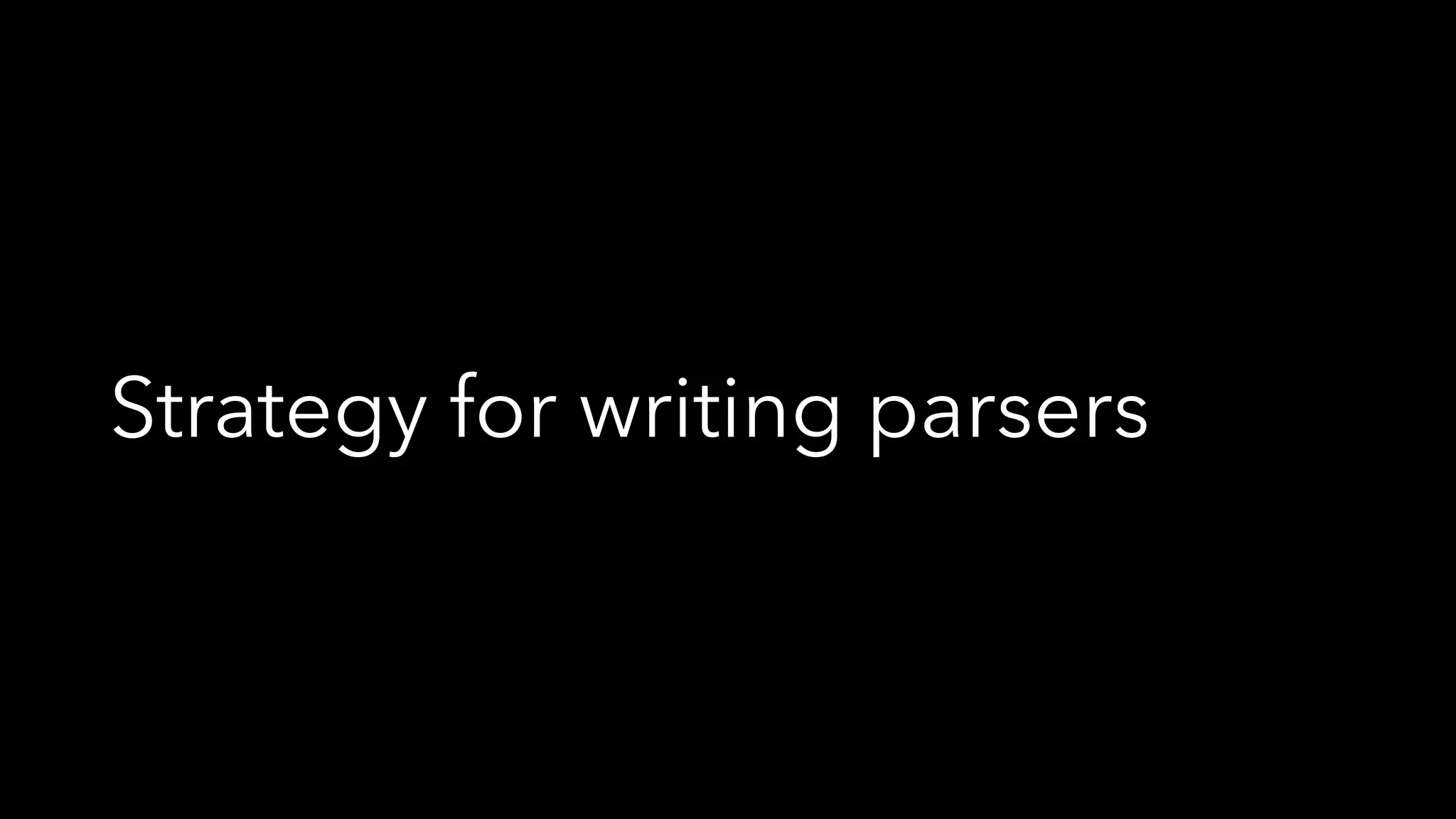
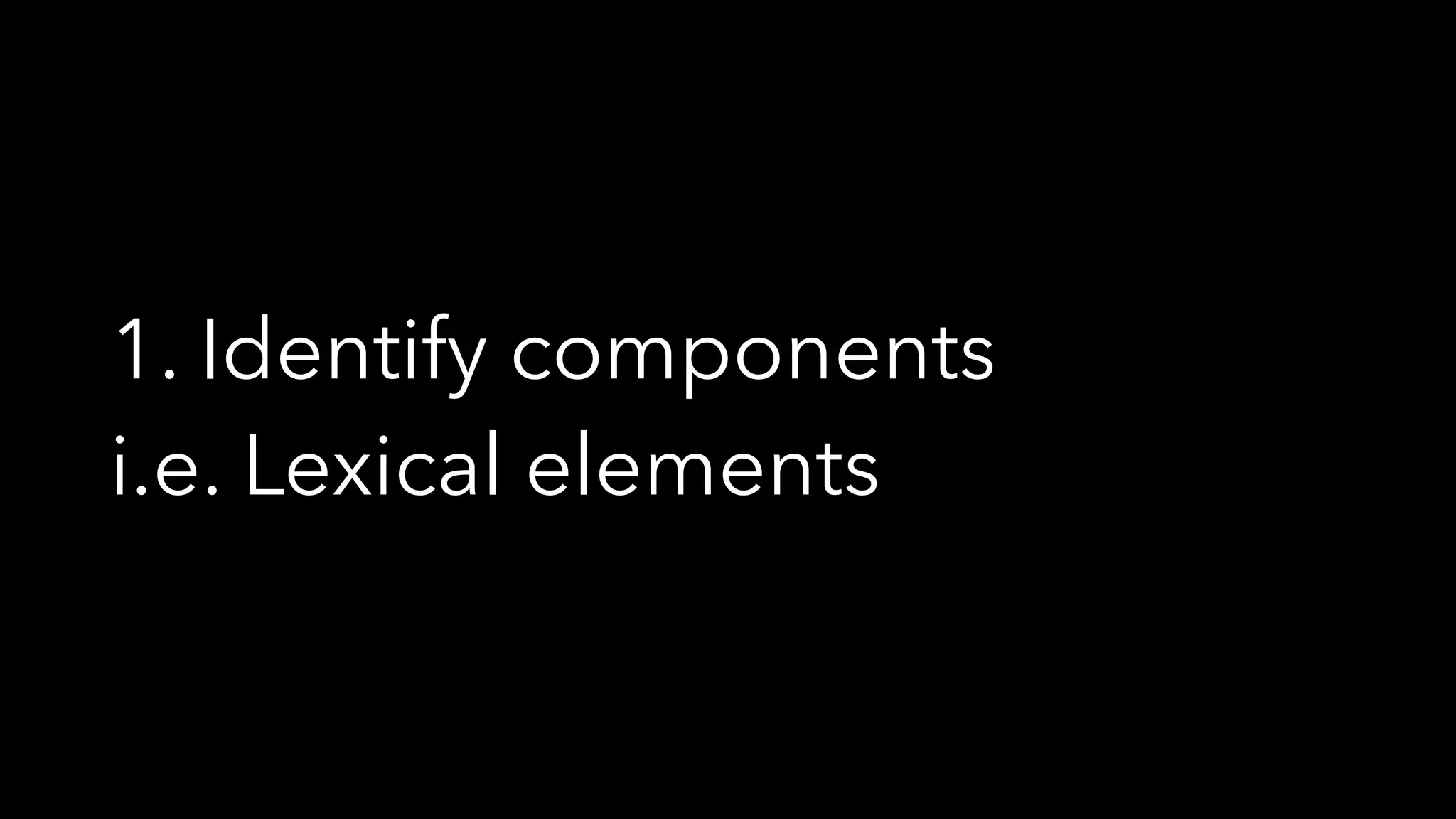
![lexer = lex [ ((some (any_of literal " nt")), Junk), ((string "where"), Symbol), (word, Ident), (number, Number), ((any_of string ["(", ")", "="]), Symbol)]](https://image.slidesharecdn.com/combinatorparsing-180121101339/75/Combinator-parsing-198-2048.jpg)
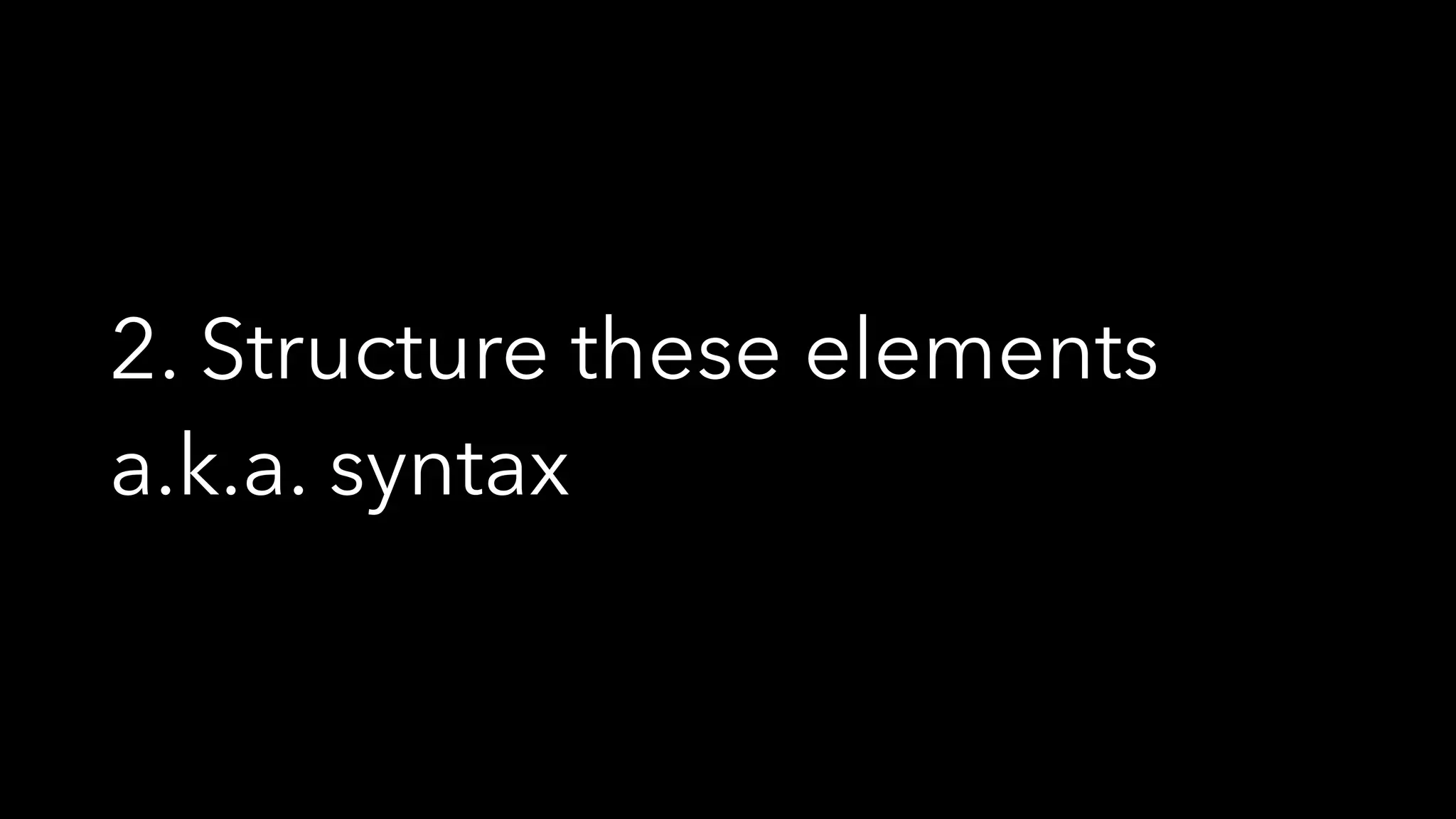
![defn = ((some (kind Ident)) `and_then` ((lit "=") `xthen` (offside body))) `using` defnFN body = (expr `and_then` (((lit "where") `xthen` (some defn)) `opt` [])) `using` bodyFN expr = (some prim) `using` (foldl1 Apply) prim = ((kind Ident) `using` Var) `alt` ((kind Number) `using` numFN) `alt` ((lit "(") `xthen` (expr `thenx` (lit ")")))](https://image.slidesharecdn.com/combinatorparsing-180121101339/75/Combinator-parsing-200-2048.jpg)
